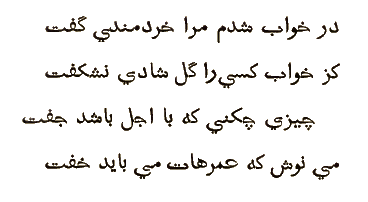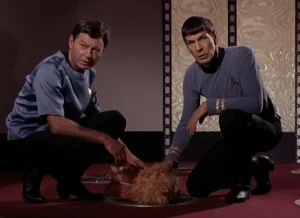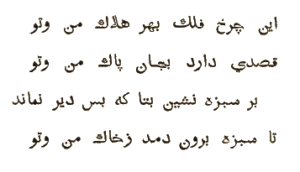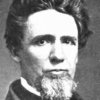OBLIVION, n. The state or condition in which the wicked cease from struggling and the dreary are at rest. Fame’s eternal dumping ground. Cold storage for high hopes. A place where ambitious authors meet their works without pride and their betters without envy. A dormitory without an alarm clock.
Ambrose Bierce (1842-1914?) American writer and journalist
“Oblivion,” The Devil’s Dictionary (1911)
(Source)
Originally published in the "Cynic's Word Book" column in the New York American (1904-09-27), and the "Cynic's Dictionary" column in the San Francisco Examiner (1903-10-28).
Quotations about:
death
Note not all quotations have been tagged, so Search may find additional quotes on this topic.
I don’t know what God is.
I don’t know what death is.But I believe they have between them
some fervent and necessary arrangement.
To sound off with a cheerful “give me liberty or give me death” sort of argument in the face of the unprecedented and inconceivable potential of destruction in nuclear warfare is not even hollow; it is downright ridiculous. Indeed it seems so obvious that it is a very different thing to risk one’s own life for the life and freedom of one’s country and one’s posterity from risking the very existence of the human species for the same purpose that it is difficult not to suspect the defenders of the “better dead than red” or “better death than slavery” slogans of bad faith.
Which of course is not to say the reverse, “better red than dead,” has any more to recommend itself; when an old truth ceases to be applicable, it does not become any truer by being stood on its head.
As a matter of fact, to the extent that the discussion of the war question today is conducted in these terms, it is easy to detect a mental reservation on both sides. Those who say “better dead than red” actually think: The losses may not be as great as some anticipate, our civilization will survive; while those who say “better red than dead” actually think: Slavery will not be so bad, man will not change his nature, freedom will not vanish from the earth forever. In other words, the bad faith of the discussants lies in that both dodge the preposterous alternative they themselves have proposed; they are not serious.Hannah Arendt (1906-1975) German-American philosopher, political theorist
On Revolution, Introduction (1963)
(Source)
And Sergeant Colon once again knew a secret about bravery. It was arguably a kind of enhanced cowardice — the knowledge that while death may await you if you advance it will be a picnic compared to the certain living hell that awaits should you retreat.
But if, in addition, you would like an unphilosophical rule which appeals to the heart, nothing will make you more cheerful in the face of death than to consider the things from which you are about to be parted, and the sort of characters with whom your soul will no longer be entangled.
[Εἰ δὲ καὶ ἰδιωτικὸν παράπηγμα ἁψικάρδιον θέλεις, μάλιστά σε εὔκολον πρὸς τὸν θάνατον ποιήσει ἡ ἐπίστασις ἡ ἐπὶ τὰ ὑποκείμενα, ὧν μέλλεις ἀφίστασθαι, καὶ μεθ̓ ἠθῶν οὐκέτι ἔσται ἡ … ἐμπεφυρμένη.]
Marcus Aurelius (AD 121-180) Roman emperor (161-180), Stoic philosopher
Meditations [To Himself; Τὰ εἰς ἑαυτόν], Book 9, ch. 3 (9.3) (AD 161-180) [tr. Hard (1997 ed.)]
(Source)
Hard gives the same translation in their 2011 edition.(Source (Greek)). Alternate translations:But thou desirest a more popular, and though not so direct and philosophical, yet a very powerful and penetrative recipe against the fear of death, nothing can make they more willing to part with thy life, than if thou shalt consider, both what the subjects themselves are that thou shalt part with, and what manner of disposition thou shalt no more have to do with.
[tr. Casaubon (1634)]But if you stand in need of a Vulgar Remedy, and want a Cordial to make Dying go down the better, you shall have it. Consider then what sort of World, and what sort of Humours, you will be Rid of!
[tr. Collier (1701)]If you want also a popular support, here is one which goes to the heart: you will be extremely easy with regard to death, if you consider the objects you are going to leave; and the manners of that confused croud from which you are to be disengaged.
[tr. Hutcheson/Moor (1742)]But (if you would have a popular remedy, yet what may prove a cordial, against the fear of death) it will greatly contribute to this end, if you consider what sort of world you are to leave, and with what sort of characters you will no longer be conversant.
[tr. Graves (1792)]But if thou requirest also a vulgar kind of comfort which shall reach thy heart, thou wilt be made best reconciled to death by observing the objects from which thou art going to be removed, and the morals of those with whom thy soul will no longer be mingled.
[tr. Long (1862)]But if you stand in need of a vulgar remedy to soothe the mind, consider, then, what sort of world and what sort of customs you will be rid of!
[tr. Collier/Zimmern (1887)]If your heart asks for some simple and effective reassurance, the best solace against death is correct appreciation of the material things from which you are to part, and of the moral natures with which your soul will then cease to intermingle.
[tr. Rendall (1898)]If you wish for the common sort of comfort, here is a thought which goes to the heart. You will be completely resigned to death if you consider the things you are about to leave, and the morals of that confused crowd from which your soul is to be disengaged.
[tr. Hutcheson/Chrystal (1902)]But if thou desirest a commonplace solace too that will appeal to the heart, nothing will enable thee to meet death with equanimity better than to observe the environment thou art leaving and the sort of characters with whom thy soul shall no longer be mixed up.
[tr. Haines (Loeb) (1916)]And if you would have an everyday rule to touch your heart, it will make you most contented with death to dwell upon the objects from which you are about to be parted and the kind of characters with whom your soul will be no longer contaminated.
[tr. Farquharson (1944)]But if your heart would have comfort of a simpler sort, then there is no better solace in the face of death than to think on the nature of the surroundings you are leaving, and the characters you will no longer have to mix with.
[tr. Staniforth (1964)]Or perhaps you need some tidy aphorism to tuck away in the back of your mind. Well, consider two things that should reconcile you to death: the nature of the things you’ll leave behind you, and the kind of people you’ll no longer be mixed up with.
[tr. Hays (2003)]If you want another criterion — unscientific but emotionally effective — you will find it quite easy to face death if you stop to consider the business you will be leaving and the sort of characters which will no longer contaminate your soul.
[tr. Hammond (2006)]If you want a private passage at hand to soothe your heart, the knowledge of the world around you will give you some solace at death, the world you leave and the kind of people your soul will no longer be associated with.
[tr. @sentantiq (2017)]If a person waiting for death should require some vulgar comfort, they can be more reconciled to death by remembering the evils from which they will be removed, and the morals of those they will no longer have to live with.
[tr. McNeill (2019)]
KING HENRY: Though I did wish him dead,
I hate the murderer, love him murderèd.William Shakespeare (1564-1616) English dramatist and poet
Richard II, Act 5, sc. 6, l. 39ff (5.6.39-40) (1595)
(Source)
Some pirates achieved immortality by great deeds of cruelty or derring-do. Some achieved immortality by amassing great wealth. But the captain had long ago decided that he would, on the whole, prefer to achieve immortality by not dying.
Death devours all lovely things.
Lesbia with her sparrow
Shares the darkness. Presently
Every bed is narrow.Edna St. Vincent Millay (1892-1950) American poet
Poem (1921-03), “Passer Mortuus est,” st. 1, The Century Magazine, Vol. 101/79, No. 5
A reference to (and, in the title, quote from) Catullus' poem about the death of his beloved Lesbia's beloved sparrow (1, 2).
Collected in Second April (1921), with slightly different punctuation.Death devours all lovely things;
Lesbia with her sparrow
Shares the darkness, -- presently
Every bed is narrow.
It is this latter punctuation that is generally used in later printings.
Upon my going into the church, I entertained myself with the digging of a grave; and saw in every shovelful of it that was thrown up, the fragment of a bone or skull intermixt with a kind of fresh mouldering earth, that some time or other had a place in the composition of a human body. Upon this, I began to consider with myself what innumerable multitudes of people lay confused together under the pavement of that ancient cathedral; how men and women, friends and enemies, priests and soldiers, monks and prebendaries, were crumbled amongst one another, and blended together in the same common mass; how beauty, strength, and youth, with old age, weakness and deformity, lay undistinguished in the same promiscuous heap of matter.
Joseph Addison (1672-1719) English essayist, poet, statesman
Essay (1711-03-30), “Thoughts in Westminster Abbey,” The Spectator, No. 26
(Source)
The fanatics have another name for fetuses. They call them the pre-born. Now we’re getting creative. If you accept pre-born, I think you would have to say that, at the moment of birth, we go instantly from being pre-born to being pre-dead. Makes sense, doesn’t it? Technically, we’re all pre-dead.
George Carlin (1937-2008) American comedian
Book (2004), When Will Jesus Bring the Pork Chops?, “Euphemisms: Political-Interest Groups,” “A Bunny in the Oven?”
(Source)
(Source (Audiobook); dialogue verified)
KING RICHARD: For within the hollow crown
That rounds the mortal temples of a king
Keeps Death his court, and there the antic sits,
Scoffing his state and grinning at his pomp,
Allowing him a breath, a little scene,
To monarchize, be feared, and kill with looks,
Infusing him with self and vain conceit,
As if this flesh which walls about our life
Were brass impregnable; and humored thus,
Comes at the last and with a little pin
Bores through his castle wall, and farewell, king!William Shakespeare (1564-1616) English dramatist and poet
Richard II, Act 3, sc. 2, l. 165ff (3.2.165-175) (1595)
(Source)
If it were enough, to repent the last Day of thy Life; yet how canst thou be sure to do that; unless thou doest it this very Day? Since this Day may be (for ought thou knowest) thy last.
Thomas Fuller (1654-1734) English physician, preacher, aphorist, writer
Introductio ad Prudentiam, Vol. 2, # 2305 (1727)
(Source)
I yesterday passed a whole afternoon in the churchyard, the cloisters, and the church, amusing myself with the tombstones and inscriptions that I met with in those several regions of the dead. Most of them recorded nothing else of the buried person, but that he was born upon one day, and died upon another: the whole history of his life being comprehended in those two circumstances, that are common to all mankind. I could not but look upon these registers of existence, whether of brass or marble, as a kind of satire upon the departed persons; who had left no other memorial of them, but that they were born and that they died. They put me in mind of several persons mentioned in the battles of heroic poems, who have sounding names given them, for no other reason but that they may be killed, and are celebrated for nothing but being knocked on the head.
Joseph Addison (1672-1719) English essayist, poet, statesman
Essay (1711-03-30), “Thoughts in Westminster Abbey,” The Spectator, No. 26
(Source)
KING RICHARD: For God’s sake, let us sit upon the ground
And tell sad stories of the death of kings —
How some have been deposed, some slain in war,
Some haunted by the ghosts they have deposed,
Some poisoned by their wives, some sleeping killed,
All murdered.William Shakespeare (1564-1616) English dramatist and poet
Richard II, Act 3, sc. 2, l. 160ff (3.2.160-165) (1595)
(Source)
The old ladies sitting on the side porch waved and called out to him, and he waved back at them. They sat like a bunch of ancient crows on a branch. Time was shooting them down, one by one.
I shall die, but that is all that I shall do for Death; I am not on his pay-roll.
Edna St. Vincent Millay (1892-1950) American poet
Poem (1934), “Conscientious Objector,” l. 8, Wine from These Grapes, sec. 4
(Source)
And if now (but may the immortal gods avert the omen!) that worst of fates shall befall the republic, then, as brave gladiators take care to perish with honor, let us too, who are the chief men of all countries and nations, take care to fall with dignity rather than to live as slaves with ignominy.
[Quodsi iam, quod di omen avertant! fatum extremum rei publicae venit, quod gladiatores nobiles faciunt, ut honeste decumbant, faciamus nos principes orbis terrarum gentiumque omnium, ut cum dignitate potius cadamus quam cum ignominia serviamus.]
Marcus Tullius Cicero (106-43 BC) Roman orator, statesman, philosopher
Philippics [Philippicae; Antonian Orations], No. 3, ch. 14 / sec. 35 (2.14/3.35.3) (44-12-20 BC) [tr. Yonge (1903)]
(Source)
(Source (Latin)). Other translations:But if already -- may the Gods avert the omen! -- the State has been brought to its latest pass, let us, the leaders of the world and of all nations, do what stout gladiators do to die with honour, let us fall with dignity rather than serve with ignominy. [tr. Ker (Loeb) (1926)]If -- may the Gods avert the omen! -- the final episode in the history of the Res publica has arrived, let us behave like champion gladiators: they meet death honorably; let us, who stand foremost in the world and all nations, see to it that we fall with dignity rather than serve with ignominy.
[tr. Manuwald (2007)]But if, may the Gods avert the omen, final fate has come to the State, let us, leaders of the world and all nations, do what noble gladiators do to die with dignity: let us fall on our sword rather than serve with ignominy.
[tr. Wiseman]
What has died does not fall out of the universe; and if it remains here, it is also transformed here and resolved into its constituent parts, which are the elements of the universe and of yourself. And these elements themselves are transformed and utter no complaint.
[Ἔξω τοῦ κόσμου τὸ ἀποθανὸν οὐ πίπτει. εἰ ὧδε μένει καὶ μεταβάλλει ὧδε καὶ διαλύεται εἰς τὰ ἴδια, ἃ στοιχεῖά ἐστι τοῦ κόσμου καὶ σά. καὶ αὐτὰ δὲ μεταβάλλει καὶ οὐ γογγύζει.]
Marcus Aurelius (AD 121-180) Roman emperor (161-180), Stoic philosopher
Meditations [To Himself; Τὰ εἰς ἑαυτόν], Book 8, ch. 18 (8.18) (AD 161-180) [tr. Hard (1997 ed.)]
(Source)
(Source (Greek)). Alternate translations:Whatsoever dieth and falleth, however and wheresoever it die and fall, it cannot fall out of the world. here it have its abode and change, here also shall it have its dissolution into its proper elements. The same are the world's elements, and the elements of which thou dost consist. And they when they are changed, they murmur not; why shouldest thou?
[tr. Casaubon (1634), 8.16]Whatever drops out of Life, is catch't up somewhere, for the World loses nothing. Within this Circumference of Corporeity, all things have their several Formes, and Revolutions ; And here 'tis likewise that they return into Element, and first Principle ; Under which Notion those of the World and your own, are the very same; And all these last Changes are made without the least Repining : And why then should the same Matter that lyes quiet in an Element, Grumble in a Man?
[tr. Collier (1701)]What dies is not gone out of the verge of the universe. If that which is dissolved stays here, and is changed, it returns to those elements, of which the world and you too consist. These too are changed, and don’t murmur at it.
[tr. Hutcheson/Moor (1742)]Nothing that dies, is lost to the universe, or annihilated. But, if it remains here, it undergoes some change, and is resolved into its proper elements. Now the same elements which compose the rest of the world make a part of your person; yet those undergo many changes, and do not murmur or repine.
[tr. Graves (1792)]That which has died falls not out of the universe. If it stays here, it also changes here, and is dissolved into its proper parts, which are elements of the universe and of thyself. And these too change, and they murmur not.
[tr. Long (1862)]Whatever drops out of life is somewhere, for the world loses nothing. If it stays here, it also changes here, and is dissolved into its proper parts, which are elements of the universe and of yourself. And these two change and do not complain.
[tr. Collier/Zimmern (1887)]That which dies does not drop out of the universe. Here it bides, and here too it changes and is dispersed into its elements, the rudiments of the universe and of yourself. And they too change, and murmur not.
[tr. Rendall (1898)]That which dies falls not out of the Universe. If then it stays here, here too it suffers a change, and is resolved into those elements of which the world, and you too, consist. These also are changed, and murmur not.
[tr. Hutcheson/Chrystal (1902)]That which dies is not cast out of the Universe. As it remains here, it also suffers change here and is dissolved into its own constituents, which are the elements of the Universe and thy own. Yes, and they too suffer change and murmur not.
[tr. Haines (Loeb) (1916)]What dies does not fall outside the Universe. If it remains here and changes here, it is also resolved here into the eternal constituents, which are elements of the Universe and of yourself. And the elements themselves change and make no grievance of it.
[tr. Farquharson (1944)]That which dies does not drop out of the world. Here it remains; and here too, therefore, it changes and is resolved into its several particles; that is, into the elements which go to form the universe and yourself. They themselves likewise undergo change, and yet from them comes no complaint.
[tr. Staniforth (1964)]What dies doesn’t vanish. It stays here in the world, transformed, dissolved, as parts of the world, and of you. Which are transformed in turn -- without grumbling.
[tr. Hays (2003)]What dies does not pass out of the universe. If it remains here and is changed, then here too it is resolved into the everlasting constituents, which are the elements of the universe and of you yourself. These too change, and make no complaint of it.
[tr. Hammond (2006)]What has died does not fall out of the universe; and if it remains here, it is also transformed here and resolved into its own constituents, which are the elements of the universe and of yourself. And these elements themselves are transformed and utter no complaint.
[tr. Hard (2011 ed.)]
CHORUS: Why have the sons of Priam
Received each his portion in chambers of quiet earth,
When reasonable words could have solved the quarrel for Helen?
Now they live deep in the lap of Death;
And flames leaping like Zeus’s thunderbolt
Have levelled their walls with dust.[ΧΟΡΟΣ: ᾇ Πριαμίδος γᾶς ἔλαχον θαλάμους,
ἐξὸν διορθῶσαι λόγοις
1160σὰν ἔριν, ὦ Ἑλένα.
νῦν δ᾽ οἳ μὲν Ἅιδᾳ μέλονται κάτω,
τείχεα δὲ φλογμὸς ὥστε Διός ἐπέσυτο φλόξ,
ἐπὶ δὲ πάθεα πάθεσι φέρεις
† ἀθλίοις συμφοραῖς αἰλίνοις.]Euripides (485?-406? BC) Greek tragic dramatist
Helen [Ἑλένη], l. 1158ff, Stasimon 1, Antistrophe 2 (412 BC) [tr. Vellacott (1954), Strophe 2]
(Source)
(Source (Greek)). Other translations:Outrageous to destroy
The spear hath desolation spread,
With slaughter stain'd the widow'd bed,
And desolated Troy.
Yet well might Reason's suasive charms
Have made each warring foe a friend:
But many in the shock of arms
To Pluto's dreary realms descend;
Fires, like the flames of Jove, the walls surround,
And Ilium's ramparts smoke upon the ground.
[tr. Potter (1783), Antistrophe 2]Hence from her home departs each Phrygian wife,
O Helen, when the cruel strife
Which from thy chamors arose,
One conference might have closed: now myriads dwell
With Pluto in the shades of Hell,
And flames, as when Jove's vengeance throws
The bolt, have caught her towers and finished Ilion's woes.
[tr. Wodhull (1809)]Which left the dwellings of the land of Priam, when it was in their power to decide by words the strife concerning thee, O Helen. But now they indeed are the care of Hades below, and fire, like the lightning of Jove, has fallen on their walls.
[tr. Buckley (1850)]By it [strife] they won as their lot bed-chambers of Priam's earth, when they could have set right by discussion the strife over you, O Helen. And now they are below in Hades' keeping, and fire has darted onto the walls like the bolt of Zeus.
[tr. Coleridge (1891)]The maidens of the land of Priam left their bridal bowers, though arbitration might have put thy quarrel right, O Helen. And now Troy's sons are in Hades' keeping in the world below, and fire hath darted on her walls, as darts the flame of Zeus.
[tr. Coleridge (alt.)]Lo, how its storm o'er homes of Ilium brake,
Yea, though fair words might once have wrought amending,
Helen, of wrong, of quarrel for thy sake!
Now are her sons in depths of Hades lying;
Flame o'er her walls leapt, like Zeus' levin-glare.
[tr. Way (Loeb) (1912)]So to Priam's people came
Madness in the midst of ease,
Lust of battle. No man sought
Peace by suasion. Still they fought
For Helen's sake, and still from Greece
Thronged the fighters. Low they lie.
Death has won the victory.
The bolt of Zeus struck home. The towers of Troy
Perished for Helen's sake. Yet Helen hath no joy.
[tr. Sheppard (1925)]It was that fate came to the homes
of Priam's land when, Helen, that strife of yours
still could have bene set aright by argument.
And now there are some in Hades' power
below, and upon the walls, like the flame of the lightning,
the fire has crept.
[tr. Warner (1951)]By hate they won the chambers of Priam's city;
they could have solved by reason and words
the quarrel, Helen, for you.
Now these are given to the Death God below.
On the walls the flame, as of Zeus, lightened and fell.
[tr. Lattimore (1956)]They received each one his portion of Trojan earth to slumber in, when reasoned argument might have solved the dispute you roused, Helen. Now they lie deep in Hades' lap, and Troy's walls, as if struck by Zeus' fiery thunderbolt, lie levelled.
[tr. Davie (2002)]This time the Trojans won
The boxes, underground --
They could have talked,
Settled their quarrel over you, Helen,
With words.
Now they march in the ranks of Death,
While searing flames destroy their walls --
Downed by a force like
Zeus' lightning.
[tr. A. Wilson (2007)]War, Helen, brought them their death on Priam’s land, when they argued about you, yet they could have resolved their differences about you with words alone.
Now they are in the hands of Hades!
Flames, shot like arrows from Zeus have spread across their towers.
[tr. Theodoridis (2011)]Strife it was that won them chambers in Priam’s soil
They could have straightened out with words,
your quarrel, O Helen, ah!
As things are, Hades below welcomes them
and a deadly fire, like Zeus’, swept over the walls of Troy.
[tr. Ambrose et al. (2018), Antistrophe B]By it they won as their lot bed-chambers of Priam’s earth, when they could have set right by discussion the strife [eris] over you, O Helen. And now they are below in Hādēs’ keeping, and fire has darted onto the walls like the bolt of Zeus.
[tr. Coleridge / Helen Heroization Team]
CHORUS:His Second Part,
Where Death cuts off the progress of his pomp
And murderous Fates throw all his triumphs down.
Soon you will have forgotten the world, and soon the world will have forgotten you.
[Ἐγγὺς μὲν ἡ σὴ περὶ πάντων λήθη, ἐγγὺς δὲ ἡ πάντων περὶ σοῦ λήθη.]
Marcus Aurelius (AD 121-180) Roman emperor (161-180), Stoic philosopher
Meditations [To Himself; Τὰ εἰς ἑαυτόν], Book 7, ch. 21 (7.21) (AD 161-180) [tr. Staniforth (1964)]
(Source)
(Source (Greek)). Alternate translations:The time when thou shalt have forgotten all things, is at hand. And that time also is at hand, when thou thyself shalt be forgotten by all.
[tr. Casaubon (1634), 7.16]'Twill not be long before you will have forgotten all the World; and in a little time, to be even, all the World will forget you too.
[tr. Collier (1701)]The time approaches when you shall forget all things, and be forgotten by all.
[tr. Hutcheson/Moor (1742)]The time is speedily approaching, when you will have forgotten every one, and every one will have forgotten you.
[tr. Graves (1792), 7.19]Near is thy forgetfulness of all things; and near the forgetfulness of thee by all.
[tr. Long (1862)]It will not be long before you will have forgotten all the world, and in a little time all the world will forget you too.
[tr. Collier/Zimmern (1887)]Soon you will have forgotten all; soon all will have forgotten you.
[tr. Rendall (1898)]The time is at hand when you shall forget all things, and when all shall forget you.
[tr. Hutcheson/Chrystal (1902)]A little while and thou wilt have forgotten everything, a little while and everything will have forgotten thee.
[tr. Haines (Loeb) (1916)]Near at hand is your forgetting all; near, too, all forgetting you.
[tr. Farquharson (1944)]Close is the time when you will forget all things; and close, too, thie time when all will forget you.
[tr. Hard (1997 ed.)]Close to forgetting it all, close to being forgotten.
[tr. Hays (2003)]Soon you will have forgotten all things: soon all things will have forgotten you.
[tr. Hammond (2006)]Close is the time when you will forget all things; and close, too, the time when all will forget you.
[tr. Hard (2011 ed.)]
Down, down, down into the darkness of the grave
Gently they go, the beautiful, the tender, the kind;
Quietly they go, the intelligent, the witty, the brave.
I know. But I do not approve. And I am not resigned.
I am not resigned to the shutting away of loving hearts in the hard ground.
So it is, and so it will be, for so it has been, time out of mind.
Into the darkness they go, the wise and the lovely. Crowned
With lilies and with laurel they go; but I am not resigned.
One should always have one’s boots on, and be ready to leave.
[Il faut estre tousjours botté et prest à partir, en tant que en nous est.]
Michel de Montaigne (1533-1592) French essayist
Essays, Book 1, ch. 19 (1.19), “That to Philosophize Is to Learn to Die [Que Philosopher, c’est apprendre à mourir]” (1572-03) [tr. Rat (1958), 1.20]
(Source)
On being prepared to die at any time.
This essay and passage were present in the 1st (1580) edition; the essay was expanded for subsequent editions.
Some translators use the older 1588 chapter sequence, and identify this as ch. 20.
(Source (French)). Alternate translations:A man should ever, as much as in him lieth, be ready booted to take his journey.
[tr. Florio (1603)]We should always (as near as we can) be booted and spurr’d, and ready to go.
[tr. Cotton (1686)]We should always, as far as possible, be booted and ready to depart.
[tr. Friswell (1868)]We should always, as near as we can, be booted and spurred, and ready to go.
[tr. Cotton/Hazlitt (1877)]We must always be booted and ready to depart, so far as lies in us.
[tr. Ives (1925), 1.20]We must be always booted and ready to go, so far as it is in our power.
[tr. Frame (1943), 1.20]As far as we possibly can we must always have our boots on, ready to go.
[tr. Screech (1987), 1.20]We must always have our boots on, ready to leave, insofar as we can.
[tr. Atkinson/Sices (2012)]We must always have our boots on and, as much as possible, be ready to go.
[tr. HyperEssays (2024)]
MYCETES: Time passeth swift away;
Our life is frail, and we may die to-day.Christopher "Kit" Marlowe (1564-1593) English dramatist and poet
Tamburlaine the Great, Part 1, Act 1, sc. 1 (1586-1587)
(Source)
More on the historical Tamburlaine (Tamerlane, Timur).
There is no such thing as death.
In nature nothing dies.
From each sad remnant of decay
Some forms of life arise.Charles Mackay (1814-1889) Scottish poet, journalist, song writer
Poem (1849?), “There Is No Such Thing as Death”
This poem is widely attributed to Mackay, but there is reason to doubt this. I was unable to find the poem in any collection of Mackay poetry.
The earliest reference I can find to the passage is in Eliza Cook's Journal, No. 34 (1849-12-22), where this is part of st. 3 of the poem. It is identified there as being written by Charlotte Young. I cannot find any other attributions to Young for this poem (and cannot find out anything more about a poet by that name who would have been writing in 1849).
The poem (with various numbers of stanzas) was very popular in the last half of the 19th Century, appearing as newspaper filler, memorial bulletins, and books of hymns and sacred poetry alike. All of these uses of it have the poem unattributed or "Anonymous" (earliest: 1857-02, 1859-11, 1859-11-17, 1859-12-17, 1860-02-15, 1860-08-28). Further use of the poem, unattributed, continue through the rest of the 19th Century.
In an "Answers from Readers" column in the New York Times (1913-11-23), the poem (well, the full stanza) is asserted to have written by Mackay; that is the earliest such attribution I can find.
In Kate Louis Roberts, ed., Hoyt's New Cyclopedia of Practical Quotations (1922), it (just this portion) is also identified as being written by Mackay; after that, Mackay is credited in all sources I can find.
In summary, Mackay has become associated with this poem, most strongly by an attribution the popular Hoyt's in 1922, though there is at least one earlier reference. Prior to that it was identified for a number of decades, even after Mackay's death, as Anonymous, with the earliest reference I can find attributing it to a Charlotte Young.
The Time will come when thou shalt desire one Day, or even one Hour to amend in, and I cannot say it will be granted thee.
Thomas Fuller (1654-1734) English physician, preacher, aphorist, writer
Introductio ad Prudentiam, Vol. 2, # 2058 (1727)
(Source)
He is asleep. Though his mettle was sorely tried,
He lived, and when he lost his angel, died.
It happened calmly, on its own,
The way night comes when day is done.[Il dort. Quoique le sort fût pour lui bien étrange,
Il vivait. Il mourut quand il n’eut plus son ange,
La chose simplement d’elle-même arriva,
Comme la nuit se fait lorsque le jour s’en va.]Victor Hugo (1802-1885) French writer
Les Misérables, Part 5 “Jean Valjean,” Book 9 “Supreme Shadow, Surpreme Dawn,” ch. 6 (5.9.6) (1862) [tr. Wilbour/Fahnestock/MacAfee (1987)]
(Source)
These final lines of the book are an epitaph once penciled on the stone over Valjean's unmarked grave. Wilbour and Wraxall leave the lines in French.
(Source (French)). Alternate translations:He sleeps. Although his fate was very strange, he lived. He died when he had no longer his angel. The thing came to pass simply, of itself, as the night comes when day is gone.
[tr. Hapgood (1887)]He sleeps; although so much he was denied,
He lived. And when his dear love left him, died.
It happened of itself, in the calm way
That in the evening night-time follows day.
[tr. Denny (1976)]He sleeps. Though fate dealt with him strangely,
He lived. Bereft of his angel, he died.
It came about simplly, of itself,
As night follows when the day is ended.
[tr. Donougher (2013)]
I have somewhere met with the epitaph of a charitable man, which has very much pleased me. I cannot recollect the words, but the sense of it is to this purpose: What I spent I lost; what I possessed is left to others; what I gave away remains with me.
Joseph Addison (1672-1719) English essayist, poet, statesman
Essay (1711-09-27), The Spectator, No. 177
(Source)
The epitaph was on a tomb in St. George's Church at Doncaster, Yorkshire, and read:How now, who is heare?
I Robin of Doncastere,
And Margaret, my feare [wife]:
That I spent, that I had,
That I gave, that I have,
That I left, that I lost
A. D. 1579.
Quoth Robertus Byrks, who in this World did reign Three score years and seven, & yet lived not one.
(There are variation of spelling in various records of this epitaph, e.g., 1, 2, 3)
Gordon Way’s astonishment at being suddenly shot dead was nothing to his astonishment at what happened next.
Douglas Adams (1952-2001) English author, humourist, screenwriter
Dirk Gently, No. 1, Dirk Gently’s Holistic Detective Agency, ch. 7 (1987)
(Source)
It is difficult to think of any politician who has lived to be eighty and still been regarded as a success. What we call a “great” statesman normally means one who dies before his policy has had time to take effect. If Cromwell had lived a few years longer he would probably have fallen from power, in which case we should now regard him as a failure. If Pétain had died in 1930, France would have venerated him as a hero and patriot. Napoleon remarked once that if only a cannon-ball had happened to hit him when he was riding into Moscow, he would have gone down to history as the greatest man who ever lived.
George Orwell (1903-1950) English journalist, essayist, writer [pseud. of Eric Arthur Blair]
Essay (1946-05), “Second Thoughts on James Burnham,” Polemic Magazine
(Source)
Published separately as a pamphlet, James Burnham and the Managerial Revolution (1946).
Remember, all
Who live on earth are mortal, great and small:
Then take, good sir, your pleasure while you may;
With life so short ’twere wrong to lose a day.[Carpe viam, mihi crede, comes, terrestria quando
mortalis animas vivunt sortita neque ulla est
aut magno aut parvo leti fuga: quo, bone, circa,
dum licet, in rebus jucundis vive beatus;
vive memor quam sis aevi brevis.]Horace (65–8 BC) Roman poet, satirist, soldier, politician [Quintus Horatius Flaccus]
Satires [Saturae, Sermones], Book 2, # 6, “Hoc erat in votis,” l. 93ff (2.6.93-97) (30 BC) [tr. Conington (1874)]
(Source)
The (Epicurean) town mouse encouraging the country mouse to come visit the city.
(Source (Latin)). Alternate translations:Our earthelie soule is ruinouse, not possible to flye
From dinte of death, by any meanes, the longeste livde muste dye.
Wherfore good sister, whilste thou maiste, do bayth they selfe in blisse,
Remember aye, how shadowye, and shorte this lyfe time is.
[tr. Drant (1567)]Since all shall die, and when
We go, our Mortal souls resolve to dust,
Live happy whil'st thou may'st, as one that must
Be nothing a while hence.
[tr. R. Fanshawe; ed. Brome (1666)]Since all must dye, and must resign their Breath,
Nor great, nor little is secure from Death;
Then spend thy days in Pleasure, Mirth and Sport.
And live like One, that Minds his Life is short.
[tr. Creech (1684)]Since animals but draw their breath,
And have no being after death;
Since nor the little, nor the great,
Can shun the rigour of their fate;
At least be merry while you may,
The life of mice is but a day:
Come then, my friend, to pleasure give
The little life you have to live.
[tr. Francis (1747)]And, since in every creature upon earth
Lurk seeds of dissolution from its birth, --
Since soon or late, however great or small,
Inexorable Death awaits us all, --
Be wise, be happy; revel while you may,
And lengthen by enjoyment life's short day.
[tr. Howes (1845)]Since mortal lives are allotted to all terrestrial animals, nor is there any escape from death, either for the great or the small. Wherefore, my good friend, while it is in your power, live happy in joyous circumstances: live mindful of how brief an existence you are.
[tr. Smart/Buckley (1853)]Since creatures earthly all possess by lot but transitory lives, and since and following few lines, there's no escape from death for great or small: -- because of this, I say, dear friend, while you've the chance, live happy in a pleasant state, and well remember how short-lived you are.
[tr. Millington (1870)]Since all that is on earth is mortal, and there is no escape from death for great or small, draw the true conclusion, my dear sir, and live whilst you may in the enjoyment of what is pleasant; live, and remember how short the time is!
[tr. Wickham (1903)]Inasmuch as all creatures that live on earth have mortal souls, and for neither great nor small is there escape from death, therefore, good sir, while you may, live happy amid joys; live mindful ever of how brief your time is!
[tr. Fairclough (Loeb) (1926)]All earthly creatures, after all, have drawn as their lot
A mortal life: there is no escape from death
For large or small. Therefore, while you still can,
Enjoy a happy career, my good man, live well;
Live mindful of how short life really is.
[tr. Palmer Bovie (1959)]For nature gives
us earthly creatures mortal souls, and there's no escaping death
for anyone, large or small. That's why I say, old buddy,
live happily while you can with things that you enjoy;
live mindful of the shortness of your time.
[tr. Fuchs (1977)]For no one
Lives forever, not on this earth, and everyone
Dies, rich and poor alike. So
Be happy, live well, while you can.
Remember, it’s not for long!
[tr. Raffel (1983)]All earth's creatures
have mortal souls. And there is no way
to flee this destiny, neither for the great
nor for the humble; all the more reason,
my dear fellow, to live happily
so long as you can amidst pleasures,
keeping ever in mind how brief
are your days.
[tr. Alexander (1999)]We're all slated for death,
whether we be grand or ordinary;
thus we should avidly pursue life's joys
the whole of our short course on earth.
[tr. Matthews (2002)]All earthly creatures have been given mortal souls;
large or small they have no means of escaping death.
So my dear chap, while there's still time, enjoy the good things
of life, and never forget your days are numbered.
[tr. Rudd (2005 ed.)]Since all terrestrial creatures
Are mortal, and there’s no escape from death for great
Or small, then live happily, good friend, while you may
Surrounded by joyful things: mindful while you live
How brief existence is.
[tr. Kline (2015)]
No one dies but some one is glad of it.
Letitia Elizabeth Landon (1802-1838) English poet and novelist [a/k/a L.E.L.]
Lady Anne Granard, ch. 1 (1842)
(Source)
Opening words.
“This is most uncalled-for. Couldn’t you have arranged a less awkward time?”
Only by consultation with your murderer.
“It all seems very badly organized. I wish to make a complaint. I pay my taxes, after all.
I am Death, not Taxes. I turn up only once.
When I have folded up this tent
And laid the soiled thing by,
I shall go forth ‘neath different stars,
Under an unknown sky.Frederic Lawrence Knowles (1869-1905) American poet
“The Last Word,” st. 1, Love Triumphant (1904)
(Source)
Dream on! Though Heaven may woo our open eyes,
Through their closed lids we look on fairer skies;
Truth is for other worlds, and hope for this;
The cheating future lends the present’s bliss;
Life is a running shade, with fettered hands,
That chases phantoms over shifting sands;
Death a still spectre on a marble seat,
With ever clutching palms and shackled feet;
The airy shapes that mock life’s slender chain,
The flying joys he strives to clasp in vain,
Death only grasps; to live is to pursue, —
Dream on! there’s nothing but illusion true!Oliver Wendell Holmes, Sr. (1809-1894) American poet, essayist, scholar
Poem (1861), “The Old Player” (closing lines), Songs in Many Keys (1862)
(Source)
My friend, there will come one day to you a Messenger, whom you cannot treat with contempt. He will say, “Come with me;” and all your pleas of business cares and earthly loves will be of no avail. When his cold hand touches yours, the key of the counting-room will drop forever, and he will lead you away from all your investments, your speculations, your bank-notes and real estate, and with him you will pass into eternity, up to the bar of God. You will not be too busy to die.
Abbott Eliot "A. E." Kittredge (1834-1912) American clergyman and Presbyterian leader
(Attributed)
(Source)
In Josiah Hotchkiss Gilbert (ed.), Burning Words of Brilliant Writers (1883). I could not find any primary source that Gilbert borrowed from.
Of what value is fame, when one cannot enjoy posthumous fame?
[Was liegt am Ruhm, da man den Nachruhm nicht erleben kann?]
Marie von Ebner-Eschenbach (1830-1916) Austrian writer
Aphorisms [Aphorismen], No. 293 (1880) [tr. Wister (1883)]
(Source)
It is nothing to die; it is horrible not to live.
[Ce n’est rien de mourir; c’est affreux de ne pas vivre.]
Victor Hugo (1802-1885) French writer
Les Misérables, Part 5 “Jean Valjean,” Book 9 “Supreme Shadow, Supreme Dawn,” ch. 5 (5.9.5) [Jean Valjean] (1862) [tr. Wilbour/Fahnestock/MacAfee (1987)]
(Source)
Spoken to Cosette and Marius (and his doctor) as he is dying.
(Source (French)). Alternate translations:It is nothing to die; it is frightful not to live.
[tr. Wilbour (1862)]It is nothing to die, but it is frightful not to live.
[tr. Wraxall (1862)]It is nothing to die; it is dreadful not to live.
[tr. Hapgood (1887)]To die is nothing; but it is terrible not to live.
[tr. Denny (1976)]It’s nothing to die. It’s dreadful not to live.
[tr. Donougher (2013)]
Fear makes us blind, and we touch each fear with all the avid curiosity of self-interest, trying to make a whole out of a hundred parts, like the blind men with their elephant.
We sense the shape. Children grasp it easily, forget it, and relearn it as adults. The shape is there, and most of us come to realize what it is sooner or later: it is the shape of a body under a sheet. All our fears add up to one great fear, all our fears are part of that great fear — an arm, a leg, a finger, an ear. We’re afraid of the body under the sheet. It’s our body. And the great appeal of horror fiction through the ages is that it serves as a rehearsal for our own deaths.
The Marquis de Carabas looked up at him. His eyes were very white in the moonlight. And he whispered, “What’s it like being dead? It’s very cold, my friend. Very dark, and very cold.”
And yet I would not be a child again.
For surely as the night succeeds the day,
So surely will their mirth turn into tears.
And I would not return to happy hours,
If I must live again these weary years.
I would walk on, and leave it all behind:
will walk on; and when my feet grow sore,
The boatman waits — his sails are all unfurled —
He waits to row me to a fairer shore.Ella Wheeler Wilcox (1850-1919) American author, poet, temperance advocate, spiritualist
Poem (1868), “An Autumn Reverie,” st. 4-5, Shells (1873)
(Source)
LAWRENCE: I — killed — two people, I mean two Arabs. One was a boy — this was yesterday. … I led him into a quicksand. The other was a man — that was, oh let me see — before Akaba anyway — I had to execute him with my pistol. … There was something about it I didn’t like.
ALLENBY: Well, naturally.
LAWRENCE: No. Something else.
ALLENBY: I see. Well that’s all right. Let it be a warning.
LAWRENCE: No. Something else.
ALLENBY: What then?
LAWRENCE: I enjoyed it.
Robert Bolt (1924-1995) English dramatist
Lawrence of Arabia, Part 1, sc. 621-623 (1962) [with Michael Wilson]
(Source)
The above is from the Bolt shooting script. The actual movie sequence has slightly different language and intonation in Lawrence's first line:I killed two people, I mean, two Arabs. One was a boy. That was -- yesterday. I led him into a quicksand. The other was a man. That was -- before Aqaba, anyway. I had to execute him with my pistol. There was something about it I didn't like.
They say you only live once, but come to think of it — you only die once as well.
Eyran Katsenelenbogen (b. 1965) Israeli-American jazz pianist [אירן קאצנלנבוגן]
One Time (book) (2021)
(Source)
To be suddenly snuffed out in the middle of ambitious schemes, is tragical enough at best; but when a man has been grudging himself his own life in the meanwhile, and saving up everything for the festival that was never to be, it becomes that hysterically moving sort of tragedy which lies on the confines of farce.
Strange, is it not? that of the myriads who
Before us pass’d the door of Darkness through
Not one returns to tell us of the Road,
Which to discover we must travel too.Omar Khayyám (1048-1123) Persian poet, mathematician, philosopher, astronomer [عمر خیام]
Rubáiyát [رباعیات] [tr. FitzGerald, 2nd ed. (1868), # 67]
(Source)
The same translation is used in the 3rd ed. (1872), # 64; 4th ed. (1879), # 64; 5th ed. (1889), # 64.
Alternate translations:These travelers have departed, and of them all, not one has returned to tell us of the hidden things concealed behind the veil. Oh, devout man, it is by a humble heart, and not by prayer, that the things which concern thy soul will be brought to a favourable issue, for prayer is of no avail to a man without sincerity and contrition.
[tr. McCarthy (1879), # 81]Of all who have set out upon the long journey, who has come back, that I may ask him tidings? My friends, take heed to let naught go by in the hope of hopes for, be sure, you will not come back again.
[tr. McCarthy (1879), # 160]Full many a hill and vale I journeyed o'er;
Journeyed through the world's wide quarters four,
But never heard of pilgrim who returned;
When once they go, they go to come no more.
[tr. Whinfield (1883), # 129]Who e'er returned of all that went before,
To tell of that long road they travel o'er?
Leave naught undone of what you have to do,
For when you go, you will return no more.
[tr. Whinfield (1883), # 144/258]They go away, and none is seen returning,
To teach that other world's recondite learning;
'T will not be shown for dull mechanic prayers,
Gor prayer is naught without true heartfelt yearning.
[tr. Whinfield (1883), # 148/266]Of Those who have the "Long Road" travelled o'er,
Not One will bring Thee News of it, before
Thou too shalt go, and heed Thee that Thou leavest
Without Regret, Thou shalt return no more.
[tr. Garner (1887), 2.7]Alas, that joy takes flight: not many hearts
The pangs of desolating grief are spared;
No traveller from Death's dark realm returns
To tell us how his fellow-pilgrims fared.
[tr. Bowen (1976), # 56]Much have I wandered about far and wide,
I have wandered as far as every horizon/;
I have heard of nobody who came from this road,
The road he went by, the road of no return.
[tr. Avery/Heath-Stubbs (1979), # 49]
Don’t let yourself forget how many doctors have died, after furrowing their brows over how many deathbeds. How many astrologers, after pompous forecasts about others’ ends. How many philosophers, after endless disquisitions on death and immortality. How many warriors, after inflicting thousands of casualties themselves. How many tyrants, after abusing the power of life and death atrociously, as if they were themselves immortal.
How many whole cities have met their end: Helike, Pompeii, Herculaneum, and countless others.
And all the ones you know yourself, one after another. One who laid out another for burial, and was buried himself, and then the man who buried him — all in the same short space of time.[Ἐννοεῖν συνεχῶς πόσοι μὲν ἰατροὶ ἀποτεθνήκασι, πολλάκις τὰς ὀφρῦς ὑπὲρ τῶν ἀρρώστων συσπάσαντες: πόσοι δὲ μαθηματικοί, ἄλλων θανάτους ὥς τι μέγα προειπόντες: πόσοι δὲ φιλόσοφοι, περὶ θανάτου ἢ ἀθανασίας μυρία διατεινάμενοι: πόσοι δὲ ἀριστεῖς, πολλοὺς ἀποκτείναντες: πόσοι δὲ τύραννοι, ἐξουσίᾳ ψυχῶν μετὰ δεινοῦ φρυάγματος ὡς ἀθάνατοι κεχρημένοι: πόσαι δὲ πόλεις ὅλαι, ἵν̓ οὕτως εἴπω, τεθνήκασιν, Ἑλίκη καὶ Πομπήιοι καὶ Ἡρκλᾶνον καὶ ἄλλαι ἀναρίθμητοι. ἔπιθι δὲ καὶ ὅσους οἶδας, ἄλλον ἐπ̓ ἄλλῳ: ὁ μὲν τοῦτον κηδεύσας εἶτα ἐξετάθη, ὁ δὲ ἐκεῖνον, πάντα δὲ ἐν βραχεῖ.]
Marcus Aurelius (AD 121-180) Roman emperor (161-180), Stoic philosopher
Meditations [To Himself; Τὰ εἰς ἑαυτόν], Book 4, ch. 48 (4.48) (AD 161-180) [tr. Hays (2003)]
(Source)
Helice (Helike, Ἑλίκη) was a town in Greece destroyed by an earthquake and tsunami in AD 373. Herculaneum and Pompeii were towns in southern Italy destroyed by an eruption of Mt Vesuvius in AD 79.
(Source (Greek)). Alternate translations:Let it be thy perpetual meditation, how many physicians who once looked so grim, and so tetrically shrunk their brows upon their patients, are dead and gone themselves. How many astrologers, after that in great ostentation they had foretold the death of some others, how many philosophers after so many elaborate tracts and volumes concerning either mortality or immortality; how many brave captains and commanders, after the death and slaughter of so many; how many kings and tyrants, after they had with such horror and insolency abused their power upon men's lives, as though themselves had been immortal; how many, that I may so speak, whole cities both men and towns: Helice, Pompeii, Herculaneum, and others innumerable are dead and gone. Run them over also, whom thou thyself, one after another, hast known in thy time to drop away. Such and such a one took care of such and such a one's burial, and soon after was buried himself. So one, so another: and all things in a short time.
[tr. Casaubon (1634), 4.39]Consider how many Physicians are Dead that us'd to value themselves upon the Cure of their Patients; How many Astrologers who thought themselves Great Men by foretelling the Death of others; How many Philosophers have gone the way of all Flesh, after all their Learned Disputes about dying, and Immortality; How many Field-Worthies, who had knock'd so many Mens Brains out ; How many Tyrants who manag'd the Power of Life and Death with as much Pride and Rigour, and as if themselves had been Immortal; How many Cities, if I may say so, have given up the Ghost: For Instance Helice in Greece, Pompeii, and Herculanum in Italy; not to mention many besides. Do but recollect your Acquaintance; And here you'll find People Managing and making way for Funerals; Mourning for their Friends, and giving Occasion for the same Office themselves. And all within a small Compass of Time.
[tr. Collier (1701)]Consider frequently how many physicians, who had often knit their brows on discovering the prognostics of death in their patients, have at last yielded to death themselves: And how many astrologers, after foretelling the deaths of others, with great ostentation of their art; and how many philosophers, after they had made many long dissertations upon death and immortality; how many warriors, after they had slaughtered multitudes; how many tyrants, after they had exercised their power of life and death with horrid pride, as if they had been immortal; nay, how many whole cities, if I may so speak, are dead: Helice, Pompeii, Herculanum, and others innumerable. Then run over those whom, in a series, you have known, one taking care of the funeral of another, and then buried by a third, and all this in a short time.
[tr. Hutcheson/Moor (1742)]Consider how many physicians have died, after having with contracted eye-brows and great solemnity pronounced the death of so many patients: -- how many astrologers, who thought it a great matter to foretell the fate of others: -- how many philosophers, after all their disputes about death and immortality: -- how many heroes, renowned for slaughter: -- how many tyrants, after exercising their power of life and death with the most ferocious insolence, as if they themselves were immortal! Nay, how many cities (if I may be allowed the expression) are dead and buried in their own ruins! Helice, Pompeii, and Herculaneum, and others without number.
Recollect also how many amongst your own acquaintance, whom, after attending the funerals of their friends, you have seen carried to their graves; and this within a short space of time.
[tr. Graves (1792), 4.39]Think continually how many physicians are dead after often contracting their eyebrows over the sick; and how many astrologers after predicting with great pretensions the deaths of others; and how many philosophers after endless discourses on death or immortality; how many heroes after killing thousands; and how many tyrants who have used their power over men's lives with terrible insolence, as if they were immortal; and how many cities are entirely dead, so to speak, Helice and Pompeii and Herculaneum, and others innumerable. Add to the reckoning all whom thou hast known, one after another. One man after burying another has been laid out dead, and another buries him; and all this in a short time.
[tr. Long (1862)]Consider how many physicians are dead that used to knit their brows over their patients; how many astrologers who thought themselves great men by foretelling the death of others; how many philosophers have gone the way of all flesh, after all their learned disputes about dying and immortality; how many warriors, who had knocked so many men's brains out; how many tyrants, who managed the power of life and death with as much insolence, as if themselves had been immortal; how many cities, if I may say so, have given up the ghost: for instance, Helice in Greece, Pompeii and Herculaneum in Italy; not to mention many besides. Do but recollect your acquaintance, and here you will find one man closing another's eyes, then he himself is laid out, and this one by another. And all within a small compass of time.
[tr. Collier/Zimmern (1887)]Constantly realise how many physicians are dead, who have often enough knit their brows over their patients; how many astrologers, who have pompously predicted others' deaths; philosophers, who have held disquisitions without end on death or immortality; mighty men, who have slain their thousands; tyrants, who in exercise of their prerogative of death have blustered as though they were Immortals; whole cities buried bodily, Helice, Pompeii, Herculaneum, and others without end. Then count up those whom you have known, one by one; how one buried another, was in his turn laid low, and another buried him; and all this in a little span!
[tr. Rendall (1898)]Constantly consider how many physicians are dead and gone, who frequently knitted their brows over their patients; how many astrologers, who foretold the deaths of others with great ostentation of their art; how many philosophers, who wrote endlessly on death and immortality; how many warriors, who slew their thousands; and how many tyrants, who used their power of life and death with cruel wantonness, as though they had been immortal. How many whole cities, if I may so speak, are dead: Helice and Pompeii and Herculaneum, and others past counting. Tell over next all those you have known, one after the other: think how one buried his fellow, then lay dead himself, to be buried by a third. And all this within a little time.
[tr. Hutcheson/Chrystal (1902)]Cease not to bear in mind how many physicians are dead after puckering up their brows so often over their patients; and how many astrologers after making a great parade of predicting the death of others; and how many philosophers after endless disquisitions on death and immortality; how many great captains after butchering thousands; how many tyrants after exercising with revolting insolence their power of life and death, as though themselves immortal; and how many entire cities are, if I may use the expression, dead, Helice and Pompeii and Herculaneum, and others without number.
Turn also to all, one after another, that come within thine own knowledge. One closed a friend's eyes and was then himself laid out, and the friend who closed his, he too was laid out -- and all this in a few short years.
[tr. Haines (Loeb) (1916)]Think continually how many physicians have died, after often knitting their foreheads over their patients; how many astrologers after prophesying other men's deaths, as though to die were a great matter; how many philosophers after endless debate on death or survival after death; how many paladins after slaying their thousands; how many tyrants after using their power over men's lives with monstrous arrogance, as if themselves immortal; how many entire cities have, if I may use the term, died, Helice, Pompeii, Herculaneum, and others innumerable. Run over, too, the many also you know of, one after another. One followed this man's funeral and then was himself laid on the bier; another followed him, and all in a little while.
[tr. Farquharson (1944)]Remind yourself constantly of all the physicians, now dead, who used to knit their brows over their ailing patients; of all the astrologers who so solemnly predicted their clients’ doom; the philosophers who expatiated so endlessly on death or immortality; the great commanders who slew their thousands; the despots who wielded powers of life and death with such terrible arrogance, as if themselves were gods who could never die; the whole cities which have perished completely, Helice, Pompeii, Herculaneum, and others without number. After that, recall one by one each of your own acquaintances; how one buried another, only to be laid low himself and buried in turn by a third, and all in so brief a space of time.
[tr. Staniforth (1964)]Reflect constantly on how many physicians have died after knitting their brows again and again over the beds of the sick; and how many astrologers after foretelling the deaths of others as though death itself were some great thing; and how many philosophers after endless disputes about death and immortality; and how many heroes after slaying a multitude of others; and how many tyrants after exercising their power over life and death with fearful arrogance, as though they themselves would be immortal; and how many entire cities have, if one may use the word, died: Helice, Pompeii, Herculaneium and others without number. Also call before your mind, one after another, the many whom you yourself have known. This man, after paying his last respects to that, was then laid out himself, and the one who laid him out was laid out in his turn, and all in so short a time.
[tr. Hard (1997 ed.)]Consider continually how many doctors have died, after often knitting their brows over their patients; how many astrologers, having foretold the deaths of others as if this were something important; how many philosophers, who contend endlessly about death and immortality [...] Go over how many people you have known, one after the other; one buried another and was then laid out for burial himself, and another another; all; in a short time.
[tr. Hard? (1997 ed.)]Think constantly how many doctors have died, after knitting their brows over their own patients; how many astrologers, after predicting the deaths of others, as if death were something important; how many philosophers, after endless deliberation on death or immortality; how many heroes, after the many others they killed; how many tyrants, after using their power over men’s lives with monstrous insolence, as if they themselves were immortal. Think too how many whole cities have ‘died’ — Helice, Pompeii, Herculaneum, innumerable others. Go over now all those you have known yourself, one after the other: one man follows a friend’s funeral and is then laid out himself, then another follows him — and all in a brief space of time.
[tr. Hammond (2006)]Keep constantly in your mind how many doctors die after a lifetime of wrinkling their brows in thought over the sick; and how many astrologers die after predicting with much ceremony the death of others; and how many philosophers die after exhausting their minds with countless discourses concerning death and immortality; and how many great military men die after killing so many people; and how many tyrants die after exercising their power over the lives of others with an insolent snort, as if they themselves were immortal. And how many entire cities -- Helice, Pompeii, Herculaneum,’ and countless others -- have been destroyed.
[tr. Needleman/Piazza (2008)]Reflect constantly on how many physicians have died after knitting their brows again and again over the beds of the sick; and how many astrologers after foretelling the deaths of others as though death itself were some great thing; and how many philosophers after endless disputes about death and immortality; and how many heroes after slaying a multitude of others; and how many tyrants after exercising their power over life and death with appalling arrogance, as though they themselves would be immortal; and how many entire cities have, if one may use the word, died: Helice, Pompeii, Herculaneum* and others without number. Also call before your mind, one after another, the many people whom you yourself have known. This man, after paying his last respects to that, was then laid out himself, and the one who laid him out was laid out in his turn, and all in so short a time.
[tr. Hard (2011 ed.)]Reflect constantly how many doctors have died, after often knitting their brows over those who were ill; and how many astrologers, after predicting the deaths of other people, as if death were some great thing; and how many philosophers, after countless debates about death or immortality; and how many heroes, after killing many other people, and how many tyrants, after exercising the power of life and death with terrible arrogance, as though they were immortal themselves; and how many entire cities died, if one can put it this way, Helike and Pompeii and Herculaneum, and others without number. Run over the ones you know, one after the other: one person attended another's funeral and then was laid out himself, another followed him, and all in so short a time.
[tr. Gill (2013)]
No one is happy who lives such a life that his murder would be no crime, but would rather redound to the credit of his murderer.
[Beatus est nemo qui ea lege vivit, ut non mode impune, sed etiam cum summa interfectoris gloria interfici potest.]
Marcus Tullius Cicero (106-43 BC) Roman orator, statesman, philosopher
Philippics [Philippicae; Antonian Orations, No. 1, ch. 14 / sec. 35 (1.14/1.35) (44-09-02 BC) [ed. Harbottle (1906)]
(Source)
See Achebe.
(Source (Latin)). Other translations:No one is happy who lives upon such terms that his death not only goes unpunished, but even brings the highest glory to his murderers.
[tr. King (1877)]No one is happy who holds his life on such terms that he may be slain, not only with impunity, but even to the greatest glory of his slayer.
[tr. Ker (Loeb) (1926)]No one is happy who lives on such terms that he may be put to death not merely with impunity, but even to the great glory of his slayer.
[tr. Yonge (1903)]No one is happy whose life is lived by this law: not only can someone kill him with impunity, but the killer gains enormous fame from the deed.
[tr. McElduff (2011)]
If one of the gods informed you, ‘You will die tomorrow or, at any rate, the day after tomorrow’, you would consider it no great matter whether it were the day after tomorrow rather than tomorrow, unless, indeed, you were an extraordinary coward, for the difference is minimal; so likewise, consider it no great matter whether you will die after many a long year rather than tomorrow.
[Ὥσπερ εἴ τίς σοι θεῶν εἶπεν, ὅτι αὔριον τεθνήξῃ ἢ πάντως γε εἰς τρίτην, οὐκέτ̓ ἂν παρὰ μέγα ἐποιοῦ τὸ εἰς τρίτην μᾶλλον ἢ αὔριον, εἴ γε μὴ ἐσχάτως ἀγεννὴς εἶ: πόσον γάρ ἐστι τὸ μεταξύ; οὕτως καὶ τὸ εἰς πολλοστὸν ἔτος μᾶλλον ἢ αὔριον μηδὲν μέγα εἶναι νόμιζε.]
Marcus Aurelius (AD 121-180) Roman emperor (161-180), Stoic philosopher
Meditations [To Himself; Τὰ εἰς ἑαυτόν], Book 4, ch. 47 (4.47) (AD 161-180) [tr. Hard (1997 ed.)]
(Source)
(Source (Greek)). Alternate translations:Even as if any of the gods should tell thee, Thou shalt certainly die to-morrow, or next day, thou wouldst not, except thou wert extremely base and pusillanimous, take it for a great benefit, rather to die the next day after, than to-morrow; (for alas, what is the difference!) so, for the same reason, think it no great matter to die rather many years after, than the very next day.
[tr. Casaubon (1634), 4.38]Put the case some God should acquaint you, you were to Die to Morrow, or next Day at farthest. Under this Warning, you would be a very Poor Wretch if you should strongly solicit for the longest time: For alas ! how inconsiderable is the difference? In like manner if you would Reason right, and compute upon the Notion of Eternity, you would not be much concerned whether your Life was up to Morrow, or a Thousand Years hence.
[tr. Collier (1701)]If any God would assure you, you must die either to morrow, or the next day at farthest, you would little matter whether it were to morrow or the day after; unless you were exceedingly mean-spirited: for how trifling is the difference? Just so, you should repute it of small consequence, whether you are to die in extreme old age, or to morrow.
[tr. Hutcheson/Moor (1742)]If any God should inform you that you were infallibly to die, either to-morrow or the following day at fartherst; you would not be very solicitous, nor deem it any great favour, unless you were the most abject wretch breathing, to have a reprieve till the third day, instead of having your death take place to-morrow. For how inconsiderable is the difference! In like manner, you ought not to esteem it a matter of any great importance, whether your life be prolonged to the most distant period, or be terminated to-morrow.
[tr. Graves (1792)]If any god told thee that thou shalt die to-morrow, or certainly on the day after to-morrow, thou wouldst not care much whether it was on the third day or on the morrow, unless thou wast in the highest degree mean-spirited; for how small is the difference! So think it no great thing to die after as many years as thou canst name rather than to-morrow.
[tr. Long (1862)]Put the case, some god should acquaint you you were to die to-morrow, or next day at farthest. Under this warning, you would be a very poor wretch if you should strongly solicit for the longest time. For, alas! how inconsiderable is the difference? In like manner, if you would reason right, you would not be much concerned whether your life was to end to-morrow or a thousand years hence.
[tr. Collier/Zimmern (1887)]Suppose some god informed you that to-morrow, or at most the day after, you would be dead, you would not be greatly exercised whether it were the day after rather than to-morrow, not if you have a spark of spirit -- for what difference is there worth considering? So, too, never mind whether it is ever so many years hence, or to-morrow.
[tr. Rendall (1898)]If some God were to inform you that you must die tomorrow, or the next day at farthest, you would take little concern whether it was to be tomorrow or the next day; that is if you were not the most miserable of cowards. For how small is the difference? Wherefore, account it of no great moment whether you die after many years or tomorrow.
[tr. Hutcheson/Chrystal (1902)]Just as, if a God had told thee, Thou shalt die to-morrow or in any case the day after, thou wouldest no longer count it of any consequence whether it were the day after to-morrow or to-morrow, unless thou art in the last degree mean-spirited, for how little is the difference! -- so also deem it but a trifling thing that thou shouldest die after ever so many years rather than to-morrow.
[tr. Haines (Loeb) (1916)]Just as, if one of the gods told you: 'to-morrow you will be dead or in any case the day after to-morrow', you would no longer be making that day after important any more than to-morrow, unless you are an arrant coward (for the difference is a mere trifle), in the same way count it no great matter to live to a year that is an infinite distance off rather than till to-morrow.
[tr. Farquharson (1944)]If a god were to tell you, “Tomorrow, or at best the day after, you will be dead,’ you would not, unless the most abject of men, be greatly solicitous whether it was to be the later day, rather than the morrow -- for what is the difference between them? In the same way, do not reckon it of great moment whether it will come years and years hence, or tomorrow.
[tr. Staniforth (1964)]Suppose that a god announced that you were going to die tomorrow “or the day after.” Unless you were a complete coward you wouldn’t kick up a fuss about which day it was -- what difference could it make? Now recognize that the difference between years from now and tomorrow is just as small.
[tr. Hays (2003)]Just as if a god told you that you would die tomorrow or at least the day after tomorrow, you would attach no importance to the difference of one day, unless you are a complete coward (such is the tiny gap of time): so you should think there no great difference between life to the umpteenth year and life to tomorrow.
[tr. Hammond (2006)]If some god told you that you would die tomorrow, or the next day at the latest, you would not consider death on the third day to be anything better than death on the second day, unless you were a wholly base person. And so just the same, do not think that living many years is any better than dying tomorrow.
[tr. Needleman/Piazza (2008)]If one of the gods informed you, ‘You will die tomorrow or, at any rate, the day after tomorrow’, you would consider it no great matter whether it were the day after tomorrow rather than tomorrow, unless, indeed, you were a terrible coward, for the difference is minimal; so likewise, consider it no great matter whether you will die after many a long year rather than tomorrow.
[tr. Hard (2011 ed.)]If one of the gods told you that tomorrow you would be dead or at least all events the day after tomorrow, you would no longer consider that it mattered whether it was the day after tomorrow rather than tomorrow, unless you were extremely small-minded (what is the difference between them?). In the same way, do not regard it as very important whether you live for many years rather than tomorrow.
[tr. Gill (2013)]
But those who do not welcome the future should consider this: in denying progress it is not the future that they condemn, but themselves. They are inoculating themselves with a fatal disease, the past. There is only one way of denying tomorrow, and that is to die.
[Mais que ceux qui ne veulent pas de l’avenir y réfléchissent. En disant non au progrès, ce n’est point l’avenir qu’ils condamnent, c’est eux—mêmes. Ils se donnent une maladie sombre; ils s’inoculent le passé. Il n’y a qu’une manière de refuser Demain, c’est de mourir.]
Victor Hugo (1802-1885) French writer
Les Misérables, Part 4 “Saint Denis,” Book 7 “Argot,” ch. 4 (4.7.4) (1862) [tr. Denny (1976)]
(Source)
(Source (French)). Alternate translations:But let those who desire not the future, think of it. In saying no to progress, it is not the future which they condemn, but themselves They give themselves a melancholy disease; they inoculate themselves with the past. There is but one way of refusing To-morrow, that is to die.
[tr. Wilbour (1862)]But those who desire no future ought to reflect; by saying no to progress they do not condemn the future, but themselves, and they give themselves a deadly disease by inoculating themselves with the past. There is only one way of refusing to-morrow, and that is by dying.
[tr. Wraxall (1862)]But let those who do not desire a future reflect on this matter. When they say "no" to progress, it is not the future but themselves that they are condemning. They are giving themselves a sad malady; they are inoculating themselves with the past. There is but one way of rejecting To-morrow, and that is to die.
[tr. Hapgood (1887)]But those who do not want the future should think it over. In saying no to progress, it is not the future that they condemn, but themselves. They are giving themselves a melancholy disease; they are inoculating themselves with the past. There is only one way of refusing tomorrow, and that is to die.
[tr. Wilbour/Fahnestock/MacAfee (1987)]
Being over seventy is like being engaged in a war. All our friends are going or gone and survive amongst the dead and the dying as on a battlefield.
Muriel Spark (1918–2006) Scottish writer, poet, essayist
Memento Mori, ch. 4 [Miss Jean Taylor] (1959)
(Source)
What sort of form was Hook himself showing? Misguided man though he was, we may be glad, without sympathising with him, that in the end he was true to the traditions of his race. The other boys were flying around him now, flouting, scornful; and as he staggered about the deck striking up at them impotently, his mind was no longer with them; it was slouching in the playing fields of long ago, or being sent up for good, or watching the wall-game from a famous wall. And his shoes were right, and his waistcoat was right, and his tie was right, and his socks were right.
James Hook, thou not wholly unheroic figure, farewell.
For we have come to his last moment.
Seeing Peter slowly advancing upon him through the air with dagger poised, he sprang upon the bulwarks to cast himself into the sea. He did not know that the crocodile was waiting for him; for we purposely stopped the clock that this knowledge might be spared him: a little mark of respect from us at the end.
He had one last triumph, which I think we need not grudge him. As he stood on the bulwark looking over his shoulder at Peter gliding through the air, he invited him with a gesture to use his foot. It made Peter kick instead of stab.
At last Hook had got the boon for which he craved.
“Bad form,” he cried jeeringly, and went content to the crocodile.
Thus perished James Hook.
So far as we can see, both horror and pain are necessary to the continuance of life on this planet, and it is therefore open to pessimists like Swift to say: “If horror and pain must always be with us, how can life be significantly improved?” His attitude is in effect the Christian attitude, minus the bribe of a “next world” — which, however, probably has less hold upon the minds of believers than the conviction that this world is a vale of tears and the grave is a place of rest.
George Orwell (1903-1950) English journalist, essayist, writer [pseud. of Eric Arthur Blair]
Essay (1946-09), “Politics vs. Literature: An Examination of Gulliver’s Travels,” Polemic, No. 5
(Source)
DUKE:If thou art rich, thou ’rt poor,
For, like an ass whose back with ingots bows,
Thou bear’st thy heavy riches but a journey,
And death unloads thee.William Shakespeare (1564-1616) English dramatist and poet
Measure for Measure, Act 3, sc. 1, l. 26ff (3.1.26-29) (1604)
(Source)
In his guise as a friar.
Thrust into life without my own consent,
Thrust back to death, with who knows what intent?
Arise, bright saki, fill the cup with wine
And drown the burden of my discontent.
Omar Khayyám (1048-1123) Persian poet, mathematician, philosopher, astronomer [عمر خیام]
Rubáiyát [رباعیات], Bod. # 21 [tr. Roe (1906), # 44]
(Source)
A saki or sāqī (ساقی) means "wine-server" or "bartender."
Alternate translations:My coming was not of mine own design,
And one day I must go, and no choice of mine;
Come, light-handed cupbearer, gird thee to serve,
We must wash down the care of this world with wine.
[tr. Cowell (1858), # 8]What, without asking, hither hurried whence
And, without asking, wither hurried hence!
Another and another Cup to drown
The Memory of this Impertinence!
[tr. FitzGerald, 1st ed. (1859), # 30]What, without asking, hither hurried whence
And, without asking, wither hurried hence!
Ah, contrite Heav'n endowed us with the Vine
To drug the memory of that insolence.
[tr. FitzGerald, 2nd ed. (1868), # 33]What, without asking, hither hurried Whence?
And, without asking, Whither hurried hence!
Oh, many a Cup of this forbidden Wine
Must drown the memory of that insolence!
[tr. FitzGerald, 3rd ed. (1872), # 30; 4th ed. (1879); 5th ed. (1889)]O Cup-Bearer, since Time lurks hard by ready to shatter you and me, this world can never be an abiding dwelling for you and me. But come what may, assure yourself that God is in our hands while this cup of wine stands between you and me.
[tr. McCarthy (1879), # 35]I came not hither of my own free will,
And go against my wish, a puppet still;
Cupbearer! gird thy loins and fetch some wine;
To purge the world's despite, my goblet fill.
[tr. Whinfield (1883), # 110; (1882) # 641]Since hither, willy nilly, I came the other day
And hence must soon be going, without my yea or nay,
Up, cupbearer! thy middle come gird without delay;
The world and all its troubles with wine I 'll wash away.
[tr. Payne (1898), # 94]Seeing that my coming was not for me the Day of Creation,
and that my undesired departure hence is a purpose fixed for me,
get up and gird well thy loins, O nimble Cup bearer,
for I will wash down the misery of the world in wine.
[tr. Heron-Allen (1898), # 21]As my first coming was no wish of mine
So my departure I can not devise.
Gird thyself, Saki! Fair bright Saki rise,
Lest time should fail to drink this skin of wine.
[tr. Cadell (1899), # 37]Since coming at the first was naught of mine,
And I unwilling go by fixed design,
Cupbearer, rise! and quickly gird thy loins!
For worldly sorrows I'll wash down in wine!
[tr. Thompson (1906), # 157]I was not asked to choose my natal morn,
I die as helplessly as I was born.
Bring wine, and I will strive to wash away
The recollection of Creation's scorn.
[tr. Talbot (1908), # 21]Since my coming was not of my own choosing from
the first day, and my going has been irrevocably fixed without my will,
arise and gird thy loins, o nimble Sáqí, for I will
wash down the grief of the world with wine.
[tr. Christensen (1927), # 32]Since here I came unwilling and perforce,
To go unplanning is my proper course;
Arise O Guide! and girdle up thy waist,
And with Thy Word absolve me from remorse.
[tr. Tirtha (1941), # 8.72]My presence here has been no choice of mine;
Fate hounds me most unwillingly away.
Rise, wrap a cloth about your loins, my Saki,
And swill away the misery of this world.
[tr. Graves & Ali-Shah (1967), # 32]Since at first my coming was not at my will,
And the going is involuntarily imposed,
Arise, fasten your belt brisk wine-boy,
I'll drown the world's sorrow in wine.
[tr. Avery/Heath-Stubbs (1979), # 94]
BATTY: I’ve seen things you people wouldn’t believe. Attack ships on fire off the shoulder of Orion. I watched C-beams glitter in the dark near the Tannhauser Gate. All those moments will be lost in time, like tears in rain. Time to die.
David Peoples (b. 1940) American screenwriter
Blade Runner (1982) [screenplay with Hampton Fancher]
(Source)
(Source (Video); dialog confirmed)
Roy Batty was played by Rutger Hauer. These lines are not in Philip K. Dick's source story, Do Androids Dream of Electric Sheep? (1968).
Behind the veil the Gods their Secrets keep,
And past that curtain none may hope to peep;
One plot of earth is all we may secure.
Drink, then! for such philosophies are cheap.
Omar Khayyám (1048-1123) Persian poet, mathematician, philosopher, astronomer [عمر خیام]
Rubáiyát [رباعیات], Bod. # 29 [tr. Talbot (1908)]
(Source)
Alternate translations:No one has ever passed behind the veil that masks the secrets of God. No one shall ever pass behind it ; there is no other dwellingplace for us than the bosom of the earth. Woe 's me that this secret, too, should be so short.
[tr. McCarthy (1879), # 19]All mortal ken is bounded by the veil,
To see beyond man's sight is all too frail;
Yea! earth's dark bosom is his only home; --
Alas! 'twere long to tell the doleful tale.
[tr. Whinfield (1883), # 28 or # 47]For none behind the veil of myst'ries way is;
None in the secret of the world's array is:
Save in earth's breast, for us no place of stay is;
Give ear, for no light matter this I say is.
[tr. Payne (1898), # 60]No one can pass behind the curtain that veils the secret,
the mind of no one is cognizant of what is there;
save in the heart of earth we have no haven.
Drink wine, for to such talk there is no end.
[tr. Heron-Allen (1898), # 29]Behind that veil no man has found a way,
Nor knows he anything of life's array,
He has no home but underneath the clay;
Thy truth thy sorrow is, O woeful lay!
[tr. Cadell (1899), # 14]The secret 's hidden from the mortal eye,
Nor living soul can read the mystery;
Save in the heart of earth, we have no rest;
So fill the bowl, 'twill soon be time to die.
[tr. Roe (1906), # 19]For none is there a way behind the veil.
Who tries to pierce its secrets but doth fail?
The only place of rest is earth's dark breast,
Alas, that far from short should be the tale!
[tr. Thompson (1906), # 29]Behind the veil of the secrets there is no way for anybody.
Of this scheme of things the soul of no man has any knowledge.
There is no dwelling-place except in the heart of the dust.
Drink wine, for such tales are not short to tell.
[tr. Christensen (1927), # 61]No one has access to the veil of mystery;
Of this system of life no one has any knowledge.
Except in the heart of the earth there is no resting-place.
Listen, for these tales are not short.
[tr. Rosen (1928), # 42]Behind the secret curtain none can go,
How life is decked and painted none can know;
But then we have to wait in dusty pits --
Alas this endless tale! and weary show!
[tr. Tirtha (1941), # 148]No man has the way within the veil of mysteries; of this arrangement the soul of none is aware: there is no alighting-place, save in the heart of the dark earth -- drink wine, for such fables are not short.
[tr. Bowen (1976), # 46]The world we look at is a painted veil
Which hides God’s presence and the Will Divine,
And since its legends are not briefly told,
Here is their gist -- imbibe it with your wine:
This world’s the only pleasance that we know,
The home where we’ve been cherished since our birth,
And, when we die, our bodies lie at peace
Within a darkened sanctuary of earth.
[tr. Bowen (1976), # 46, "The World"]No one knows the way through the curtain of mysteries,
No one's soul has true knowledge of this natural life,
There is no resting-place but in the heart of earth,
Drink wine because these tales are never finished.
[tr. Avery/Heath-Stubbs (1979), # 158]
“Why linger here, my soul?
The torments you will have to suffer here
Upon this earth which even now you hate,
Weigh heavily upon my fearful mind.”
Then calling upon death,
As I would call on lovely, soothing peace,
I say: “Come to me,” with such yearning love
That I am jealous of whoever dies.[«Anima mia, ché non ten vai?
ché li tormenti che tu porterai
nel secol, che t’è già tanto noioso,
mi fan pensoso di paura forte».
Ond’io chiamo la Morte,
come soave e dolce mio riposo;
e dico «Vieni a me» con tanto amore,
che sono astioso di chiunque more.]Dante Alighieri (1265-1321) Italian poet
La Vita Nuova [Vita Nova; New Life], ch. 33 (c. 1294, pub. 1576) [tr. Musa (1971)]
(Source)
Mourning the death of Beatrice, from the perspective of one of her kinsmen, his friend.
(Source (Italian)). Alternate translations:My soul, why longer stay?
For all the torments which thou shalt endure
In this sad world, to thee so painful grown,
Fill me with thought and fear of ills to come,
Wherefore I call for death,
As for a sweet and tranquil state of rest,
And say, O come to me! with love so true,
That I am envious of whoever dies.
[tr. Lyell (1845), Ballata 4]Soul of mine, why stayest thou?
Truly the anguish, Soul, that we must bow
Beneath, until we win out of this life,
Gives me full oft a fear that trembleth:
So that I call on Death
Even as on Sleep one calleth after strife,
Saying, Come unto me. Life showeth grim
And bare; and if one dies, I envy him.
[tr. Rossetti (c. 1847; 1899 ed.)]I cry -- "Oh, why, my soul, no longer stay?"
For lo, the pangs which thou shalt bear alway,
In this vile world, to thee so full of woes.
Fill me with fears, and sadden all my breath!
Then do I call on Death
To lap me in his soft and sweet repose,
And say," Oh, come to me!" with love so deep.
That I, when others die, with envy weep.
[tr. Martin (1862)]I say, “My soul, why goest thou not away,
Seeing the torments thou wilt have to bear,
In this world so molestful now to thee,
Make me foreboding with a heavy fear?”
And therefore upon Death
I call, as to my sweet and soft repose,
And say, “Come thou to me,” with such desire
That I am envious of whoever dies.
[tr. Norton (1867), ch. 34]"My soul, why dost thou not depart from me?
The torments which perforce will burden thee
Here in the world which hateful to thee grows
My mind with fearful apprehension fill."
To Death then I appeal
As to a sweet, benecent repose:
"Come now to me," with so much love I cry
That I am envious of all who die.
[tr. Reynolds (1969), ch. 33]"Why linger here, my soul? The torments you will be subjected to in this life which already you detest, weigh heavily upon my fearful mind."
Then calling upon Death, as I would call on lovely, soothing Peace, I say with yearning love: "Please come to me." And I am jealous of whoever dies.
[tr. Hollander (1997), ch. 33, sec. 5-6]‘My spirit, why do you not go,
since the torments you suffer
in this world, which grows so hateful to you,
bring such great thoughts of dread?’
Then I call on Death,
as to a sweet and gentle refuge:
and I say: ‘Come to me’ with such love,
that I am envious of all who die.
[tr. Kline (2002)]"My soul, why do you not depart?
For the torments you will undergo
in this life, which is already so burdensome to you,
make me think strongly of fear."
So that I call upon Death
as a sweet, gentle repose for me,
and I say "Come to me" so lovingly
that I begrudge whoever dies.
[tr. Appelbaum (2006), ch. 33]I say, “My soul, why don’t you go away?
because the torments that you’ll bear to stay
in this world (for you, already martyrdom),
have made me numb with fear and fretful breath.”
And then I call for Death,
so mild and sweet a moratorium:
“Now, come,” I beg (so amorously said,
that I feel bitter envy for the dead).
[tr. Frisardi (2012), ch. 22]
ARTHUR: I don’t want to die now, I’ve still got a headache! I don’t want to go to heaven with a headache, I’d be all cross and wouldn’t enjoy it.
Douglas Adams (1952-2001) English author, humourist, screenwriter
Hitchhiker’s Guide to the Galaxy, Phase 1, “Fit the 2nd” (BBC radio) (1978-03-15)
(Source)
The adaptation into the original novelization, Hitchhiker's Guide to the Galaxy, ch. 7 (1979), is nearly the same:"I don't want to die now!" he yelled. "I've still got a headache! I don't want to go to heaven with a headache, I'd be all cross and wouldn't enjoy it!"
I dreamt a sage said, “Wherefore life consume
In sleep? Can sleep make pleasure’s roses bloom?
For gather not with death’s twin-brother sleep,
Thou wilt have sleep enough within thy tomb!”
Omar Khayyám (1048-1123) Persian poet, mathematician, philosopher, astronomer [عمر خیام]
Rubáiyát [رباعیات], Bod. # 27 [tr. Whinfield (1883), # 51]
(Source)
Alternate translations:One night, I beheld in a dream a sage, who said to me, "In sleep, O mhy friend, the rose of joy has never blossomed for any man. Why do you do a deed so like to death? Arise, and drink wine, for you will sleep sound enough beneath the earth.
[tr. McCarthy (1879), # 47] (1888)]Last night I dreamed I met a sage who said:
"Doth e'er in sleep the rosebud lift its head?
Why sleep, for sleep is but akin to death,
And thou shalt sleep enough when thou art dead?"
[tr. Garner (1887), 91]Life is so short, yet sleeps thy lovely head;
Why make so soon a death-bed of thy bed?
O love, awake! thy beauty wastes away --
Thou shalt sleep on and on when thou art dead.
[tr. Le Gallienne (1897), # 33]In a dream of the night quoth a sage me unto:
"Rose of gladness for mortal from sleep never blew;
A thing, then, to death that akin is why do?
Up, for under the earth thou shalt slumber thy due!"
[tr. Payne (1898), # 196]I fell asleep, and wisdom said to me: --
"Never from sleep has the rose of happiness blossomed for anyone;
why do a thing that is the mate of death?
Drink wine, for thou must sleep for ages."
[tr. Heron-Allen (1898), # 27]'Twas while I slept, that thus a wise man spoke: --
"Sleep never caused joy's rose in man to bloom,
Why court you thus the fellow of death's yoke?
Drink now, you'll sleep enough in earth's dark womb."
[tr. Cadell (1899), # 16]I lay upon my couch in slumber deep,
And Wisdom cried aloud, "Oh, wherefore sleep?
For sleep is kin to death; drink while you may;
Eternal slumber hastens o'er the steep!"
[tr. Roe (1906), # 20]I dreamt that Wisdom came to me and said,
"In sleep for none joy's roses petals spread,
In life why dost thou mimic death? Arise!
For sleep thou must when 'neath earth is thy bed."
[tr. Thompson (1906), # 93]Falling asleep, I heard my Fate confess
That Sleep ne'er bore the Rose of Happiness.
"Sleep is the Mate of Death," she cried. "Awake!
Drink, ere Her lips bestow the last caress!"
[tr. Talbot (1908), # 27]I dropped asleep. A wise man said to me: "From sleep
the rose of pleasure did never bloom for anyone.
Why do you meddle with that which is of a piece
with death ? Drink wine for we must sleep during many a lifetime."
[tr. Christensen (1927), # 59]I fell asleep, and a wise man said to me:
"Sleep has brought to no one the rose of bliss.
Why do a thing which is the twin of death?
Drink wine, for many a life-time you must slumber".
[tr. Rosen (1928), # 43]In sleep I was -- A sage then told me so:
"In darkness fruit of bliss will never grow,
Arise and fight with Death, avoid his blow;
Ere long you sleep within The Pit below."
[tr. Tirtha (1941), # 7.1]I was asleep, a wise man said to me
"The rose of joy does not bloom for slumberers;
Why are you asleep? Sleep is the image of death,
Drink wine, below the ground you must sleep of necessity.
[tr. Avery/Heath-Stubbs (1979), # 159]
He had never before been quite so acutely aware of the particular quality and function of November, its ripeness and its hushed sadness. The year proceeds not in a straight line through the seasons, but in a circle that brings the world and man back to the dimness and mystery in which both began, and out of which a new seed-time and a new generation are about to begin. Old men, thought Cadfael, believe in that new beginning, but experience only the ending. It may be that God is reminding me that I am approaching my November. Well, why regret it? November has beauty, has seen the harvest into the barns, even laid by next year’s seed. No need to fret about not being allowed to stay and sow it, someone else will do that. So go contentedly into the earth with the moist, gentle, skeletal leaves, worn to cobweb fragility, like the skins of very old men, that bruise and stain at the mere brushing of the breeze, and flower into brown blotches as the leaves into rotting gold. The colours of late autumn are the colours of the sunset: the farewell of the year and the farewell of the day. And of the life of man? Well, if it ends in a flourish of gold, that is no bad ending.
Ellis Peters (1913-1995) English writer, translator [pseud. of Edith Mary Pargeter, who also wrote under the names John Redfern, Jolyon Carr, Peter Benedict]
Brother Cadfael’s Penance, ch. 1 (1994)
(Source)
What we’re here for
is death
Somebody accidentally
wound us up
(“I told you
to leave that alone”)
and we must
wait
to run down.George Alec Effinger (1947-2002) American author [a.k.a. O. Neimand, Susan Doenim]
Poem (1972), “Things Go Better, Orbit 11 [ed. Damon Knight]
(Source)
Collected in Effinger, Mixed Feelings (1974).
Richard Matheson (1926-2013) American author and screenwriter
Star Trek, 1×05 “The Enemy Within” (1966-10-06)
(Source)
First use of the phrase that became a trademark for DeForest Kelley's Dr. Leonard "Bones" McCoy. In this first instance, it's applied to an alien animal that has been run through the malfunctioning transporter to (lethally) re-integrate its "good" and "evil" halves.
Matheson did the initial screenplay and multiple revisions, and gets the writing credit for the episode, but John Black and Gene Roddenberry also "polished" the script, so the precise provenance of the line which, with variations, showed up in multiple subsequent episodes, is unknown.
[Death equalizes the scepter and the spade.]
Proverbs, Sayings, and Adages
Latin proverb
Widely used over the centuries in sermons, religious writings, and inscriptions regarding death and the vanity of worldly rank and honors. Citations I found go back at least to the 16th Century, with use peaking, then tailing off in the 19th Century.
While attributed in various places, without citation, to Lucan, Lucian, or Horace, it does not appear to be actually from any of those writers.
Alternate translations / renderings:Death maketh sceptres and mattocks equal, and as soon arresteth he the prince that carrieth the sceptre, as the poor man that diggeth with the mattock.
[tr. Grindal (1564)]Scepter and crown
Must tumble down,
And in the dust be equal made
With the poor crooked scythe and spade.
[tr. Shirley (1654)]Death mingles scepters with spades.
[tr. Henry (1806)]Death is the head of the leveling party.
[tr. Cawdry (1869)]In death there is no difference betwixt the king and the beggar.
[tr. Cawdry (1869)]In death there is no difference made
Between the sceptre and the spade.
[Inverness tombstone of Samuel Urquhart (1700); see Swift, below]In Death, no Difference is made,
Betweene the Sceptre, and the Spade.
[Inverness tombstone of John Cutherbert of Drakes (1711)]Death makes sceptres and hoes equal.
[tr. Aavitsland (2012)]Death makes scepters equal with hoes.
[tr. Stone (2013)]
Variants:Mors dominos servis et sceptra ligonibus æquat,
Dissimiles simili condicione trahens.
[Death comes alike to monarch, lord, and slave,
And levels all distinctions in the grave.]
[Hall (1909), from Colman (c. 1633)]Ah! who, in our degenerate days,
As nature prompts, his offering pays?
Here nature never difference made
Between the sceptre and the spade.
[Swift (1730), regarding the goddess of the sewer, Cloacina]
Then to the Lip of this poor earthen Urn
I lean’d, the Secret of my Life to learn:
And Lip to Lip it murmur’d — “While you live,
“Drink! — for, once dead, you never shall return.”
Omar Khayyám (1048-1123) Persian poet, mathematician, philosopher, astronomer [عمر خیام]
Rubáiyát [رباعیات], Bod. # 100 [tr. FitzGerald, 3rd ed. (1872), # 35]
(Source)
The same translation was used by Fitzgerald for the 4th ed. (1879) and 5th ed. (1889).
Where there are numerological references (which multiple sources pull together as variations on this quatrain), they are based on the numbering: One man, two worlds, four elements, five senses, seven planets, eight heavens, nine spheres, ten powers.
Alternate translations:Lip to lip I passionately kissed the bowl,
To learn from it the secret of length of days;
Lip to lip in answer it whispered reply,
"Drink wine, for once gone thou shalt never return!"
[tr. Cowell (1858), # 25]Then to this earthen Bowl did I adjourn
My Lip the secret Well of Life to learn:
And Lip to Lip it murmur'd -- "While you live,
"Drink! -- for once dead you never shall return."
[tr. FitzGerald, 1st ed. (1859), # 34]Then to the Lip of this poor earthen Urn
I lean'd, the secret Well of Life to learn:
And Lip to Lip it murmur'd -- "While you live,
"Drink! -- for, once dead, you never shall return."
[tr. FitzGerald, 2nd ed. (1868), # 34]O offspring of the four and five, art puzzled by the four and five? Drink deep, for I have told thee time on time, that once departed, thou returnest no more.
[tr. McCarthy (1879), # 245]I put my lips to the cup, for I did yearn
The secret of the future life to learn;
And from his lip I heard a whisper drop,
"Drink! for once gone you never will return."
[tr. Whinfield (1882), # 149]I put my lips to the cup, for I did yearn
The means of gaining length of days to learn;
It leaned its lip to mine, and whispered low,
"Drink! for, once gone, you never will return."
[tr. Whinfield (1883), # 152, elsewhere # 274]I put my lips to the cup, for I did yearn
The hidden cause of length of days to learn;
He leaned its lip to mine, and whispered low,
"Drink! for, once gone, you never will return."
[tr. Whinfield (188?), # 274]Slave of four elements and sevenfold heaven,
Who aye bemoan the thrall of these eleven,
Drink! I have told you seventy times and seven,
Once gone, nor hell will send you back, nor heaven.
[tr. Whinfield (1882), #223]Child of four elements and sevenfold heaven,
Who fume and sweat because of these eleven,
Drink! I have told you seventy times and seven,
Once gone, nor hell will send you back, nor heaven.
[tr. Whinfield (1883), # 431]Sprung from the Four, and the Seven! I see that never
The four and the Seven respond to thy brain's endeavour --
Drink wine! for I tell thee, four times o'er and more,
Return there is none! -- Once gone, thou art gone for ever!
[tr. M. K. (1888)]Lip to lip with the jar you know not what is intended
That is to say my lip also was like your lips (employed)
In the end since existence is no longer available
Your lips should be thus employed according to the friendly order.
[tr. Heron-Allen (1897), Calcutta # 227]In great desire I pressed my lips to the lip of the jar,
To inquire from it how long life might be attained;
It joined its lip to mine and whispered: --
"Drink wine, for, to this world, thou returnest not."
[tr. Heron-Allen (1898), # 100]With strong desire my lips the cup's lip sought
From it the cause of weary life to learn.
Its lip pressed my lips close and whisperèd: --
"Drink, in this world no moment can return."
[tr. Cadell (1899), # 110]I prest my lip in yearning to the urn.
Thereby the means of length of life to learn.
And lip to my lip placed it whispered low,
"Drink! For to this world you will ne'er return!"
[tr. Thompson (1906), # 320]To the jar's mouth my eager lip I press'd,
For Life's Elixir making anxious quest;
It join'd its lip to mine, and whisper'd low --
"Drink wine: thou shalt not wake from thy last rest!"
[tr. Talbot (1908), # 100]I laid my lip to the lip of the wine-cup in the utmost
desire to seek from it the means of prolonging life.
It laid its lip to my lip and said mysteriously: "During
a whole life I was like thee; rejoice for a while in my company."
[tr. Christensen (1927), # 65]I placed my lip on the lip of the jug and caught from it
The means of attaining a long life.
The jug then seemed to say to me:
"For a lifetime I have been as you; now, for a while, be my companion."
[tr. Rosen (1928), # 177]My lip to lip of Jar I close in glee,
In hopes that life eternal I would see;
Then quoth the Jar: Like thee I once have been
For ages, hence a minute breathe with me."
[tr. Tirtha (1941), # 5.29]Greedily to the bowl my lips I pressed
and asked how might I sue for green old age.
Pressing its lips to mine it muttered darkly:
"Drink up! Once gone, you shall return no more!"
[tr. Graves & Ali-Shah (1967), # 36]I laid my lip against the pitcher's lip in the extremity of desire, that I might seek from it the means of long life: it laid (its) lip upon my lip and said secretly, "I too was (once) like thee: consort with me for a moment."
[tr. Bowen (1976), # 19, after Heron-Allen]I pressed my lip upon the Winejar's lip,
And questioned how long life I might attain;
Then lip to lip it whispering replied:
"Drink wine -- this world thou shalt not see again."
[tr. Bowen (1976), # 19]In the extremity of desire I put my lip to the pot's
To seek the elixir of life:
It put its lip on mine and murmured,
"Enjoy the wine, you'll not be here again."
[tr. Avery/Heath-Stubbs (1979), # 139]I brought the cup to my lips with greed
Begging for longevity, my temporal need
Cup brought its to mine, its secret did feed
Time never returns, drink, of this take heed.
[tr. Shahriari (1998), literal]The only secret that you need to know
The passage of time is a one way flow
If you understand, joyously you’ll grow
Else you will drown in your own sorrow.
[tr. Shahriari (1998), figurative]
To mourn is to pity oneself. The dead feel nothing. The mourner does not pity the dead. He pities himself for having lost the living.
Walter M. Miller Jr. (1923-1996) American writer
“The Soul-Empty Ones,” Astounding Science Fiction (1951-08)
(Source)
ELECTRA: And let no man committing wicked acts
believe that if he runs the first leg well,
he is defeating justice, not before
he moves across the finish line and ends
the last lap in his life.[ἨΛΈΚΤΡΑ:ὧδέ τις κακοῦργος ὢν
μή μοι τὸ πρῶτον βῆμ᾽ ἐὰν δράμῃ καλῶς,
955νικᾶν δοκείτω τὴν Δίκην, πρὶν ἂν πέλας
γραμμῆς ἵκηται καὶ τέλος κάμψῃ βίου.]Euripides (485?-406? BC) Greek tragic dramatist
Electra [Ἠλέκτρα], l. 954ff (c. 420 BC) [tr. Johnston (2009), l. 1152]
(Source)
Speaking to the corpse of Ægisthus, who slew her father, Agamemnon.
(Source (Greek)). Alternate translations:Let no villain,
Tho' the first stage of his career he run
With prosperous Fortune, think he hath outstripp'd
Avenging Justice, till he reach the goal,
And end his life.
[tr. Wodhull (1809)]Let none suppose, though he have run the first stage of his course with joy, that he will get the better of Justice, till he have reached the goal and ended his career.
[tr. Coleridge (1891)]Let not a man, if he run the first course well, think he will win the victory, before he comes nigh the line, and turns the end of life.
[tr. Buckley (1892)]Let none dream, though at starting he run well,
That he outrunneth Justice, ere he touch
The very goal and reach the bourn of life.
[tr. Way (1896)]O vaunt not, if one step be proudly made
In evil, that all Justice is o'ercast:
Vaunt not, ye men of sin, ere at the last
The thin-drawn marge before you glimmereth
Close, and the goal that wheels 'twixt life and death.
[tr. Murray (1905)]So let no evildoer suppose, even if he runs the first step well, that he will get the better of Justice, until he comes to the end of the finish-line and makes the last turn in life.
[tr. Coleridge (1938 ed.)]Let every criminal like him know that just because his first criminal steps went according to his wishes that he has not defeated Justice before his life’s end.
[tr. Theodoridis (2006)]May every criminal
see that he'll never win the race with Justice!
He may run quick at first, but play it out:
run on, right to the finish line of life.
[tr. Wilson (2016)]
That is not dead which can eternal lie,
And with strange eons, even death may die.H. P. Lovecraft (1890-1937) American fabulist [Howard Phillips Lovecraft]
“The Nameless City,” The Wolverine magazine (1921-11)
(Source)
In the story, the "unexplainable couplet" of Abdul Alhazred, "the mad poet," after having dreamed of the titular city. It is babbled later by the narrator after his sojourn into the city and confrontation with the horror there.
Last night I smote the winecup on a stone;
For such mad folly how may I atone?
The shatter’d cup, in mystic language, said,
“I was like thee, my fate shall be thine own.”Omar Khayyám (1048-1123) Persian poet, mathematician, philosopher, astronomer [عمر خیام]
Rubáiyát [رباعیات], Bod. # 146 [tr. Talbot (1908)]
(Source)
Alternate translations:Last night I dashed my clay cup on the stone,
And at the reckless freak my heart was glad,
When with a voice for the moment out spake the cup,
"I was once as thou and thou shalt be as I!"
[tr. Cowell (1858), # 29]Last eve I broke against a stone an earthen cup, drunk in the doing of the foolish deed. Methought the cup protested unto me "I was like thee, thou wilt be like to me."
[tr. McCarthy (1879), # 395]Last night I dashed my cup against a stone.
In a mad drunken freak, as I must own,
And lo! the cup cries out in agony,
"You too, like me, shall soon be overthrown."
[tr. Whinfield (1883), # 446]I smote the glass wine cup upon a stone last night,
my head was turned that I did so base a thing;
the cup said to me in mystic language,
"I was like thee, and thou also wilt be like me."
[tr. Heron-Allen (1898), # 146]Last night the cup I dashed against a stone.
Base was the act, my head with wine was flown.
The cup cried out to me in mystic tone,
"I was like thee, my case will be thine own."
[tr. Thompson (1906), # 554]Against the stone, last night, I flung the wine-bowl of
faience. I was drunk when I did that brutal action.
The bowl said to me in the language of bowls: "I was
what thou art, thou also shall be what I am."
[tr. Christensen (1927), # 36]Yesterday I knocked my earthenware wine-jug against a stone.
I must have been inebriated to have committed such an offence.
It seemed as if the jug thus spoke to me:
"I have been as thou and thou wilt be as I".
[tr. Rosen (1928), # 299]In frolic once on stone I dashed a pot,
Alas! such wanton freaks come from a sot;
The pot then told me as if in a trance:
"Like thee I was, like me now find thy lot."
[tr. Tirtha (1941), # 5.31]When foolishly I dashed my bowl against a stone,
It answered sadly in a voice how like my own:
"I once was proudly filled with wine as full as thou:
So, broken in the dust, thou'lt lie as I do now."
[tr. Bowen (1976), # 34]Last night I dashed (my) pottery bowl against the stones; I was intoxicated, when I committed this folly. It was as if the bowl spoke to me, "I was even such a one as thou, and thou too shalt (someday) be even as I."
[tr. Bowen (1976), # 34, literal]
In the great debate that has raged for centuries about what, if anything, happens to you after death, be it heaven, hell, purgatory or extinction, one thing has never been in doubt — that you would at least know the answer when you were dead.
Gordon Way was dead, but he simply hadn’t the slightest idea what he was meant to do about it. It wasn’t a situation he had encountered before.Douglas Adams (1952-2001) English author, humourist, screenwriter
Dirk Gently’s Holistic Detective Agency, ch. 9 (1987)
(Source)
Experiense iz a good teacher, but she iz a dredphull slo one, before we git haff thru her lessons, the bell rings, and we are summoned to judgement.
[Experience is a good teacher, but she is a dreadful slow one; before we get half through her lessons, the bell rings, and we are summoned to judgement.]
Josh Billings (1818-1885) American humorist, aphorist [pseud. of Henry Wheeler Shaw]
Josh Billings’ Trump Kards, ch. 6 “Pets” (1874)
(Source)
Certainlie these things agree,
The Priest, the Lawyer, and Death all three:
Death takes both the weak and the strong.
The lawyer takes from both right and wrong,
And the priest from living and dead has his Fee.Benjamin Franklin (1706-1790) American statesman, scientist, philosopher, aphorist
Poor Richard (1737 ed.)
(Source)
Across wide lands, across a wider sea,
To this sad service. Brother, am I bourn
To pay thee death’s last tribute and to mourn
By thy dead dust that cannot answer me.
This, this alone is left — ah, can it be
Thy living self blind chance from me has torn.
That cruel death has left me thus forlorn.
And thou so loved, dear Brother, lost to me?
Still, must I bring, as men have done for years,
These last despairing rites, this solemn vow.
Here offered with a love too deep to tell,
And consecrated with a brother’s tears.
Accept them, Brother all is done — and now
Forever hail, forever fare thee well.[Multas per gentes et multa per aequora vectus
Advenio has miseras, frater, ad inferias,
Ut te postremo donarem munere mortis
Et mutam nequiquam alloquerer cinerem.
Quandoquidem fortuna mihi tete abstulit ipsum,
Heu miser indigne frater adempte mihi,
Nunc tamen interea haec prisco quae more parentum
Tradita sunt tristi munere ad inferias,
Accipe fraterno multum manantia fletu,
Atque in perpetuum, frater, ave atque vale.]Catullus (c. 84 BC – c. 54 BC) Latin poet [Gaius Valerius Catullus]
Carmina # 101 “At His Brother’s Grave” [tr. Stewart (1915)]
(Source)
This is one of several poems he wrote about his beloved brother, written while journeying home from Bithynia after serving under C. Memmius Gemellus, praetor of that province. Catullus stopped on the way in the Troad, at the grave of his brother, who had recently drowned.
The poem is in elegiac couplets, usually reserved for romantic poems.
The phrase "ave atque vale" ("hail and farewell") is one of the most famous from Catullus.(Source (Latin)). Alternate translations:Thro' various realms, o'er various seas I come,
To see that each due sacrifice be paid,
To bring my last sad off'ring to thy tomb,
And thy mute dust invoke, fraternal shad!
Yes, hapless brother! since the hand of fate
Hath snatch'd thee ever from my longing sight;
As us'd our ancestors, in solemn state
I'll bring each mystic gift, each fun'ral rite:
With many a tear I will the ground bedew --
Spirit of him I lov'd, those tears receive!
Spirit of him I valued most, adieu!
Adieu to him who sleeps in yonder grave!
[tr. Nott (1795), # 96]Brother, I come o'er many seas and lands
To the sad rite which pious love ordains,
To pay thee the last gift that death demands;
And oft, though vain, invoke thy mute remains:
Since death has ravish'd half myself in thee,
Oh wretched brother, sadly torn from me!
And now ere fate our souls shall re-unite,
To give me back all it hath snatch'd away,
Receive the gifts, our fathers' ancient rite
To shades departed still was wont to pay;
Gifts wet with tears of heartfelt grief that tell,
And ever, brother, bless thee, and farewell!
[tr. Lamb (1821)]O'er many a sea, o'er many a stranger land,
I bring this tribute to thy lonely tomb,
My brother! and beside the narrow room,
That holds thy silent ashes weeping stand.
Vainly I call to thee. Who can command
An answer forth from Orcus' dreary gloom?
Oh, brother, brother, life lost all its bloom,
When thou wert snatch'd from me with pitiless hand!
A day will come, when we shall meet once more!
Meanwhile, these gifts, which to the honour'd grave
Of those they loved in life our sires of yore
With pious hand and reverential gave,
Accept! Gifts moisten'd with a brother's tears!
And now, farewell, and rest thee from all fears !
[tr. T. Martin (1861)]Brother! o'er many lands and oceans borne,
I reach thy grave, death's last sad rite to pay;
To call thy silent dust in vain, and mourn,
Since ruthless fate has hurried thee away:
Woe 's me! yet now upon thy tomb I lay,
All soak'd with tears for thee, thee loved so well,
What gifts our fathers gave the honour' d clay
Of valued friends; take them, my grief they tell:
And now, for ever hail! for ever fare-thee-well!
[tr. Cranstoun (1867)]Borne over many a land and many a sea,
Brother! I reach thy gloom-wrapt grave to pay
The last sad office thou may'st claim from me,
And all in vain address thy silent clay:
For thou art gone -- fell fate that from me tore
Thee, thee, my brother! ah, too cruel thought!
I'll call thee, but I'll never hear thee more
Recount the deeds thy valiant arm hath wrought.
And I shall never see thy face again,
Dearer than life; yet in my heart alway
Assuredly shall fond affection reign,
And aye with grief's wan hues I'll tinge my lay:
Yea, even as the Daulian bird her song
Outpours in accents sweetly-dolorous,
When o'er the branch-gloom'd river, all night long,
She wails the fate of perish'd Itylus.
Yet now what gifts our sires in ancient years
Paid those with whom in life they loved to dwell,
Accept: -- all streaming with thy brother's tears;
And, brother! hail for aye! for aye farewell!
[tr. Cranstoun (1867), "from the text of Schwabe"]Borne o'er many a land, o'er many a level of ocean,
Here to the grave I come, brother, of holy repose,
Sadly the last poor gifts, death's simple duty, to bring thee;
Unto the silent dust vainly to murmur a cry.
Since thy form deep-shrouded an evil destiny taketh
From me, O hapless ghost, brother, O heavily ta'en,
Yet this bounty the while, these gifts ancestral of usance
Homely, the sad slight store piety grants to the tomb;
Drench'd in a brother's tears, and weeping freshly, receive them;
Yea, take, brother, a long Ave, a timeless adieu.
[tr. Ellis (1871)]Through many a land, o'er many a sea I come,
To sacrifice, dear brother, at thy tomb;
With these last rites to drop the unheeded tear,
And call that name thou canst no longer hear.
By oh ! my brother, since by fate's decree,
Alas ! too early, thou wast torn from me.
Accept this offering to thy honoured shade,
By custom sanctioned -- by affection paid:
And while these frequent tears my sorrow tell.
Take, dearest brother, this my last farewell.
[tr. Bliss (1872)]Through many lands and over many seas
I come, my Brother, to thine obsequies,
To pay thee the last honours that remain,
And call upon thy voiceless dust, in vain.
Since cruel fate has robbed me even of thee,
Unhappy Brother, snatched away from me,
Now none the less the gifts our fathers gave,
The melancholy honours of the grave,
Wet with my tears I bring to thee, and say
Farewell! farewell! for ever and a day.
[tr. Murray (1891)]Faring thro' many a folk and plowing many a sea-plain
These sad funeral-rites (Brother!) to deal thee I come,
So wi' the latest boons to the dead bestowed I may gift thee,
And I may vainly address ashes that answer have none,
Sithence of thee, very thee, to deprive me Fortune behested,
Woe for thee, Brother forlore! Cruelly severed fro' me.
...
Yet in the meanwhile now what olden usage of forbears
Brings as the boons that befit mournfullest funeral rites,
Thine be these gifts which flow with tear-flood shed by thy brother,
And, for ever and aye (Brother!) all hail and farewell.
[tr. Burton (1893)]Through many nations and through many seas borne, I come, brother, for these sad funeral rites, that I may give the last gifts to the dead, and may vainly speak to your silent ashes, since fortune has taken yourself away from me. Ah, poor brother, undeservedly snatched from me. But now receive these gifts, which have been handed down in the ancient manner of ancestors, the sad gifts to the grave, drenched with a brother's tears, and for ever, brother, hail and farewell.
[tr. Smithers (1894)]By ways remote and distant waters sped,
Brother, to thy sad grave-side am I come,
That I may give the last gifts to the dead,
And vainly parley with thine ashes dumb:
Since she who now bestows and now denies
Hath ta'en thee, hapless brother, from mine eyes.
But lo! these gifts, the heirlooms of past years,
Are made sad things to grace thy coffin shell;
Take them, all drenched with a brother's tears,
And, brother, for all time, hail and farewell!
[tr. Beardsley (1896)]Homewards, a traveller, from many lands returning,
I greet thee, brother, only at thy grave.
To thy dumb ashes telling o'er, in accents burning,
Those rites, 'tis said, departed spirits crave.
All that I can -- with tears -- the words our fathers taught us --
Which borne afar, like sound of sea-rocked bell.
Perchance may reach thee on those sad and lonely waters,
Longed for, though late -- a brother's last farewell.
[tr. Harman (1897)]Wandering through many countries and over many seas I come, my brother, to these sorrowful obsequies, to present you with the last guerdon of death, and speak, though in vain, to your silent ashes, since fortune has taken your own self away from me -- alas, my brother, so cruelly torn from me! Yet now meanwhile take these offerings, which by the custom of our fathers have been handed down -- a sorrowful tribute -- for a funeral sacrifice; take them, wet with many tears of a brother, and for ever, my brother, hail and farewell!
[tr. Warre Cornish (1904); 1913 Loeb edition the same]Borne over many lands and many seas, I come, O my brother, to the sad spot where you repose; that I may render to you the last sad rites of the dead, and call, although in vain, to your dumb ashes. Since fate has snatched your dear presence from my eyes, alas, O my brother, so cruelly taken from me, yet receive these last sad rites, that are according to the pious usages of our forefathers and are washed with a brother's many tears, and now for ever, O my brother, hail and farewell!
[tr. Stuttaford (1912)]Travelled o'er many a land and o'er the seas
Hither I come to thy sad obsequies,
To pay thee, brother mine, death's farewell due,
And vainly bid thy silent dust adieu.
Since fate has torn thy living self away,
(Woe, brother, snatched from me, alack aday!)
Take, as our fathers used, till better things,
From me these sad time-honoured offerings
Wet with a brother's tears. And so, for aye,
I greet thee, brother, and I bid good-bye.
[tr. Symons-Jeune (1923)]By many lands and over many a wave
I come, my brother, to your piteous grave,
To bring you the last offering in death
And o'er dumb dust expend an idle breath.
Yet take these gifts, brought as our fathers bade
For sorrow's tribute to the passing shade;
A brother's tears have wet them o'er and o'er;
And so, my brother, hail, and farewell evermore!
[tr. Marris (1924)]From land to land, o'er many waters borne,
Brother, I come to these thy rites forlorn,
The latest gift, the due of death, to pay,
The fruitless word to silent dust to say.
Since death has reft thy living self from me,
Poor brother, stolen away so cruelly,
Yet this the while, which ancient use decrees
Sad ritual of our sires for obsequies,
Take, streaming with a brother's tears that tell
Of a last greeting, brother, a last farewell.
[tr. MacNaghten (1925)]O'er many a land, o'er many waters led,
Brother, my path to thy sad tomb is made,
That I may give the last gifts to the dead
And vainly parley with thy silent shade;
Since the blind goddess to the realm of night
Hath stol'n thee, hapless brother, from my sight.
So now these gifts, by custom of past years,
I bring as offerings to thy funeral cell;
Take them, all moistened with a brother's tears,
And brother, for all time, hail and farewell.
[tr. Wright (1926)]Dear brother, I have come these many miles, through strange lands to this Eastern Continent
to see your grave, a poor sad monument of what you were, 0 brother.
And I have come too late; you cannot hear me; alone now I must speak
to these few ashes that were once your body and expect no answer.
I shall perform an ancient ritual over your remains, weeping,
(this plate of lentils for dead men to feast upon, wet with my tears)
O brother, here's my greeting: here's my hand forever welcoming you
and I forever saying: good-bye, good-bye.
[tr. Gregory (1931)]Driven across many nations, across many oceans,
I am here, my brother, for this final parting,
to offer at last those gifts which the dead are given
and to speak in vain to your unspeaking ashes,
since bitter fortune forbids you to hear me or answer,
O my wretched brother, so abruptly taken!
But now I must celebrate grief with funeral tributes
offered the dead in the ancient way of the fathers;
accept these presents, wet with my brotherly tears, and
now & forever, my brother, hail & farewell.
[tr. C. Martin (1979)]Carried over many seas, and through many nations,
brother, I come to these sad funeral rites,
to grant you the last gifts to the dead,
and speak in vain to your mute ashes.
Seeing that fate has stolen from me your very self.
Ah alas, my brother, taken shamefully from me,
yet, by the ancient custom of our parents,
receive these sad gifts, offerings to the dead,
soaked deeply with a brother’s tears,
and for eternity, brother: ‘Hail and Farewell!’
[tr. Kline (2001)]A journey across many seas and through many nations
has brought me here, brother, for these poor obsequies,
to let me address, all in vain, your silent ashes,
and render you the last service for the dead,
since fortune, alas, has bereft me of your person,
my poor brother, so unjustly taken from me.
Still, here now I offer those gifts which by ancestral custom
are presented, sad offerings, at such obsequies:
accept them, soaked as they are with a brother’s weeping,
and, brother, forever now hail and farewell.
[tr. Green (2005)]Carried through many nations and many seas,
I arrive, Brother, at these miserable funeral rites,
So that I might bestow you with the final gift of death
And might speak in vain to the silent ash.
Since Fortune has stolen you yourself from me,
Alas, wretched brother stolen undeservedly from me,
Meanwhile, however, receive now these flowing with much
Brotherly weeping, these which in the ancient custom
Of our parents were handed down as a sad gift for funeral rites,
And forever, Brother, hail and farewell.
[tr. Wikibooks (2017); Wikisource (2021)]Drawn across many nations and seas
I come to your pitiful resting place, brother
To present you with a final gift at death
And to try to pointlessly comfort mute ash --
because chance has stolen you away from me.
My sad brother, unfairly taken from me.
For now, accept this, the ancient custom of our ancestors
Handed down as the sad gift for the grave,
Given with a flowing flood of fraternal tears
And forever, my brother, hail and farewell.
[tr. Grenadier (2021)]Through many nations and across many seas
I’ve come, my brother, for these sad burial rites --
To pay you the final tribute owed the dead,
And to speak, in vain, with your speechless ashes,
Since fortune has snatched you -- you! -- away from me.
Oh! My poor brother, cruelly taken from me!
Still, there’s the matter of the burial rites,
Preserved in antique customs of our line
And passed on in the melancholic tribute:
Receive them, though quite wet with fraternal tears.
And now, for all time, my brother,
I salute you and say goodbye.
[tr. Benn (2021)]
Of lingering and gain-seeking make an end;
Think, while there’s time, how soon Death’s pyre may blaze;
And some brief folly mix with prudent ways:
At the fit hour ’tis sweet to unbend.[Verum pone moras et studium lucri
nigrorumque memor, dum licet, ignium
misce stultitiam consiliis brevem:
dulce est desipere in loco.]Horace (65–8 BC) Roman poet, satirist, soldier, politician [Quintus Horatius Flaccus]
Odes [Carmina], Book 4, # 12, l. 25ff (4.12.25-28) (13 BC) [tr. Marshall (1908)]
(Source)
Usually subtitled by translators "To Virgil" or "Invitation to Virgil." There has been great controversy amongst scholars whether the Virgil mentioned in the ode refers to the famous poet who composed the Aeneid, among other works. The two knew each other, but that Virgil died in 19 BC. Some suggest this was an older poem of Horace's, finished and inserted into this later, final volume by him.
(Source (Latin)). Alternate translations:Think Life is short, forget thy fears,
And eager thoughts of Gain,
Short Folly mix with graver Cares,
'Tis decent sometimes to be vain.
[tr. Creech (1684)]Come, quit those covetous thoughts, those knitted brows,
Think on the last black embers, while you may,
And be for once unwise. When time allows,
'Tis sweet the fool to play.
[tr. Conington (1872)]But lay aside delay, and the desire of gain; and, mindful of the gloomy [funeral] flames, intermix, while you may, your grave studies with a little light gayety: it is delightful to give a loose on a proper occasion.
[tr. Smart/Buckley (1853)]To the winds with base lucre and pale melancholy ! --
In the flames of the pyre these, alas! will be vain,
Mix your sage ruminations with glimpses of folly, --
'T is delightful at times to be somewhat insane!
[tr. Martin (1864)]But put aside delays and care of gain,
Warned, while yet time, by the dark death-fires; mix
With thought brief thoughtlessness; to be unwise
In time and place is sweet.
[tr. Bulwer-Lytton (1870)]Then lay aside delays, pursuit of gain, and, mindful fo the funeral pyre, intermix, while it is permitted, a temporary foolishness with thy worldly plans. There is pleasure in indulging in folly on special occasions.
[tr. Elgood (1893)]Quick! ere the lurid death-fire's day,
Drive thou the lust of gain away!
Thy wisdom with unwisdom grace:
'Tis well to rave, in time and place.
[tr. Gladstone (1894)]Come! a truce to delay, and the desire of gain!
And, all mindful, in time, of the dark fun'ral fires.
Mingle with your grave plans some little folly's fling,
Sweet is folly at fitting times.
[tr. Phelps (1897)]Mingle a little folly with your wisdom; a little nonsense now and then is pleasant.
[Source (1908)]But put aside delay and thirst for gain, and, mindful of Death’s dark fires, mingle, while thou mayst, brief folly with thy wisdom. ’Tis sweet at the fitting time to cast serious thoughts aside.
[tr. Bennett (Loeb) (1912), "The Delights of Spring"]Quick, quit your usury. Time is fleet.
Think, while you may, of funeral flames,
And blend brief folly with your aims;
Folly, in folly's hour, is sweet.
[tr. Mills (1924)]Then come at once and pause for breath
In chasing wealth. Remembering death
And death's dark fires, mix, while you may,
Method and madness, work and play.
Folly is sweet, well-timed.
[tr. Michie (1963)]Don’t linger, don’t stop to be sensible,
Let a little folly mix with your wisdom,
Be aware of death’s dark fires:
Frivolity is sweet, in season.
[tr. Raffel (1983)]And, heedful of death's black fire, consent for a while
To mix a little pleasure in with your prudence.
It's right to be foolish when the time is right.
[tr. Ferry (1997)]Be mindful, while you may,
of black-smoked funeral pyres
and blend a bit of folly with your wisdom.
O it is sweet at the proper time
to play the fool!
[tr. Alexander (1999)]But abolish delay, and desire for profit,
and, remembering death’s sombre flames, while you can,
mix a little brief foolishness with your wisdom:
it’s sweet sometimes to play the fool.
[tr. Kline (2015), "Spring"]
Roald Dahl had Willy Wonka use the thematically similar line "A little nonsense now and then / Is relished by the wisest men" in both his screenplay for the movie Willy Wonka and the Chocolate Factory (1971) and in the book Charlie and the Great Glass Elevator. For more information in this variant and its possible origins, see Quote Origin: A Little Nonsense Now and Then is Relished by the Wisest Men – Quote Investigator®.
Those who go forth to the battle never return without holes in their ranks, like gaping wounds. Pity of all pities that those who lead never learn, and the few wise men among those who follow never quite avail to teach. But faith given and allegiance pledged are stronger than fear, thought Cadfael, and that, perhaps, is virtue, even in the teeth of death. Death, after all, is the common expectation from birth. Neither heroes nor cowards can escape it.
Ellis Peters (1913-1995) English writer, translator [pseud. of Edith Mary Pargeter, who also wrote under the names John Redfern, Jolyon Carr, Peter Benedict]
Dead Man’s Ransom, ch. 1 (1984)
(Source)
On return of Shrewsbury's troops after fighting battles for King Stephen against the Earls of Chester and Lincoln.
Tragedy in the theater has the great moral inconvenience of putting too much importance in life and death.
[Le Théâtre tragique a le grand inconvénient moral de mettre trop d’importance à la vie et à la mort.]
Nicolas Chamfort (1741-1794) French writer, epigrammist (b. Nicolas-Sébastien Roch)
Products of Perfected Civilization [Produits de la Civilisation Perfectionée], Part 1 “Maxims and Thoughts [Maximes et Pensées],” ch. 1, ¶ 79 (1795) [tr. Siniscalchi (1994)]
(Source)
(Source (French)). Alternate translations:The tragic drama has the great moral drawback of attaching too high an importance to life and death.
[tr. Hutchinson (1902), "The Cynic's Breviary"]There is one great objection to the tragic Drama, it attaches too importance to life and death.
[tr. Mathers (1926)]Tragic drama has the great moral disadvantage of attaching too much importance to life and death.
[tr. Merwin (1969)]The tragic theatre suffers from the great moral disadvantage of attaching too much importance to life and death.
[tr. Pearson (1973)]Tragic drama has the great ethical flaw of attaching too much importance to life and death.
[tr. Dusinberre (1992)]Tragedies suffer from the moral defect of attaching too great an importance to life and death.
[tr. Parmée (2003), ¶66]
If any solace, any joy may fall,
Calvus, to silent sepulchres through tears,
When the lost love regretful we recall
And weep the parted friend of early years,
Then, sure, Quintilia is not wholly sad,
Untimely lost: your love has made her glad.[Si quicquam mutis gratum acceptumve sepulcris
accidere a nostro, Calve, dolore potest,
quo desiderio veteres renovamus amores
atque olim junctas flemus amicitias,
certe non tanto mors immatura dolori est
Quintiliae, quantum gaudet amore tuo.]Catullus (c. 84 BC – c. 54 BC) Latin poet [Gaius Valerius Catullus]
Carmina # 96 [tr. MacNaghten (1925), “On the Death of Quintilia, Wife of Calvus”]
(Source)
(Source (Latin)). Alternate translations:If ever to the dumb, sepulcrhal urn
The tribute of a tear could grateful prove;
What timne each recollected scene we mourn,
Each deed of ancient friendship, and of love:
Less sure, fond youth, must thy Quintilia grieve
That she by death's cold hand untimely fell;
Than joys her parted spirit to perceive
How much her Calvus lov'd her, and how well!
[tr. Nott (1795), # 91 "To Calvus, on Quintilia]Calvus, if any joy from mortal tears
Can touch the feelings of the silent dead;
When dwells regret on loves of former years,
Or weeps o'er friendships that have long been fled,
Oh! then far less will be Quintilia's woe
At early death and fate's severe decree,
Than the pure pleasure she will feel to know
How well, how truly she was loved by thee!
[tr. Lamb (1821), # 90 "To Calvus, on the Death of Quintilia"]Calvus, if those now silent in the tomb
Can feel the touch of pleasure in our tears,
For those we loved, who perished in their bloom,
And the departed friends of former years;
Oh, then, full surely thy Quinctilia's woe,
For the untimely fate that bade ye part,
Will fade before the bliss she feels ot know,
How every dear she is unto thy heart!
[tr. T. Martin (1861), "To Calvus"]Calvus! if from our grief aught can accrue
The silent dead to solace or to cheer,
When fond regret broods o'er old loves anew,
And o'er lost friendships sheds the bitter tear
Oh ! then her grief at death's untimely blow
To thy Quintilia; far, far less must prove
Than the pure joy her soul must feel, to know
Thy true, unchanging, ever-during love.
[tr. Cranstoun (1867), "To Calvus, on teh Death of Quintilia"]If to the silent dead aught sweet or tender ariseth,
Calvus, of our dim grief's common humanity born;
When to a love long cold some pensive pity recalls us,
When for a friend long lost wakes some unhappy regret;
Not so deeply, be sure, Quintilia's early departing
Grieves her, as in thy love dureth a plenary joy.
[tr. Ellis (1871)]If to the dumb deaf tomb can aught or grateful or pleasing
(Calvus!) ever accrue rising from out of our dule,
Wherewith yearning desire renews our loves in the bygone,
And for long friendships lost many a tear must be shed;
Certès, never so much for doom of premature death-day
Must thy Quintilia mourn as she is joyed by thy love.
[tr. Burton (1893) "To Calvus anent Dead Quintilia"]Calvus, if anything pleasing or welcome from our grief can have an effect on silent graves, then with its longing we renew old loves and weep friendships once lost, surely Quintilia does not mourn her premature death as much as she rejoices in your love.
[tr. Smithers (1894)]If living sorrows any boon
Unto the silent grave can give,
When sad remembrances revive
Old loves and friendships fugitive,
She sorrows less she died so soon
Than joys your love is still alive.
[tr. Symons (c. 1900)]If the silent grave can receive any pleasure, or sweetness at all from our grief, Calvus, the grief and regret with which we renew our old loves, and weep for long lost friendships, surely Quintilia feels less sorrow for her too early death, than pleasure from your love.
[tr. Warre Cornish (1904)]If our grief, Calvus, can give any pleasure or consolation to the buried dead, and the yearning with which we re-enkindle old loves, and weep lost friends; then surely Quintilia; must feel less sorrow for her untimely end than joy in your love
[tr. Stuttaford (1912)]If the silent grave can receive any pleasure, or sweetness at all from our grief, Calvus, the grief and regret with which we make our old loves live again, and weep for long-lost friendships, surely Quintilia feels less sorrow for her too early death, than pleasure from your love.
[tr. Warre Cornish (Loeb) (1913)]If into the silent tomb can steal
Some tenderness, some thought devine,
If aught from this life the dead can feel,
Then, Calvus, be this solace thine.
When we mourn old friends with longing heart;
For dear dead loves in anguish cry,
Oh, there, do they feel the hot tears start,
Touched by a love that cannot die?
If this be, Calvus, thy sweet girl wife.
There in the tomb shall less grief know
For her spring time lost, her broken life,
Than joy in thy love that loved her so.
[tr. Stewart (1915)]If yearning grief can pierce the tomb,
Reach silent souls and cheer their gloom,
When, Calvus, we lost loves regret,
And mourn the dear we ne'er forget,
Quintilia'll cease her death to rue,
For joy she's proved your love so true.
[tr. Symons-Jeune (1923), "To Calvus on Quintilia"]If from our anguish to the voiceless tomb
Some meed of pleasure and of joy may come
When we recall the love we felt of yore
And the dear face whom now we see no more,
Then know thy sorrow gives thy wife beneath
A joy surpassing all the pains of death.
[tr. Wright (1926), "To Calvus on the Death of His Wife Quintilia"]If anything can pierce impenetrable earth and echo in the silence
of the grave, my Calvus, it is our sad memory
of those we love. (Our longing for them makes them bloom again,
quickened with love and friendship,
even though they left us long ago, heavy with tears).
Surely, yur Quintilia now no longer cries against powerful death
(who had taken her away from you too soon and she was gone).
Look, she is radiant, fixed in your mind, happy forever.
[tr. Gregory (1931)]If those in their silent graves can receive any pleasure or comfort at all, Calvus, from our lamenting, from that desire which we rekindle former affections and weep for friendships we long ago surrendered, then surely her premature death brings less grief than joy to Quintilia, whom you continue to cherish.
[tr. C. Martin (1979)]If anything from our grief, can reach beyond
the mute grave, Calvus, and be pleasing and welcome,
grief with which, in longing, we revive our lost loves,
and weep for vanished friendships once known,
surely Quintilia’s not so much sad for her early death,
as joyful for your love.
[tr. Kline (2001), "Beyond The Grave: to Gaius Licinius Calvus"]If anything pleasant or welcome, Calvus, can befall the mute sepulchre in consequence of our grief, from the yearning with which we renew our ancient passions and weep for friendships long since cast away, surely it's not so much grief that's felt by Quintilia at her premature death , as joyfulness in your love.
[tr. Green (2005)]If anything pleasing or acceptable to silent sepulchers
is able to be done by our grief, Calvus,
by this longing we renew old loves
and we lament once sent away friendships.
Certainly a premature death is not of such sadness
to Quintilia, so much as she rejoices in your love.
[tr. Wikisource (2018)]If anything dear and welcome can happen in mute graves
Because of our sadness, Calvus,
Because of that longing by which we renew old loves
And by which we weep for friendships formed long ago,
Surely Quintilia isn’t saddened by her untimely death,
But rather, she’s gladdened by your love.
[tr. Benn (2022)]
Proud purple kings shall kneel before thy throne,
Mix’d with the poor, their pomp, their glory gone:
All vain distinctions levelled by the grave,
Thy righteous sentence shall condemn or save.[Sub tua purpurei venient vestigia reges
deposito luxu turba cum paupere mixti
(omnia mors aequat); tu damnatura nocentes,
tu requiem latura piis.]Claudian (c. AD 370-404) Greco-Latin poet [Claudius Claudianus; Κλαυδιανός]
The Rape of Prosperine [De Raptu Proserpinæ], Book 2, I. 300 (c. AD 396) [tr. Howard (1854)]
(Source)
Pluto reassuring Proserpine that being Queen of the Underworld has its benefits.
Source of the phrase Omnia mors æquat, "Death levels all things" or "Death makes all equal."
(Source (Latin)), Alternate translations:The rich-clad purple kings shall humbly fall
Before thy throne (mixt with the poore) for all
Death equals; thou the guilty and unjust
Shalt judge, with them, the Innocente and Just.
Those shall bewaile their crimes, these shall be blest
By thee, and sent into eternal rest.
[tr. Diggs (1617)]Before thy lofty Throne, the haughty Pride
Of mighty Kings, their Purple laid aside
And Pageantry of State, shall lowly fall,
Mix'd with the poorer Rout, for Death will equal all.
In Judgement thou shalt sit, with Pow'r supreme,
To crown the Pious and the Bad condemn.
[tr. Hughes (1723)]Monarchs shall appear
Before thee, spoil'd of regal ornament,
And undistinguish'd from the vulgar crowd:
Death renders all men equal. Thou shalt judge
The guilty; and thy hand shall give the meed
To virtue.
[tr. Strutt (1814), l. 369ff]To thy feet shall come purple-clothed kings, stripped of their pomp, and mingling with the unmoneyed throng; for death renders all equal. Thou shalt give doom to the guilty and rest to the virtuous.
[tr. Platnauer (Loeb) (1922)]
Death must be so beautiful. To lie in the soft brown earth, with the grasses waving above one’s head, and listen to silence. To have no yesterday, and no to-morrow. To forget time, to forget life, to be at peace.
Oscar Wilde (1854-1900) Irish poet, wit, dramatist
The Canterville Ghost, ch. 5 [The Ghost] (1887)
(Source)
Saint Luke was a Saint and a Physitian, yet is dead.
George Herbert (1593-1633) Welsh priest, orator, poet.
Jacula Prudentum, or Outlandish Proverbs, Sentences, &c. (compiler), # 1008 (1640 ed.)
(Source)
Will the gods grant a morrow for to-day?
No mortal can declare;
Give! all thou giv’st with open hand away
Escapes thy greedy heir.
Once thou art dead, once Minos on his bench
Thy doom for thee hath writ,
Birth, eloquence, devotion, nought can wrench
Thy spirit from the pit,
Torquatus!
[Quis scit an adiciant hodiernae crastina summae
tempora di superi?
Cuncta manus avidas fugient heredis amico
quae dederis animo.
Cum semel occideris et de te, splendida, Minos
fecerit arbitria,
non, Torquate, genus, non te facundia, non te
restituet pietas.]Horace (65–8 BC) Roman poet, satirist, soldier, politician [Quintus Horatius Flaccus]
Odes [Carmina], Book 4, # 7, l. 17ff (4.7.17-24) (23 BC) [tr. Gladstone (1894)]
(Source)
(Source (Latin)). Alternate translations:Who knows if Iove unto thy life's past score
Will adde one morning more?
When thou art dead, and Rhadamanthus just
Sentence hath spoke thee dust,
Thy blood, nor eloquence can ransome thee,
No nor thy piety.
[tr. Fanshaw; ed. Brome (1666)]Who knows if stubborn Fate will prove so kind,
And joyn to this another day?
What e're is for thy greedy Heir design'd,
Will slip his Hands, and fly away:
When thou art gone, and Minos Sentence read,
Torquatus there is no return,
Thy Fame, nor all thy learned Tongue can plead,
Nor goodness shall unseal the Urn.
[tr. Creech (1684)]Can Hope assure you one more day to live
From powers above?
You rescue from your heir whate'er you give
The self you love.
When life is o'er, and Minos has rehearsed
The grand last doom,
Not birth, nor eloquence, nor worth, shall burst
Torquatus' tomb.
[tr. Conington (1872)]Who knows whether the gods above will add to this day’s reckoning the space of to-morrow? Every thing, which you shall indulge to your beloved soul, will escape the greedy hands of your heir. When once, Torquatus, you shall be dead, and Minos shall have made his awful decisions concerning you; not your family, not you eloquence, not your piety shall restore you.
[tr. Smart/Buckley (1853)]Who knows, if they who all our Fates control,
Will add a morrow to thy brief to-day?
Then think of this, -- What to a friendly soul
Thy hand doth give shall 'scape thine heir's rapacious sway.
When thou, Torquatus, once hast vanish'd hence,
And o'er thee Minos' great decree is writ,
Nor ancestry, nor fire-lipp'd eloquence,
Nor all thy store of wealth to give thee back were fit.
[tr. Martin (1864)]Who knows if the gods will yet add a to-morrow
To the sum of to-day?
Count as saved from an heir's greedy hands all thou givest
To that friend -- thine own self.
When once dead, the resplendent tribunal of Minos
Having once pronounced doom,
Noble birth, suasive tongue, moral worth, O Torquatus,
Reinstate thee no more.
[tr. Bulwer-Lytton (1870)]Who can tell whether the Gods above will add an existence for us during to-morrow to that of to-day? All, however, thou mayest indulge thyself in will escape the greedy grasp of thy heir. When once thou hast fallen, and Minos shall have passed his impartial judgment upon thee, neither thy pedigree, Torquatus, thine eloquence, nor thy goodness, will restore thee back to earth.
[tr. Elgood (1893)]Who can tell whether the Gods will add the hours of tomorrow
On to the sum of to-day?
All will escape your heir's greedy clutches, which with a friendly
Mind you have spent in your life.
For, when once thou hast died, and over thee Minos in judgment
Hath made his grand last award,
Then neither birth shall avail, Torquatus; nor eloquence bring thee
Back, nor thy fear of the Gods.
[tr. Phelps (1897)]Who knoweth if the gods above may add to-morrow's time
To this day's count?
All that thou givest to thy soul's delighting will escape
An heir's greedy hands.
When once thou'rt dead, and Minos o'er thee shall have made
August decision.
Not, O Torquatus, not thy birth, or flow of word, not piety,
Will reinstate thee.
[tr. Garnsey (1907)]Who knows that Heaven to this day's gift will please
To-morrow's sun to lend?
And all thy goods a greedy heir will seize,
Save what thyself did spend.
Once thou art dead, and Minos' high decree
Shall speak to seal thy doom
Though noble, pious, eloquent thou be,
These snatch not from the tomb.
[tr. Marshall (1908)]Who knows whether the gods will add to-morrow’s time to the sum of today ? All things which thou grantest to thine own dear soul, shall escape the greedy clutches of thine heir. When once thou hast perished and Minos has pronounced on thee his august judgment, not family, Torquatus, nor eloquence, nor righteousness shall restore thee again to life.
[tr. Bennett (Loeb) (1912)]Who knows whether the gods who reign above
Add a new day's span to the sum of this?
Live while you live; that which the soul you love,
Your self, enjoys, your greedy heir will miss.
Once you are dead, once Minos, judge of men,
Has fixed by doom august your destiny,
Not rank, Torquatus, shall restore you then;
Not eloquence; not even piety.
[tr. Mills (1924)]Who knows whether the all-high gods intend an addition
Made to the sum of today?
Give to your own dear self: that gift is the only possession
Fingers of heirs cannot grasp.
Once you are dead, Torquatus, and Minos delivers his august
Verdict upon your affairs,
No blue blood, no good deeds done, no eloquent pleading
Ever shall conjure you back.
[tr. Michie (1963)]Who knows if the gods will add tomorrow's
Hours to your time today?
Whatever you give yourelf, here, now,
No greedy heir can clutch at.
Torquatus, once you're buried, once
The Lord of Death has judged you,
Nothing will bring you back, no ancient
Name, no noble words, no one's love.
[tr. Raffel (1983)]Who knows whether tomorrow the gods will have
Anything more to give than they have given?
What you can give to your own dear heart today
Will not fall into the clutch of your heir tomorrow.
Torquatus, once you've died and Minos the judge
Has spoken his words down there, then neither rank
Nor eloquence nor virtue -- none of these --
Can ever bring you back to life again.
[tr. Ferry (1997)]Who knows whether the celestial gods will add tomorrow’s time to the sum of today’s. All which you bestow upon your very own soul escapes the avid hands of your heir. Once you are dead and Minos has pronounced on you his solemn judgment, neither your noble origin, Torquatus, nor your eloquence, nor your piety will bring you back to life.
[tr. Alexander (1999)]Who knows whether the gods above will add tomorrow’s hours
to the total of today?
All those you devote to a friendly spirit will escape from
the grasping hands of your heirs.
When once you’re dead, my Torquatus, and Minos pronounces
his splendid judgement on you,
no family, no eloquence, no righteousness even,
can restore you again.
[tr. Kline (2015)]
Yet new moons swift replace the seasons spent;
But when we forth are thrust,
Where old Aeneas, Tullus, Ancus went,
Shadow are we and dust.
[Damna tamen celeres reparant caelestia lunae:
nos ubi decidimus
quo pius Aeneas, quo dives Tullus et Ancus,
pulvis et umbra sumus.]Horace (65–8 BC) Roman poet, satirist, soldier, politician [Quintus Horatius Flaccus]
Odes [Carmina], Book 4, # 7, l. 13ff (4.7.13-16) (23 BC) [tr. Marshall (1908)]
(Source)
"To Torquatus." (Source (Latin)). Alternate translations:But the decays of time, Time doth repair:
When we once plunged are
Where good Aeneas, with rich Ancus wades,
Ashes we are, and shades.
[tr. Fanshawe; ed. Brome (1666)]When we shall view the gloomy Stygian Shore,
And walk amongst the mighty Dead
Where Tullus, where Aeneas went before:
We shall be Dust, and empty shade.
[tr. Creech (1684)]Yet the swift moons repair Heaven's detriment:
We, soon as thrust
Where good Aeneas, Tullus, Ancus went,
What are we? dust.
[tr. Conington (1872)]Nevertheless the quick-revolving moons repair their wanings in the skies; but when we descend [to those regions] where pious Æneas, where Tullus and the wealthy Ancus [have gone before us], we become dust and a mere shade.
[tr. Smart/Buckley (1853)]But moons revolve, and all again is bright:
We, when we fall, as fell the good and just
Æneas, wealthy Tullus, Ancus wight,
Are but a nameless shade, and some poor grains of dust.
[tr. Martin (1864)]But the swift moons restore change and loss in the heavens,
When we go where have gone
Sire Æneas, and Tullus, and opulent Ancus,
We are dust and a shade.
[tr. Bulwer-Lytton (1870)]The swiftly-revolving Months however restore the gifts of the Seasons but we, when we have descended where good Æneas, wealthy Tullus, and Ancus, have gone, are dust and shadow.
[tr. Elgood (1893)]The hastening moons all waste in heaven repair:
We, when we once descend
To Tullus, Ancus, sire Aeneas, there
In dust and shadow end.
[tr. Gladstone (1894)]Yet the revolving Moons repair the losses of heaven;
But we, when once we have gone
Where pious Æneas, rich Tullus, and Ancus, have vanish'd,
Lo! dust and ashes are we!
[tr. Phelps (1897)]Still, rapid moving moons repair the heavenly losses:
We, when we fall
Whither the good Æneas fell, Tullus and Ancus rich,
Are dust and shadow.
[tr. Garnsey (1907)]Yet the swiftly changing moons repair their losses in the sky. We, when we have descended whither righteous Aeneas, whither rich Tullus and Ancus have gone, are but dust and shadow.
[tr. Bennett (Loeb) (1912)]Yet, fast as moons wane in the sky, as fast
They wax; but we, poor mortals, when we fare
Whither Aeneas, Tullus, Ancus passed,
Are naught but dust here, naught but shadows there.
[tr. Mills (1924)]Moons make speed to repair their heavenly losses, but not so
We, who, when once we have gone
Downwards to join rich Tullus and Ancus and father Aeneas,
Crumble to shadow and dust.
[tr. Michie (1963)]Whatever the skies lose, quick-running
Months repair -- but men, good Aeneas
Or rich Tullus or Ancus king of Rome,
Die and turn to shadows, to dust.
[tr. Raffel (1983)]Yet after a time, and time and time again,
The moon restores itself in the nighttime sky.
But when it's time for us to go down there
Where Aeneas went, the pious, and Tullus the rich,
And old King Ancus Martius, and all the others,
Then we're nothing but dust, we're nothing but shadows.
[tr. Ferry (1997)]And yet the swiftly phasing moons repair their celestial mishaps. While we, once descended where dwells pious Aeneas and wealthy Tullus and Ancus, dust and shadow are.
[tr. Alexander (1999)]Yet swift moons are always repairing celestial losses:
while, when we have descended
to virtuous Aeneas, to rich Tullus and Ancus, our kings,
we’re only dust and shadow.
[tr. Kline (2015)]
No Church-yard is so handsom, that a man would desire straight to bee buried there.
George Herbert (1593-1633) Welsh priest, orator, poet.
Jacula Prudentum, or Outlandish Proverbs, Sentences, &c. (compiler), # 969 (1640 ed.)
(Source)
I have never thought there was much to be said in favour of dragging on long after all one’s friends were dead.
Murasaki Shikibu (c. 973 - c. 1014/1025) Japanese novelist, poet, lady-in-waiting [紫式部]
The Tale of Genji [源氏物語], ch. 29 “The Royal Visit [行幸]” [Princess Omiya] (AD 1001-1015) [tr. Waley (1928)]
(Source)
He should die young who says he has neither erred, strayed or been deceived.
Minna Antrim (1861-1950) American epigrammatist, writer
Naked Truth and Veiled Allusions (1902)
(Source)
The drama of life begins with a wail and end with a sigh.
Minna Antrim (1861-1950) American epigrammatist, writer
Naked Truth and Veiled Allusions (1902)
(Source)
Love is not all: it is not meat nor drink
Nor slumber nor a roof against the rain;
Nor yet a floating spar to men that sink
And rise and sink and rise and sink again;
Love can not fill the thickened lung with breath,
Nor clean the blood, nor set the fractured bone;
Yet many a man is making friends with death
Even as I speak, for lack of love alone.
Big Business and Politics are twins, they are the monsters who kill everything, corrupt everything.
He that feares death lives not.
George Herbert (1593-1633) Welsh priest, orator, poet.
Jacula Prudentum, or Outlandish Proverbs, Sentences, &c. (compiler), # 781 (1640 ed.)
(Source)
When we think of loss we think of the loss, through death, of people we love. But loss is a far more encompassing theme in our life. For we lose not only through death, but also by leaving and being left, by changing and letting go and moving on. And our losses include not only our separations and departures from those we love, but our conscious and unconscious losses of romantic dreams, impossible expectations, illusions of freedom and power, illusions of safety — and the loss of our own younger self, the self that thought it would always be unwrinkled and invulnerable and immortal.
Judith Viorst (b. 1931) American writer, journalist, psychoanalysis researcher
Necessary Losses, Introduction (1986)
(Source)
I had been gone a fortnight when the telegram was put into my hands. I had got a letter from my sister, a few hours before, saying that all was well at home. The telegram said in five words that she had died suddenly the previous night. There was no mention of my mother, and I was three days’ journey from home.
The news I got on reaching London was this: my mother did not understand that her daughter was dead, and they were waiting for me to tell her.J. M. Barrie (1860-1937) Scottish novelist and dramatist [James Matthew Barrie]
Margaret Ogilvy, ch. 10 “Art Thou Afraid His Power Shall Fail?” (1896)
(Source)
The book is a biographical work about his mother and family.
The rich are like beasts of burden, carrying treasure all day, and at the night of death unladen; they carry to their grave only the bruises and marks of their toil.
Augustine of Hippo (354-430) Christian church father, philosopher, saint [b. Aurelius Augustinus]
(Attributed)
I could not find something similar to this in searches of Augustine's writings. The usual earliest citation for this wording is Josiah Hotchkiss Gilbert, ed., Dictionary of Burning Words of Brilliant Writers (1895). But it previously shows up in Edward Payson Tenney, Jubilee Essays: A Plea for the Unselfish Life, "The Retributions" (1862), though again with no original citation.
See, in contrast, Matthew 11:28-30.
Ah, make the most of what we yet may spend,
Before we too into the Dust Descend;
Dust into Dust, and under Dust, to lie,
Sans Wine, sans Song, sans Singer and — sans End!
Omar Khayyám (1048-1123) Persian poet, mathematician, philosopher, astronomer [عمر خیام]
Rubáiyát [رباعیات], Bod. # 129 [tr. FitzGerald (1859), # 23]
(Source)
FitzGerald used the same translation for all his editions, though the number changed -- #23 in the 1st, #26 in the 2nd, and #24 in the 3rd, 4th, and 5th. editions.
Alternate translations:Yon rolling heaven for our destruction, yours and mine,
Aims its stroke at our lives, yours and mine;
Come, live, sit on the grass - it will not be long
Ere grass grows out of our dust, yours and mine.
[tr. Cowell (1858), # 3]This wheel of heaven seeks my destruction and thine, it plots against my soul and thine. Come, seat thyself upon the grass, for in a little while fresh grass will spring from this dust of mine and thine.
[tr. McCarthy (1879), # 358]The wheel of heaven still holds his set design
To take away thy life, O love and mine,
Sit we on this green turf, 'twill not be long
Ere turf will hide my dust along with thine
[tr. Whinfield (1882), # 205]O Love, for ever doth heaven's wheel design
To take away thy precious life, and mine;
Sit we upon this turf, 't will not be long
Ere turf shall grow upon my dust, and thine!
[tr. Whinfield (1883), # 390]The "wheel of heaven" in its Fatal Play
Will soon our Breath of Being steal away, --
Come rest thee on this bank, for from our dust
Will spring the Vedure at no distant day.
[tr. Garner (1887), 3.3]The wheel of Heaven thy death and mine is bringing, friend!
Over our lives the cloud of doom 't is flinging, friend!
Come, sit upon this turf, for little time is left
Ere fresher turf shall from our dust be springing, friend!
[tr. M. K. (1888)]Beautiful wheel of blue above my head,
Will you be turning still when I am dead?
Were you still turning long before I came? --
O bitter thought to take with me to bed.
[tr. Le Gallienne (1897), # 54]The heavenly vault, for the sake of my destruction and thine,
wages war upon my pure sole and thine;
Sit upon the green sward, O my Idol! for it will not be long
ere that green sward shall grow from my dust and thine.
[tr. Heron-Allen (1898), # 129]Against our dear lives holding its design,
This wheel of Heaven doth plot thy death and mine;
Come sit upon this grass, 'twill not be long
Ere verdure springs up from my dust and thine.
[tr. Thompson (1906), # 442]The Heavens, that they may destroy us both,
On our pure souls to war are nothing loth;
Sit down, my Idol, on the grass, for soon
My dust and thine shall aid its vernal growth.
[tr. Talbot (1908), # 129]This wheel of Heaven, for the sake of my destruction
and thine, has designs upon my pure soul and thine.
Sit down on the grass, o idol, for it will not be long
ere grass shall spring from my dust and thine.
[tr. Christensen (1927), # 35]This Wheel of the Spheres revolves for your annihilation and for mine,
It has evil intentions on your pure soul and on mine.
Rest on the meadow, my Iove, for not much time will pass.
Until grass springs from your dust and from mine.
[tr. Rosen (1928), # 262]This Wheel of time effaces me and thee,
To slaughter us it chases me and thee;
Sit on the lawn and love, for time arrives
When lawn would hide our traces, me and thee.
[tr. Tirtha (1941), # 2.53]Allow no shadow of regret to cloud you,
No absurd grief to overcast your days.
Never renounce love-songs, or lawns, or kisses
Until your clay lies mixed with elder clay.
[tr. Graves & Ali-Shah (1967), # 24]This wheel of heaven, in order to destroy me and thee, has fell purpose against my innocent soul and thine: sit on the grass, and drink wine, and be happy, for this grass shall spring from my dust and thine.
[tr. Bowen (1976), # 14]The wheel of Fate is crooked. It destroys
Such innocent young souls as yours and mine:
So, joyously, sit down upon the grass
And while away this hour in drinking wine.
Alas! the herbage which delights our eyes,
On which you now recline your lovely head,
Is rooted in the dust of loves -- and
Will spring from ours one day when we are dead.
[alt. tr. Bowen (1976), # 14]Don’t permit sorrow to be your friend
Sadness and pain become your trend
Don’t let the book or the farm you tend
Rule your life before to earth you descend.
[tr. Shahriari (1998), literal]Before to dust you shall return
There is one thing that you must learn
Sorrow and pain your soul shall burn
Joy and bliss to light shall turn.
[tr. Shahriari (1998), figurative]
Necessity’s impartial law
For every rank is still the same,
One lot for high and low to draw:
The urn hath room for every name.
[Aequa lege Necessitas
Sortitur insignes et imos;
Omne capax movet urna nomen.]Horace (65–8 BC) Roman poet, satirist, soldier, politician [Quintus Horatius Flaccus]
Odes [Carmina], Book 3, # 1, l. 14ff (3/1/14-16) (23 BC) [tr. Gladstone (1894)]
(Source)
(Source (Latin)). Alternate translations:Necessity in a vast Pot
Shuffling the names of great and small,
Draws every one's impartial lot.
[tr. Fanshaw; ed. Brome (1666)]Yet equal Death doth strike at all,
The haughty Great, and humble Small,
She strikes with an impartial Hand;
She shakes the vast capacious Urn,
And each Man's Lot must take his turn;
Thro every glass she presses equal Sand.
[tr. Creech (1684)]What are great or small?
Death takes the mean man with the proud;
The fatal urn has room for all.
[tr. Conington (1872)]Fate, by the impartial law of nature, is allotted both to the conspicuous and the obscure; the capacious urn keeps every name in motion.
[tr. Smart/Buckley (1853)]Still Fate doth grimly stand.
And with impartial hand
The lots of lofty and of lowly draws
From that capacious urn,
Whence every name that lives is shaken in its turn.
[tr. Martin (1864)]Necessity with equal law assorts the varying lots;
Though this may bear the lofty name and that may bear the low,
Each in her ample urn she shakes,
And casts the die for all.
[tr. Bulwer-Lytton (1870)]But all with equal law stern Necessity
Allots their place — the high, the lowest,
Ev'ry man's name in that urn is shaken.
[tr. Phelps (1897)]but Doom, with equal law.
Wins high and humblest,
The ample urn shakes every name.
[tr. Garnsey (1907)]Alike for high and low Death votes.
His mighty urn will throw
Each name or soon or late.
[tr. Marshall (1908)]Yet with impartial justice Necessity allots the fates of high and low alike. The ample urn keeps tossing every name.
[tr. Bennett (Loeb) (1912)]All the same,
Ever and aye Necessity
Dooms high and low impartially;
The vasty urn shakes every name.
[tr. Mills (1924)]Yet still Necessity, the same just dealer,
Allots to high and low
Their fates: her large urn shuffles every name.
[tr. Michie (1963)]Necessity makes the choice.
No matter what your station or situation,
Your name is shake in the urn.
[tr. Ferry (1997)]Necessity allots the destinies of illustrious and lowly alike. The capacious urn churns every name.
[tr. Alexander (1999)]But Necessity sorts
the fates of high and low with equal
justice: the roomy urn holds every name.
[tr. Kline (2015)]
LIFE
We laugh and laugh,
Then cry and cry —
Then feebler laugh,
Then die.Mark Twain (1835-1910) American writer [pseud. of Samuel Clemens]
Note (1898-07-04), Mark Twain’s Notebook, ch. 21 “In Vienna” (1935) [ed. Albert Bigelow Paine]
(Source)
While summering in Kaltenleutgeben, Austria.
Ah, Postumus! they fleet away,
Our years, nor piety one hour
Can win from wrinkles and decay,
And Death’s indomitable power.
[Eheu fugaces, Postume, Postume,
labuntur anni nec pietas moram
rugis et instanti senectae
adferet indomitaeque morti.]Horace (65–8 BC) Roman poet, satirist, soldier, politician [Quintus Horatius Flaccus]
Odes [Carmina], Book 2, # 14, l. 1ff (2.14.1-4) (23 BC) [tr. Conington (1872)]
(Source)
"To Postumus." It is unclear which acquaintance of Horace this was addressed to; the name is popularly associated (back to Horace's time) with being given to a child born after the death of their father (which gives it a certain irony here); in reality, it was originally given to the (broader) category of last children of a father.
(Source (Latin)). Alternate translations:Ah Posthumus! the years of man
Slide on with winged pace, nor can
Vertue reprieve her friend
From wrinkles, age, and end.
[tr. Fanshawe; ed. Brome (1666)]Time (Posthumus) goes with full sail,
Nor can thy honest heart avail
A furrow'd brow, old age at hand,
Or Death unconquer'd to withstand:
One long night,
Shall hide this light
From all our sight,
And equal Death
Shall few dayes hence,
stop every breath.
[tr. S. W.; ed. Brome (1666)]The whirling year, Ah Friend! the whirling year Rouls on apace;
And soon shall wrinkles plough thy wither'd Face:
In vain you wast your Pious breath,
No prayers can stay, no vows defer
The swift approach of Age, and conqu'ring Death.
[tr. Creech (1684)]Alas! my Postumus, my Postumus, the fleeting years glide on; nor will piety cause any delay to wrinkles, and advancing old age, and insuperable death.
[tr. Smart/Buckley (1853)]Ah, Posthumus, the years, the fleeting years
Still onwards, onwards glide;
Nor mortal virtue may
Time's wrinkling fingers stay,
Nor Age's sure advance, nor Death's all-conquering stride.
[tr. Martin (1864)]Postumus, Postumus, the years glide by us,
Alas! no piety delays the wrinkles,
Nor old age imminent,
Nor the indomitable hand of Death.
[tr. Bulwer-Lytton (1870)]Ah! Postumus! Devotion fails
The lapse of gliding years to stay,
With wrinkled age it nought avails
Nor conjures conquering Death away.
[tr. Gladstone (1894)]Ah me! how quickly, Postumus, Postumus,
Glide by the years! nor even can piety
Delay the wrinkles, and advancing
Age, and attacks of unconquer'd Hades.
[tr. Phelps (1897)]Alas! Postumus, Postumus, the fleeing years
Slip by, and duteousness does not give pause
To wrinkles, or to hasting age,
Or death unconquerable.
[tr. Garnsey (1907)]Ah! Postumus, Postumus, fast fly the years,
And prayers to wrinkles and impending age
Bring not delay; nor shalt assuage
Death's stroke with pious tears.
[tr. Marshall (1908)]Alas, O Postumus, Postumus, the years glide swiftly by, nor will righteousness give pause to wrinkles, to advancing age, or Death invincible.
[tr. Bennett (Loeb) (1912)]Ah, Postumus, my Postumus, the fleeting years roll by;
Wrinkles and ever nearing eld stay not for piety:
Relentless they, relentless death's unconquered tyranny.
[tr. Mills (1924)]Ah, how they glide by, Postumus, Postumus,
The years, the swift years! Wrinkles and imminent
Old age and death, whom no one conquers --
Piety cannot delay their onward
March.
[tr. Michie (1963)]Oh year by year, Póstumay,
Póstumay, time slips by,
And holiness can't stop us drying,
Or hold off death.
[tr. Raffel (1983)]How the years go by, alas how the years go by.
Behaving well can do nothing at all about it.
Wrinkles will come, old age will come, and death,
Indomitable. Nothing at all will work.
[tr. Ferry (1997)]Alas! O Postumus, Postumus! Swiftly the years glide by, and no amount of piety will wrinkles delay or halt approaching age or ineluctable death.
[tr. Alexander (1999)]Oh how the years fly, Postumus, Postumus,
they’re slipping away, virtue brings no respite
from the wrinkles that furrow our brow,
impending old age, Death the invincible.
[tr. Kline (2015)]
Death is the liberator of him whom freedom cannot release, the physician of him whom medicine cannot cure, and the comforter of him whom time cannot console.
Charles Caleb "C. C." Colton (1780-1832) English cleric, writer, aphorist
Lacon: Or, Many Things in Few Words, Vol. 2, § 200 (1822)
(Source)
It is so hard for us little human beings to accept this deal that we get. It’s really crazy, isn’t it? We get to live, then we have to die. What we put into every moment is all we have.
There is no Death! What seems so is transition;
This life of mortal breath
Is but a suburb of the life Elysian,
Whose portal we call Death.Henry Wadsworth Longfellow (1807-1882) American poet
“Resignation,” st. 5 (1849), The Seaside and the Fireside (1850)
(Source)
CATO: How beautiful is death, when earn’d by virtue!
Who would not be that youth? What pity is it
That we can die but once to serve our country!Joseph Addison (1672-1719) English essayist, poet, statesman
Cato, Act 4, sc. 4, l. 79ff (1713)
(Source)
On being presented with the corpse of his son. This line is thought to have inspired Nathan Hale.
I can remember how when I was young I believed death to be a phenomenon of the body; now I know it to be merely a function of the mind — and that of the minds who suffer the bereavement. The nihilists say it is the end; the fundamentalists, the beginning; when in reality it is no more than a single tenant or family moving out of a tenement or a town.
GARCIN: I died too soon. I wasn’t allowed time to — to do my deeds.
INEZ: One always dies too soon — or too late. And yet one’s whole life is complete at that moment, with a line drawn neatly under it, ready for the summing up. You are — your life, and nothing else.
Old Age, tho’ despised, is coveted by all Men.
Thomas Fuller (1654-1734) English physician, preacher, aphorist, writer
Gnomologia: Adages and Proverbs (compiler), # 3795 (1732)
(Source)
The planet’s tyrant, dotard Death, had held his gray mirror before them for a moment and shown them the image of things to come.
Dorothy Sayers (1893-1957) English author, translator
The Unpleasantness at the Bellona Club, ch. 2 (1928)
(Source)
With tread imperial, impartial pallid Death
knocks at the doors of cottages and palaces. [Pallida mors æquo pulsat pede pauperum tabernas
Regumque turres.]Horace (65–8 BC) Roman poet, satirist, soldier, politician [Quintus Horatius Flaccus]
Odes [Carmina], Book 1, # 4, l. 13ff (1.4.13-14) (23 BC) [tr. Alexander (1999), “To Lucius Sestius”]
(Source)
(Source (Latin)). Alternate translations:Death knocks as boldly at the Rich mans dore
As at the Cottage of the Poore,
[tr. Fanshaw (1666), "To L. Sextius, a Consular Man"]With equal foot, Rich friend, impartial Fate
Knocks at the Cottage, and the Palace Gate.
[tr. Creech (1684), "He adviseth his Friend to live merrily"]Pale Death, impartial, walks his round: he knocks at cottage-gate
And palace-portal.
[tr. Conington (1872)]Pale death knocks at the cottages of the poor, and the palaces of kings, with an impartial foot.
[tr. Smart/Buckley (1853), "To Sextius"]Death comes alike to all, — to the monarch's lordly hall,
Or the hovel of the beggar, and his summons none shall stay.
[tr. Martin (1864), "To Sestius"]But all the while, with equal step, pale Death strides on unpausing,
Knocks at thé lowly shed and regal tower.
[tr. Bulwer-Lytton (1870), "To Lucius Sestius"]Pale death, with impartial step, knocks at the hut of the poor and the towers of kings.
[E.g. (1893)]The kingly tower alike
And pauper's hut pale Death will strike.
[tr. Gladstone (1894), "To the Rich Sextius"]Pale Death with foot impartial knocks at poor men's dwellings.
And tow'rs of monarchs.
[tr. Phelps (1897), "To Sestius"]Pale death with foot impartial strikes at the huts of paupers and
Kings' towers.
[tr. Garnsey (1907), "To Sestius"]With equal foot pale Pluto knocks at hovels of the poor,
And at the tyrant's towers
[tr. Marshall (1908), "Spring"]Pale Death with foot impartial knocks at the poor man’s cottage and at princes’ palaces.
[tr. Bennett (Loeb) (1912), "Spring's Lesson"]Marching with step impartial, Death's pale Presence raps its call
At doors of rich and poor alike.
[tr. Mills (1924)]Hold! Pale Death, at the poor man's shack and the pasha's palace kicking
Impartially, announces his arrival.
[tr. Michie (1964)]Death raps his bony knuckles, bleached,
Indifferent, on any man’s door, a palace or a hut.
[tr. Raffel (1983)]Revenant white-faced Death is walking not knowing whether
He's going to knock at a rich man's door or a poor man's.
[tr. Ferry (1997)]Pale death knocks with impartial foot, at the door of the poor man’s cottage,
and at the prince’s gate.
[tr. Kline (2015), "Spring"]
Duty is weightier than a mountain, while death is lighter than a feather.
Meiji (1852-1912) Emperor of Japan (1867-1912) [明治天皇, Meiji-tennō; b. Mutsuhito (睦仁)]
“Imperial Rescript to Soldiers and Sailors [軍人勅諭, Gunjin Chokuyu]” (1882-01-04)
(Source)
The Rescript was the official code of ethics for military personnel, foundational to the Imperial Japanese armed forces and much of Japanese society. Officially issued by the Emperor Meiji, but actually written by oligarchs Inoue Kowashi and Yamagata Aritomo with editing by journalist Fukuchi Gen'ichiro.
Japanese source. More information on the Rescript.
EDIBLE, adj. Good to eat, and wholesome to digest, as a worm to a toad, a toad to a snake, a snake to a pig, a pig to a man, and a man to a worm.
Ambrose Bierce (1842-1914?) American writer and journalist
“Edible,” The Cynic’s Word Book (1906)
(Source)
Included in The Devil's Dictionary (1911). Originally published in the "Devil's Dictionary" column in the San Francisco Wasp (1882-12-23).
It is better to die well than to live ill. […] He who fears death loses the joy of life. Above all else truth triumphs. He conquers who dies because no adversity can hurt the one over whom iniquity holds not sway.
[Melius est bene mori, quam male vivere […] Qui mortem metuit, amittit gaudia vitae; super omnia vincit veritas, vincit, qui occiditur, quia nulla ei nocet adversitas, si nulla ei dominatur iniquitas.]
Jan Hus (c. 1370-1415) Czech priest, theologian, philosopher, Church reformer [John Huss, etc.]
Letter to Christian of Prachaticz (>1413-04) [tr. Schaff (1915)]
(Source)
Written while in exile from Prague. "Truth triumphs" was adopted as a motto by Hussite fighters, and is inscribed (in Czech, "Pravda vítězí") the banner of the President of the Czechia.
(Source (Latin)). Alternate translation:It is better to die well than to live badly. [...] He that fears death, loses the joys of life. Above all else, truth is conqueror. He conquers, who is slain: for no adversity hurts him if no iniquity hath dominion over him.
[tr. Pope (1904)]
The following translation is often mis-cited to Schaff; an examination of Schaff's book shows the above translation instead. I cannot find an original for this translation.It is better to die well, than to live wrongly [...] Who is afraid of death loses the joy of life; truth prevails all, prevails who is killed, because no adversity can harm him, who is not dominated by injustice.
When Life is woe,
And Hope is dumb,
The World says, “Go!”
The Grave says, “Come!”
What if thou be saint or sinner,
Crooked gray-beard, straight beginner, —
Empty paunch, or jolly dinner,
When Death thee shall call.
All alike are rich and richer,
King with crown, and cross-legged stitcher,
When the grave hides all.Richard Watson Gilder (1844-1909) American poet and editor
“Drinking Song,” st. 2, Lyrics, and Other Poems (1885)
(Source)
If anything does happen to me, I shall fall with a contented and prepared mind; and, indeed, death cannot be disgraceful to a brave man, nor premature to one of consular rank, nor miserable to a wise man.
[Si quid obtigerit, aequo animo paratoque moriar. nam neque turpis1mors forti viro potest accidere neque immatura consulari nec misera sapienti.]
Marcus Tullius Cicero (106-43 BC) Roman orator, statesman, philosopher
Orationes in Catilinam [Catilinarian Orations], No. 4, § 2, cl. 3 (4.2.3) (63-12-05 BC) [tr. Yonge (1856), 4.3]
(Source)
(Source (Latin)). Alternate translations:if any thing should fall out amiss, I shall be contented and ready to die: For Death can never come dishonourable to a Valiant Person, nor untimely to him that is Consular, nor unfortunate to a Wise man.
[tr. Wase (1671), 4.3]If I am doomed to fall a sacrifice in your cause, I am resigned to my fate. To a well-prepared spirit death can never be dishonourable; to a consul never premature; to a wise man it never can be an evil.
[tr. Sydney (1795)]If anything shall happen to me, I shall die with a mind contented and prepared. For neither can a disgraceful death happen to a brave man, nor an untimely one to a man of consular rank, nor a wretched one to a wise man.
[tr. Mongan (1879), 4.2]If any (thing) shall have befallen, I shall die with an equal and prepared mind. For neither a base death is able to happen to a brave man, nor an immature (death) to a consular (man), nor a wretched (death) to a wise man.
[tr. Underwood (1885), 4.2]If any (thing) shall have befallen, I shall die with an equal [a calm] and prepared mind. For neither a base death is able to happen to a brave man, nor an immature (one) to a consular (man), nor a wretched (one) to a wise (man).
[tr. Dewey (1916), 4.2]Death cannot be dishonorable to the brave man, or premature to him who has held high office, or lamentable to the philosopher.
[Source]
But now in the shadows
It goes to the bourne
Of Orcus remorseless
Whence none may return.[Qui nunc it per iter tenebricosum
Illuc unde negant redire quemquam.]Catullus (c. 84 BC – c. 54 BC) Latin poet [Gaius Valerius Catullus]
Carmina # 3 “Death of the Sparrow,” ll. 11-12 [tr. Wright (1926), st. 4]
(Source)
Referring to the fate of his beloved Lesbia's beloved sparrow.
See also Shakepeare, Hamlet, Art 3, ll. 86-88.Death,
That undiscover'd country, from whose bourn
No traveler returns.
There is no particular evidence that Shakespeare ever read Catullus, but other ancients (e.g., Seneca) quoted these lines from this Carmina. At the same time, post-Shakespearean translators may have been themselves influenced by the Bard's lines in their translations.
(Source (Latin)). Alternate translations:Poor bird! who now that darksome bourn
Hast pass'd, whence none can e'er return.
[tr. Nott (1795), ll. 13-14]He now that gloomy path must trace,
Whence Fate permits return to none.
[tr. Lamb (1821), st. 3]Now he treads that gloomy track,
Whence none ever may come back.
[tr. T. Martin (1861)]Now to that dreary bourn
Whence none can e'er return,
Poor little sparrow wings his weary flight.
[tr. Cranstoun (1867)]Now he wendeth along the mirky pathway,
Whence, they tell us, is hopeless all returning.
[tr. Ellis (1871)]Now he has gone to that dark place,
Whose dismal pathway none retrace.
[tr. Bliss (1872)]Now must he wander o'er the darkling way
Thither, whence life-return the Fates denay.
[tr. Burton (1893)]Now it fares along that path of shadows from where nothing may ever return.
[tr. Smithers (1894)]Now, hs pretty doings o'er,
His little soul goes darkling whither all
Must go, and, going, may return no more.
[tr. Harman (1897)]Now he goes along the dark road, thither whence they say no one returns.
[tr. Warre Cornish (1904)]The wee thing’s gane the shadowy road
That’s never traveled back by ony:
[tr. Davies (1912)]Now he travels the path of shadows, to that place, whence all men agree there is no return.
[tr. Stuttaford (1912)]Now does it seek the darksome way,
Whence none return nor message bring.
[tr. Stewart (1915), st. 4]Now he's journeying through the eternal
Darkness, to the relentless shades.
[tr. Symons-Jeune (1923), st. 4]And now he journeys whence they say
No steps retrace the darkling way.
[tr. MacNaghten (1925)]Now he is gone; poor creature,
lost in darkness,
to a sad place
from which no one returns.
[tr. Gregory (1931), st. 3]Who now? It's hard to walk through tenebrous flume
down there, where it is granted not one comes back.
[tr. Zukofsky (1959)]It now flits off on its way, goes, gloom-laden
down to where -- word is -- there is no returning.
[tr. C. Martin (1979)]Who now goes through that gloomy journey
from whence they denied anyone returns.
[tr. Sullivan (1997)]Now he goes down the shadowy road
from which they say no one returns.
[tr. Kline (2001)]Now he's traveling on that dark-shroud journey whence, they tell us, none of the departed ever returns.
[tr. Green (2005)]It now goes through the dark journey
to that place from where they deny that anyone returns.
[tr. Wikibooks (2017)]He who now goes through the shadowy journey
thither, whence they deny that anyone returns.
[tr. Wikisource (2018)]
The prince who kept the world in awe,
The judge whose dictate fix’d the law;
The rich, the poor, the great, the small,
Are levell’d; Death confounds ’em all.John Gay (1685-1732) English poet and playwright
Fables, Part 2, Fable 16 “The Ravens, the Sexton, and the Earthworm” (1727)
(Source)
Old age isn’t so bad when you consider the alternative.
Maurice Chevalier (1888-1972) French singer, actor, entertainer
(Attributed)
Attributed in James B. Simpson, Contemporary Quotations (1964 ed.) (though not showing up in later editions), citing New York Times (1960-10-09). I could not find the reference in the Times online archives, and Respectfully Quoted: A Dictionary of Quotations (1989) treats it as "Unverified."
Quote Investigator finds evidence Chevalier used the line as of 1959, but finds evidence of anonymous / filler use of it or close variants as early as 1952. He tracks multiple references, including attributions to Chevalier.
Ye Venuses and Cupids mourn,
Ye whom the graces most adorn,
Come, and your tears of sorrow shed:
My Lesbia’s little bird is dead.[Lugete, o Veneres Cupidinesque
et quantum est hominum venustiorum!
passer mortuus est meae puellae,
passer, deliciae meae puellae.]Catullus (c. 84 BC – c. 54 BC) Latin poet [Gaius Valerius Catullus]
Carmina # 3 “Death of the Sparrow,” ll. 1-4 [tr. Bliss (1872)]
(Source)
(Source (Latin)). Alternate translations:Mourn all ye Loves! ye Graces mourn!
My Lesbia's fav'rite sparrow's gone!
Ye men for wit, for taste, preferr'd,
Lament my girl's departed bird!
[tr. Nott (1795)]Mourn, all ye loves and graces; mourn,
Ye wits, ye gallant, and ye gay;
Death from my fair her bird has torn,
Her much-loved Sparrow's snatch'd away.
[tr. Lamb (1821)]Loves and Graces, mourn with me,
Mourn, fair youths, where'er ye be!
Dead my Lesbia's sparrow is,
Sparrow, that was all her bliss.
[tr. T. Martin (1861)]Ye Graces! mourn, oh mourn!
Mourn, Cupids Venus-born!
And loveliest sons of earth, where'er ye are !
Dead is now my darling's sparrow --
Sparrow of my "winsome marrow,"
Than her very eyes, oh! dearer to her far.
[tr. Cranstoun (1867)]Weep each heavenly Venus, all the Cupids,
Weep all men that have any grace about ye.
Dead the sparrow, in whom my love delighted,
The dear sparrow, in whom my love delighted.
[tr. Ellis (1871)]Weep every Venus, and all Cupids wail,
And men whose gentler spirits still prevail.
Dead is the Sparrow of my girl, the joy,
Sparrow, my sweeting's most delicious toy.
[tr. Burton (1893)]O mourn, you Loves and Cupids, and all men of gracious mind. Dead is the sparrow of my girl, sparrow, darling of my girl.
[tr. Smithers (1894)]Mourn, all ye Loves, ye Loves and Cupids, mourn,
Make moan for heaviness, ye gallants bright,
For Lesbia's bird, my Lesbia weeps forlorn;
He's dead -- poor, pretty bird -- my love's delight!
[tr. Harman (1897)]Mourn, ye Graces and Loves, and all you whom the Graces love. My lady's sparrow is dead, the sparrow my lady's pet.
[tr. Warre Cornish (1904)]Mourn, all ye Graces, mourn, ye Sons of Love, and all whose hearts engender pity. The sparrow of my beloved is no more; that sparrow, the delight of my beloved.
[tr. Stuttaford (1912)]Weep, weep, ye Loves and Cupids all,
And ilka Man o’ decent feelin’:
My lassie’s lost her wee, wee bird,
And that’s a loss, ye’ll ken, past healin’.
[tr. Davies (1912)]Let Venus bow her head in grief,
And tears drown Cupid's eyes in sorrow,
And men of feeling everywhere
Forget to smile -- until tomorrow.
My lady's little bird lies dead,
The bird that was my lady's prize.
[tr. Stewart (1915)]Weep, ye gods of love and pleasure,
Weep, all all ye of finer clay,
Weep, my darling's lost her treasure,
Mourn her sparrow passed away!
[tr. Symons-Jeune (1923)]Mourn Loves and Graces all, and you
Of men the lovelier chosen few.
The sparrow of my love is dead,
The playmate of my love is sped.
[tr. MacNaghten (1925)]Dress now in sorrow, O all
you shades of Venus,
and your little cupids weep.
My girl has lost her darling sparrow.
[tr. Gregory (1931)]Lament, o graces of Venus, and Cupids,
and cry out loud, men beloved by Her graces.
Pass here, it's dead, meant so much to my girl, the
sparrow, the jewel that delighted my girl.
[tr. Zukofsky (1959)]Mourn, oh Cupids and Venuses,
and whatever there is of rather pleasing men:
the sparrow of my girlfriend has died,
the sparrow, delight of my girl.
[tr. Sullvan (1997)]Mourn, O you Loves and Cupids
and such of you as love beauty:
my girl’s sparrow is dead,
sparrow, the girl’s delight.
[tr. Kline (2001)]Mourn, Cupids all, every Venus,
and whatever company still exists of caring people:
Sparrow lies dead, my own true sweegheart's sparrow.
[tr. Green (2005)]Mourn, Oh Venuses and Cupids
And all men of finer feeling
The sparrow of my girl has died,
the sparrow, my lady's pet.
[tr. Wikibooks (2017)]Mourn, O Venuses and Cupids
and however many there are of more charming people:
my girl's sparrow is dead --
the sparrow, delight of my girl.
[tr. Wikisource (2018)]
But not only creativeness and enjoyment are meaningful. If there is a meaning in life at all, then there must be a meaning in suffering. Suffering is an ineradicable part of life, even as fate and death. Without suffering and death human life cannot be complete.
Viktor Frankl (1905-1997) German-American psychologist, writer
Man’s Search for Meaning [Trotzdem Ja zum Leben Sagen], Part 1 (1946) [tr. Lasch (1959)]
(Source)
When you take the wires of the cage apart, you do not hurt the bird, but help it. You let it out of its prison. How do vou know that death does not help me when it takes the wires of my cage down? — that it does not release me, and put me into some better place, and better condition of life?
Randolph S. Foster (1820-1903) American Methodist Episcopal bishop, preacher, educator
“Man a Spiritual Being,” Lecture 2, Chautauqua, New York (1878)
(Source)
Collected in his Beyond the Grave: Being Three Lectures Before Chautauqua Assembly in 1878 (1879).
I postpone death by living, by suffering, by error, by risking, by giving, by losing.
On a long enough time line, the survival rate for everyone will drop to zero.
Chuck Palahniuk (b. 1962) American novelist and freelance journalist
Fight Club, ch. 2 (1997)
(Source)
The phrase also shows up later in the book, in ch. 24: "On a long enough time line, everyone's survival rate drops to zero."
In the 1999 movie adaptation (screenplay by Jim Uhls), the Narrator's line is "On a long enough time line the survival rate for everyone drops to zero."
And now you’ll be telling stories
of my coming back
and they won’t be false, and they won’t be true,
but they’ll be real.Mary Oliver (1935-2019) American poet
“The First Time Percy Came Back,” A Thousand Mornings (2012)
(Source)
To live in this world
you must be able
to do three things:
to love what is mortal;
to hold itagainst your bones knowing
your own life depends on it;
and, when the time comes to let it go,
to let it go.Mary Oliver (1935-2019) American poet
“In Blackwater Woods,” st. 7-9, American Primitive (1983)
(Source)
Originally published in Yankee Magazine.
Distrust, and darkness, of a future state,
Make poor Mankind so fearful of their Fate.
Death, in itself, is nothing; but we fear
To be we know not what, we know not where.
For all you can hold in your cold dead hand
Is what you have given away.Joaquin Miller (1837-1913) American poet [pen name of Cincinnatus Heine (or Hiner) Miller]
“Peter Cooper (Died 1883),” ll. 11-12, In Classic Shades and Other Poems (1890)
(Source)
This phrasing of the sentiment seems to have been made by Miller, but the sentiment itself predates him in various ways. See, for example, Martial, Epigram 5.42 (AD 90): "You keep thus always what you gave."
Edward Gibbon, in his Decline and Fall of the Roman Empire,, ch. 61 (1776), notes the epitaph of 15th Century Earl Edward Courtenay of Devonshire:What we gave, we have;
What we spent, we had;
What we left, we lost.
Miller was himself quoted by Edwin M. Poteat, President of Furman University, in his poem "What You Have Given Away" (1909). Poteat put the phrase in quotation marks, but is sometimes still given full credit.
Elbert Hubbard may have been borrowing from Miller in his Little Journeys to the Homes of the Great, Vol. 12 "Great Scientists," "Haeckel" (collected in 1916, but published earlier), where he writes:We keep things by giving them to others. The dead carry in their clenched hands only that which they have given away; and the living carry only the love in their hearts which they have bestowed on others.
Finally, often in the variant form "All we can hold in our cold dead hands is what we have given away," the phrase is today often identified as a Sanskrit proverb. The universality of thought means it may well have an ancient Indian inspiration, but the language may indicate a tie to Miller's poem, as promulgated. The "Sanscrit proverb" appears as such in Hoyt's New Cyclopedia of Practical Quotations (1922), but not in the 1896 edition. This may be taken from a letter to the editor, New York Times (1908-07-25) by Emily Noble, identifying this as the translation of a Sanskrit proverb.
And Man in portions can foresee
His own funereal destiny;
His wretchedness, and his resistance,
And his sad unallied existence:
To which his Spirit may oppose
Itself — and equal to all woes,
And a firm will, and a deep sense,
Which even in torture can decry
Its own concenter’d recompense,
Triumphant where it dares defy,
And making Death a Victory.
One short sleepe past, wee wake eternally,
And death shall be no more; death, thou shalt die.John Donne (1572-1631) English poet
Holy Sonnets, No. 10, “Death Be Not Proud,” ll. 13-14 (1609)
(Source)
To an embalmer there are no good men and bad men. There are only dead men and live men.
H. L. Mencken (1880-1956) American writer and journalist [Henry Lewis Mencken]
A Little Book in C Major, ch. 4, § 15 (1916)
(Source)
This thing of being a hero, about the main thing to it is to know when to die. Prolonged life has ruined more men that it ever made.
When writers die they become books, which is, after all, not too bad an incarnation.
From rest and sleepe, which but thy pictures bee,
Much pleasure, then from thee, much more must flow.John Donne (1572-1631) English poet
Holy Sonnets, No. 10, “Death Be Not Proud,” ll. 5-6 (1609)
(Source)
If life is a play, then old age is its last act — and we ought to leave the theater when we are weary or, even better, when we are satisfied.
[Senectus autem aetatis est peractio tamquam fabulae, cuius defetigationem fugere debemus, praesertim adiuncta satietate.]Marcus Tullius Cicero (106-43 BC) Roman orator, statesman, philosopher
De Senectute [Cato Maior; On Old Age], ch. 23 / sec. 85 (23.85) (44 BC) [tr. Cobbold (2012)]
(Source)
(Source (Latin)). Alternate translations:The poete whiche rehercith in the Scene in some fable owght to beware that he make not werye and that he noye not his heerers by ouer long rehercyng the fable. So that men owght not desire to lyve ouir olde age seeyng pryncypally that in that age or nevir he is fulle weerye for to lyve.
[tr. Worcester/Worcester/Scrope (1481)]And old age is, as it were, the peroration or final end of a man's time in this world, much like to the epilogue or catastrophe of an interlude, the wearisome repetition or defatigation whereof we ought to avoid and eschew, and especially when we are fully cloyed with satiety.
[tr. Newton (1569)]But old age is the last act of our life as of a play, of which there ought to be an end, especially when there is satiety and fulnesse of time joyned with it.
[tr. Austin (1648)]Good Acts (if long) seem tedious, so is Age
Acting too long upon this Earth her Stage.
[tr. Denham (1669)]For in Old Age we are as in the last Act of a Play, in which we ought to take our Leave when fully satisfied with the Enjoyment.
[tr. J. D. (1744)]And as the whole Course of Life but too much resembles a Farce, of which Old-Age is the last Act; when we have enough of it, 'tis most prudent to retire, and not to make a Fatigue of what we should endeavour to make only an Entertainment.
[tr. Logan (1744)]In fine, old age may be considered as the last scene in the great drama of life, and one would not, surely, wish to lengthen out his part till he sunk down sated with repetition and exhausted with fatigue.
[tr. Melmoth (1773)]Now old age is the completion of life, as of a play, weariness of which we ought to avoid, especially when satiety is added.
[Cornish Bros. ed. (1847)]Now old age is the consummation of life, just as of a play; from the fatigue of which we ought to escape, especially when satiety is superadded.
[tr. Edmonds (1874)]Old age is the closing act of life, as of a drama, and we ought in this to avoid utter weariness, especially if the act has been prolonged beyond its due length.
[tr. Peabody (1884)]Now, old age is as it were the playing out of the drama, the full fatigue of which we should shun, especially when we also feel that we have had more than enough of it.
[tr. Shuckburgh (1895)]Age; is; the end; of life, as of a play:
We should avoid the weariness that comes,
The more, if we've enjoyed it to the full.
[tr. Allison (1916)]Moreover, old age is the final scene, as it were, in life's drama, from which we ought to escape when it grows wearisome and, certainly, when we have had our fill.
[tr. Falconer (1923)]When life's last act, old age, has become wearisome, when we have had enough, the time has come to go.
[tr. Grant (1960, 1971 ed.)]Yes, old age is, so to speak, the last scene in the play; when we find it beginning to be tiresome we should beat a hasty retreat from it, especially when we feel as if we had seen all this before, entirely too many times.
[tr. Copley (1967)]Old age is the last act of the drama of life and when it is over we ought to leave it, especially if we have achieved a good fullness in it.
[tr. Gerberding (2014)]Old age is but life’s drama’s final curtain.
[tr. Bozzi (2015)]Old age is the final act in the play of life. When we have had enough and are weary, it is time to go.
[tr. Freeman (2016)]
And though mine arm should conquer twenty worlds,
There’s a lean fellow beats all conquerors.Thomas Dekker (c. 1572-1632) English dramatist and pamphleteer
Old Fortunatus, Act 1, sc. 1, l. 281 (1599)
(Source)
We never understand how little we need in this world until we know the loss of it.
J. M. Barrie (1860-1937) Scottish novelist and dramatist [James Matthew Barrie]
Margaret Ogilvy, ch. 8 “A Panic in the House” (1896)
(Source)
A biographical work about his mother and family. He identifies this as a favorite saying of hers.
If, as certain small-minded philosophers believe, I shall feel nothing at all after death, then at least I don’t have to worry that they will be there to mock me after they die!
[Sin mortuus, ut quidam minuti philosophi censent, nihil sentiam, non vereor ne hunc errorem meum philosophi mortui irrideant.]Marcus Tullius Cicero (106-43 BC) Roman orator, statesman, philosopher
De Senectute [Cato Maior; On Old Age], ch. 23 / sec. 85 (23.85) (44 BC) [tr. Freeman (2016)]
(Source)
Critiquing the Epicurians, who would disagree with his belief in an immortal soul.
(Source (Latin)). Alternate translations:For if aftir this presente life I be dede as wele in soule as in body as that some yong and smale philosophers of whiche men name Epycures that affermyn, Certayne it is that I shall feele nothyng. And also I am not afferde that suche philosophers so ded mockyn me nor of this myne oppinion. Aftir whiche I verily beleve that the soules be undedly.
[tr. Worcester/Worcester/Scrope (1481)]And if it were not so, that after death I should feel nothing nor have any sense at all (as certain perrifoggers and bastard philosophers hold opinino) I fear not a whit least these lip-labourers and ideitical philosophers, when they themselves be dead, should scoff and make a mocking-stock at this mine assertion and belief, because they themselves shall also be without sense, and like to brute beasts.
[tr. Newton (1569)]But if when I am dead (as some small Philosophers say) I shall feel nothing, I fear not least the dead Philosophers should laugh at this my error.
[tr. Austin (1648)]If those who this Opinion have despis'd,
And their whole life to pleasure sacrific'd;
Should feel their error, they when undeceiv'd,
Too late will wish, that me they had believ'd.
[tr. Denham (1669)]But if after this Life I shall no longer be sensible, as some little Philosophers imagine, then am I in no Fear that dead Philosophers will laugh at my mistaken Opinion.
[tr. J. D. (1744)]And if, when dead, I should (as some minute Philosophers imagine) be deprived of all further Sense, I am safe at least in this, that those Blades themselves will have no Opportunity beyond the Grave to laugh at me for my Opinion.
[tr. Logan (1744)]I have the satisfaction in the meantime to be assured that if death should utterly extinguish my existence, as some minute philosophers assert, the groundless hope I entertained of an after-life in some better state cannot expose me to the derision of these wonderful sages, when they and I shall be no more.
[tr. Melmoth (1773)]But if (as certain super-subtle philosophers conclude) I shall feel nothing, I am not afraid lest these philosophers, when dead, should ridicule this error of mine.
[Cornish Bros. ed. (1847)]But if I, when dead, shall have no consciousness, as some narrow-minded philosophers imagine, I do not fear lest dead philosophers should ridicule this my delusion.
[tr. Edmonds (1874)]While if in death, as some paltry philosophers think, I shall have no consciousness, the dead philosophers cannot ridicule this delusion of mine.
[tr. Peabody (1884)]But if when dead, as some insignificant philosophers think, I am to be without sensation, I am not afraid of dead philosophers deriding my errors.
[tr. Shuckburgh (1895)]But if when dead;
As some philosophers of little note
Believe, I feel no more, there is no fear
These dead philosophers should mock me there.
[tr. Allison (1916)]But if when dead I am going to be without sensation (as some petty philosophers think), then I have no fear that these seers, when they are dead, will have the laugh on me!
[tr. Falconer (1923)]True, certain insignificant philosophers hold that I shall feel nothing after death. If so, then at least I need not fear that after their own deaths they will be able to mock my conviction!
[tr. Grant (1960, 1971 ed.)]If on the other hand, as certain petty philosophers have held, I shall have no sensation when I am dead, then I need have no fear that deceased philosophers will make fun of this delusion of mine.
[tr. Copley (1967)]Some second-rate philosophers suggest that when I am dead I will be conscious of nothing. But all that means is that, if I’m wrong, they won't be able to make fun of me after their death.
[tr. Cobbold (2012)]But anyway, if when I die my spirit also dies, I certainly won't give a flip about the opinions of dead philosophers.
[tr. Gerberding (2014)]If when I am dead I’ll have no sensation,
As some small philosophers think, I won’t fear
Accents of derision from their graves to hear.
[tr. Bozzi (2015)]
Poor fool, what makes you promise yourself a long life, when there is not a day of it that goes by in security? Again and again, people who looked forward to a long life have been caught out over it, called away quite unexpectedly from this bodily existence. Nothing commoner than to be told, in the course of conversation, how such a man was stabbed, such a man was drowned; how one fell from a height and broke his neck, another never rose from table, another never finished his game of dice. Fire and sword, plague and murderous attack, it is always the same thing — death is the common end that awaits us all, and life can pass suddenly, like a shadow when the sun goes in.
[Ha stulte, quid cogitas te diu victurum, cum nullum diem habeas securum? Quam multi decepti sunt et insperati de corpore extracti! Quoties audisti a dicentibus, quia ille gladio cecidit, ille submersus est, ille ab alto ruens cervicem fregit, ille manducando obriguit, ille ludendo finem fecit, alius igne, alius ferro, alius peste, alius latrocinio interiit: et sic omnium finis mors est, et vita hominum tanquam umbra cito pertransit.]Thomas à Kempis (c. 1380-1471) German-Dutch priest, author
The Imitation of Christ [De Imitatione Christi], Book 1, ch. 23, v. 7 (1.23.7) (c. 1418-27) [tr. Knox-Oakley (1959)]
(Source)
(Source (Latin)). Alternate translations:Thou art a fool, if thou think to live long, sith thou art not sure to live one day to the end. How many have been deceived through trust of long life, and suddenly have been taken out of this world or they had thought. How oft hast thou heard say that such a man was slain, and such a man was drowned, and such a man fell and broke his neck ? This man as he ate his meat was strangled, and this man as he played took his death ; one with fire, another with iron, another with sickness, and some by theft have suddenly perished ! And so the end of all men is death, for the life of man as a shadow suddenly fleeth and passeth away.
[tr. Whitford/Raynal (1530/1871)]You are foolish if you think to live long, since you are not certain to live one day through to the end. How many have been deceived through trusting in a long life who have suddenly been taken out of the world much sooner than they had thought. How often have you heard that such a man was slain, and such a man was drowned, and such a man fell and broke his neck; this man choked on his food, and this man died in his recreation; one by fire, another by the sword, another by sickness, and some by theft have suddenly perished. And so the end of all men is death, and the life of man is as a shadow which suddenly glides and passes away.
[tr. Whitford/Gardiner (1530/1955)]Ah foole, why dost thou think to live long, when thou canst not promise to thy selfe one day, how many have been deceived and suddenly snatcht away? How often dost thou hear these reports, such a man is slain, another is drowned, a third breaks his neck with a fall, this man died eating, and that man playing? One perished by fire, another by the sword, another of the plague, and another was slain by theeves, thus death is the end of all, and mans life passeth away like a shadow.
[tr. Page (1639), 1.23.29-31]Does any Confidence of long Life encourage you to defer putting this good Advice in Execution speedily ? Nay, but reflect, fond Man, how little you can promise your self one poor single Day. How many Instances have you before your Eyes, or fresh in your Remembrance, of Persons miserably deluded and disappointed in this Hope, and hurried out of the Body without any warning at all? How often have you been surprized with the News of this Friend being run thro', another drowning crossing the Water, a Third breaking his Neck by a Fall, a Fourth fallen down dead at Table, or choaked with his Meat, a Fifth seized with an Apoplex at Play, a Sixth burnt in his Bed, a Seventh murthered, an Eighth killed by Thieves, a Ninth struck with Lightning, or Blasting, or Pestilence, a Tenth swallow'd up in an Earthquake. Such vast variety of Deaths surround us, and so fleeting a Shadow is the Life of a Man.
[tr. Stanhope (1696; 1706 ed.)]Ah foolish man! why dost thou still flatter thyself with the expectation of a long life, when thou canst not be sure of a single day? How many unhappy fools, deluded by this hope, are in some unexpected moment separated from the body! How often dost thou hear, that one is slain, another is drowned, another by falling from a precipice has broken his neck, another is choaked in eating, another has dropt down dead in the exercise of some favorite diversion; and that thousands, indeed, are daily perishing by fire, by sword, by the plague, or by the violence of robbers! Thus is death common to every age; and man suddenly passeth away as a vision of the night.
[tr. Payne (1803), 1.23.8]Ah! fool, why dost thou think to live long, when thou canst not promise to thyself one day. How many have been deceived and suddenly snatched away! How often dost thou hear these reports, Such a man is slain, another man is drowned, a third breaks his neck with a fall from some high place, this man died eating, and that man playing! One perished by fire, another by the sword, another of the plague, another was slain by thieves. Thus death is the end of all, and man's life suddenly passeth away like a shadow.
[ed. Parker (1841)]Ah, foolish man! why dost thou think thou wilt live long, when thou canst not count upon a single day? How many souls, deluded by this hope, are, in some unexpected moment, separated from the body! How often dost thou hear, that "one is slain, another is drowned, another, by falling form a precipice, has broken his neck -- another is choaked in eating; another has dropt down dead in the exercise of some favourite diversion; and that thousands, indeed, are daily perishing by fire, by sword, by the plague, or by the violence of robbers! Thus, death is the end of all; and the life of man passeth away suddenly like a shadow.
[tr. Dibdin (1851)]Ah, fool! why dost thou think to live long, when thou art not sure of one day? How many thinking to live long have been deceived, and snatched unexpectedly away? How often hast thou heard related, that such a one was slain by the sword; another drowned; another, from a height, broke his neck; one died eating, another playing? Some have perished by fire; some by the sword; some by pestilence; and some by robbers. And so death is the end of all; and man's life suddenly passeth away like a shadow.
[ed. Bagster (1860)]Ah, foolish one! why thinkest thou that thou shalt live long, when thou art not sure of a single day? How many have been deceived, and suddenly have been snatched away from the body! How many times hast thou heard how one was slain by the sword, another was drowned, another falling from on high broke his neck, another died at the table, another whilst at play! One died by fire, another by the sword, another by the pestilence, another by the robber. Thus cometh death to all, and the life of men swiftly passeth away like a shadow.
[tr. Benham (1874)]Ah! fool, why dost thou think to live long, when thou canst not promise to thyself one day. How many have been deceived and suddenly snatched away! How often dost thou hear these reports, Such a man is slain, another is drowned, a third has broken his neck with a fall, this man died eating, and that man playing! One perished by fire, another by the sword, another by the plague, another was slain by thieves. Thus death is the end of all, and man's life suddenly passeth away like a shadow.
[tr. Anon. (1901)]Ah, foolish man, why do you plan to live long when you are not sure of living even a day? How many have been deceived and suddenly snatched away! How often have you heard of persons being killed by drownings, by fatal falls from high places, of persons dying at meals, at play, in fires, by the sword, in pestilence, or at the hands of robbers! Death is the end of everyone and the life of man quickly passes away like a shadow.
[tr. Croft/Bolton (1940)]Ah fool, why think of living long when you have no certainty of a day? How many are mistaken and unexpectedly snatched away from the body. How often you have heard men say, he is killed by the sword, he is drowned, he broke his neck falling from a height, he choked while eating, he met his end while at play; one perished by fire, another from plague, another by a robber; and so death is the end of all; and man’s life passes suddenly like a shadow.
[tr. Daplyn (1952)]Foolish man, how can you promise yourself a long life, when you are not certain of a single day? How many have deceived themselves in this way, and been snatched unexpectedly from life! You have often heard how this man was slain by the sword; another drowned; how another fell from a high place and broke his neck; how another died at table; how another met his end in play. One perishes by fire, another by the sword, another from disease, another at the hands of robbers. Death is the end of all men; and the life of man passes away suddenly as a shadow.
[tr. Sherley-Price (1952)]You fool, why do you imagine you will live a long life. when you cannot be sure of a single day? Many have made this mistake and have been snatched away from life when they least expected it. So often you hear people saying that so and so has been killed in battle, and so and so drowned; another man has fallen from a height and broken his neck; one choked over a meal, another met his end in some sport. Others have died by -- fire, by violence, by sickness, by robbery -- death is the end of all, and the life of man passes by and vanishes like a shadow.
[tr. Knott (1962)]Foolish one, why do you hope for long life when not even one day is certain? How many there are who think they will live long, but are mistaken and snatched from the body unexpectedly. How often have you heard it said: This man fell by the sword; that man was drowned; another fell and broke his neck; yet another was taken while at table and the other was at sport when the end came. One by fire, another by steel, yet another by pestilence and again another by thieves met his death. Death is the end of all men and man’s life is a shadow that quickly passes by.
[tr. Rooney (1979)]Ah, my foolish friend! why do you think of living a long life when you are not sure of even one day? How many people are tricked and unexpectedly snatched away? How often have you heard it said that someone was murdered, someone else drowned, another broke his neck falling from a high place, yet another choked while eating, and someone else met his end while playing; one person died by fire, another from disease, and another was killed by a robber, and thus death is the end of all, and our life passes suddenly like a shadow.
[tr. Creasy (1989)]
Life, struck sharp on death,
Makes awful lightning.Elizabeth Barrett Browning (1806-1861) English poet
Aurora Leigh, Book 1, ll. 210–211 (1856)
(Source)
We are going to die, and that makes us the lucky ones. Most people are never going to die because they are never going to be born. The potential people who could have been here in my place but who will in fact never see the light of day outnumber the sand grains of Sahara. Certainly those unborn ghosts include greater poets than Keats, scientists greater than Newton. We know this because the set of possible people allowed by our DNA so massively outnumbers the set of actual people. In the teeth of these stupefying odds it is you and I, in our ordinariness, that are here.
Richard Dawkins (b. 1941) English ethologist, evolutionary biologist, author
Unweaving The Rainbow, ch. 1 “The Anaesthetic of Familiarity” (1998)
(Source)
Dawkins has said this passage will be read at his funeral.
Alas for those that never sing,
But die with all their music in them!Oliver Wendell Holmes, Sr. (1809-1894) American poet, essayist, scholar
Poem (1858-01-18), “The Voiceless,” ll. 7-8.
(Source)
First read by Holmes (according to Longfellow) at a dinner that date of the Harvard Musical Association. Included in the 1858-10 installment of "Autocrat of the Breakfast-Table" (Atlantic Monthly, Vol. 2, No. 5), and the collected Autocrat of the Breakfast-Table, ch. 12 (1858). First published as poetry in Songs in Many Keys (1862).
Life is a disease temporarily relieved every sixteen hours, by sleep. The complete cure: death.
[Vivre est une maladie dont le sommeil nous soulage toutes les seize heures. C’est un palliatif. La Mort est le remède.]
Nicolas Chamfort (1741-1794) French writer, epigrammist (b. Nicolas-Sébastien Roch)
Products of Perfected Civilization [Produits de la Civilisation Perfectionée], Part 1 “Maxims and Thoughts [Maximes et Pensées],” ch. 2, ¶ 113 (1795) [tr. Parmée (2003), ¶ 91]
(Source)
(Source (French)). Alternate translations:Life is a malady in which sleep soothes us every sixteen hours; it is a palliation; death is the remedy.
[Ballou, comp. (1872)]Living is a disease from the pains of which sleep eases us every sixteen hours; sleep is but a palliative, death alone is the cure.
[tr. Hutchinson (1902)]Life is a disease from which sleep gives us alleviation every sixteen hours. Sleep is a palliative, Death is the remedy.
[tr. Mathers (1926)]Living is an ailment which is relieved every sixteen hours by sleep. A palliative Death is the cure.
[tr. Merwin (1969)]To live is a malady from which sleep vouchsafes us relief every sixteen hours. That is a palliative. The remedy is death.
[tr. Pearson (1973)]To live is a sickness that sleep comforts every sixteen hours. It's a palliative. Death is the cure.
[tr. Siniscalchi (1994)]Life is a sickness to which sleep provides relief every sixteen hours. It's a palliative. The remedy is death.
[Source]
All has its date below; the fatal hour
Was register’d in Heav’n ere time began.
We turn to dust, and all our mightiest works
Die too.William Cowper (1731-1800) English poet
The Task, Book 5 “The Winter Morning Walk,” l. 529ff (1785)
(Source)
Today a man is here; tomorrow he is gone. And when he is out of sight, he is soon out of mind.
[Hodie homo est, et cras non comparet. Cum autem sublatus fuerit ab oculis, etiam cito transit a mente.]
Thomas à Kempis (c. 1380-1471) German-Dutch priest, author
The Imitation of Christ [De Imitatione Christi], Book 1, ch. 23, v. 1 (1.23.1) (c. 1418-27) [tr. Sherley-Price (1952)]
(Source)
See Marcus Aurelius (AD 180).(Source (Latin)). Alternate translations:For the common proverb is true: To-day a man , to-morrow none. And when thou art taken out of sight, thou art anon out of mind, and soon shalt thou be forgotten.
[tr. Whitford/Raynal (1530/1871)]For the common proverb is true: Today a man; tomorrow none. When you are out of sight you are soon out of mind, and soon will be forgotten.
[tr. Whitford/Gardiner (1530/1955)]To day a man, tomorrow none, and out of sight, out of mind.
[tr. Page (1639)]To Day the Man is vigorous, and gay, and flourishing, and to Morrow he is cut down, withered and gone. A very little time carries him out of our Sight, and a very little more out of our Remembrance.
[tr. Stanhope (1696; 1706 ed.)]To-day man is, and to-morrow he is not seen; And when he is once removed from the fight of others, he soon passeth from their remembrance.
[tr. Payne (1803)]To-day the man is here; to-morrow he hath disappeared. And when he is out of sight, quickly also is he out of mind.
[ed. Parker (1841)]Man is here to-day, and gone to-morrow: and when once removed from sight, soon perishes from remembrance.
[tr. Dibdin (1851)]A man is here to-day, and to-morrow he is no longer seen. And when he is taken away from the sight, he is also quickly out of mind.
[ed. Bagster (1860)]To-day man is, and to-morrow he will be seen no more. And being removed out of sight, quickly also he is out of mind.
[tr. Benham (1874)]To-day we are here, to-morrow we disappear, and when we are gone, quickly also we are out of mind.
[tr. Anon. (1901)]Today we live; tomorrow we die and are quickly forgotten.
[tr. Croft/Bolton (1940)]Today man is; and tomorrow he has vanished. But when he is taken out of sight he also soon passes out of mind.
[tr. Daplyn (1952)]Here man is today; tomorrow, he is lost to view; and once a man is out of sight, it's not long before he passes out of mind.
[tr. Knox-Oakley (1959)]A man is here today and gone tomorrow, and once he is out of our sight it is not long before he is out of our minds as well.
[tr. Knott (1962)]Today a man is and tomorrow he is gone. When he has been removed from our sight he is soon out of mind as well.
[tr. Rooney (1979)]Today we are, and tomorrow we are gone. And when we are taken out of sight, we soon pass out of mind.
[tr. Creasy (1989)]
All flesh is grass, and all its glory fades
Like the fair flower dishevell’d in the wind;
Riches have wings, and grandeur is a dream;
The man we celebrate must find a tomb,
And we that worship him, ignoble graves.
Do not ask, Reader, how my blood ran cold
and my voice choked up with fear. I cannot write it:
this is a terror that cannot be told.
I did not die, and yet I lost life’s breath:
imagine for yourself what I became,
deprived at once of both my life and death.[Com’io divenni allor gelato e fioco,
nol dimandar, lettor, ch’i’ non lo scrivo,
però ch’ogne parlar sarebbe poco.
Io non mori’ e non rimasi vivo;
pensa oggimai per te, s’ hai fior d’ingegno,
qual io divenni, d’uno e d’altro privo.]Dante Alighieri (1265-1321) Italian poet
The Divine Comedy [Divina Commedia], Book 1 “Inferno,” Canto 34, l. 22ff (34.22-27) (1309) [tr. Ciardi (1954)]
(Source)
Dante the Pilgrim finally sees Satan at the bottom and center of Hell. That would seem to be terrifying enough for this aside to the reader, but various translators and commentators try to cast it as some great theological metaphor.
(Source (Italian)). Alternate translations:How frozen I was then, and hoarse with cold,
Reader, ask not; for I nought of it write,
As 'twill too little prove, whate'er I say
I did not die, nor yet alive remain'd.
Think for yourself, if you have any sense,
What I then was, depriv'd of Life and Death.
[tr. Rogers (1782)]While nature thro' my nerves convulsive shook:
New palsies seiz'd my agonizing frame,
And glowing now I felt the fever's flame.
While life and death by turns my limbs forsook.
[tr. Boyd (1802), st. 6]How frozen and how faint I then became,
Ask me not, reader! for I write it not,
Since words would fail to tell thee of my state.
I was not dead nor living. Think thyself
If quick conception work in thee at all,
How I did feel.
[tr. Cary (1814)]Ask me not, reader, how both hoarse and cold
I then became; I write it not, nor strive
To tell what never might by speech be told.
There I nor died, nor yet remained alive:
Now think, if thou hast power of thought, and see
What state was mine, that could of both deprive.
[tr. Dayman (1843)]How icy chill and hoarse I then became, ask not, O Reader! for I write it not, because all speech would fail to tell.
I did not die, and did not remain alive: now think for thyself, if thou hast an grain of ingenuity, what I became, deprived of both death and life.
[tr. Carlyle (1849)]How freezing then, how feeble I became,
Ask not, thou reader! for I cannot write;
For every language must fall short in flight.
I neither died, nor yet remained alive!
Think within thyself, if ingenious deft,
How I became of strength and heat bereft.
[tr. Bannerman (1850)]How terror-frozen I became and faint,
Ask not, oh reader, what I cannot write,
For all that I could say would feeble seem.
I did not die, I scarcely was alive;
Hast thou one spark of fancy, think thou then
How I became who knew nor death nor life.
[tr. Johnston (1867)]How frozen I became and powerless then,
Ask it not, Reader, for I write it not,
Because all language would be insufficient.
I did not die, and I alive remained not;
Think for thyself now, hast thou aught of wit,
What I became, being of both deprived.
[tr. Longfellow (1867)]How I then became frozen and weak, do not ask, reader, for I do not write it, seeing that every speech would be too little. I did not die and did not remain alive; think now for thyself, if thou hast a grain of wit, what I became, being deprived of one and the other.
[tr. Butler (1885)]How frozen I became, and weak of grace,
From writing, reader, let me now be shrived,
For every speech were weak such state to trace.
I did not die, and yet no longer lived;
Think for thyself, if thou hast Fancy's bloom,
What I became, of death and life deprived.
[tr. Minchin (1885)]How I became then chilled and hoarse, ask it not, Reader, for I write it not, because all speech would be little. I did not die, and I did not remain alive. Think now for thyself, if thou hast grain of wit, what I became, deprived of one and the other.
[tr. Norton (1892)]How frozen I became thereat, how fainting,
Ask it not, reader, for I do not write it.
For all that I could say would be but little.
I did not die, nor yet remained I living.
Bethink thee now, if aught of wit thou claimest,
What I became, bereft of both together.
[tr. Griffith (1908)]How chilled and faint I turned then, do not ask, reader, for I do not write it, since all words would fail. I did not die and I did not remain alive; think now for thyself, if thou hast any wit, what I became, denied both death and life.
[tr. Sinclair (1939)]How faint I then became, how frozen cold,
Ask me not, Reader; for I write it not,
Because all speech would fail, whate'er it told.
I died not, yet of life remained no jot.
Think thou then, if of wit thou hast any share,
What I became, deprived of either lot.
[tr. Binyon (1943)]How cold I grew, how faint with fearfulness,
Ask me not. Reader; I shall nor waste breath
Telling what words are powerless to express;
This was not life, and yet it was not death;
If thou hast wit to think how I might fare
Bereft of both, let fancy aid thy faith.
[tr. Sayers (1949)]How frozen and faint I then became, ask it not, reader, for I do not write it, because all words would fail. I did not die and I did not remain alive: now think for yourself, if you have any wit, what I became, deprived alike of death and life!
[tr. Singleton (1970)]How chilled and nerveless. Reader, I felt then;
do not ask me -- I cannot write about it --
there are no words to tell you how I felt.
I did not die -- I was not living either!
Try to imagine, if you can imagine,
me there, deprived of life and death at once.
[tr. Musa (1971)]O reader, do not ask of me how I
grew faint and frozen then -- I cannot write it:
all words would fall far short of what it was.
I did not die, and I was not alive; v think for yourself, if you have any wit,
what I became, deprived of life and death.
[tr. Mandelbaum (1980)]How frozen and how faint I then became,
Do not enquire, reader, description is useless,
For any speech would be inadequate.
I did not die, nor yet remain alive:
Think for yourself, if you have a trace
Of intellect, how I was, in that condition.
[tr. Sisson (1981)]How chilled and faint I was
On hearing that, you must not ask me, reader --
I do not write it, words would not suffice:
I neither died, nor kept alive -- consider
With your own wits what I, alike denuded
Of death and life, became as I heard my leader.
[tr. Pinsky (1994)]How then I became frozen and feeble, do not ask, reader, for I do not write it, and all speech would be insufficient.
I did not die and I did not remain alive: think now for yourself, if you have wit at all, what I became, deprived of both.
[tr. Durling (1996)]Reader, do not ask how chilled and hoarse I became, then, since I do not write it, since all words would fail to tell it. I did not die, yet I was not alive. Think, yourself, now, if you have any grain of imagination, what I became, deprived of either state.
[tr. Kline (2002)]How weak I now became, how faded, dry --
reader, don’t ask, I shall not write it down --
for anything I said would fall far short.
I neither died nor wholly stayed alive.
Just think yourselves, if your minds are in flower,
what I became, bereft of life and death.
[tr. Kirkpatrick (2006)]Then how faint and frozen I became,
reader, do not ask, for I do not write it,
since any words would fail to be enough.
It was not death, nor could one call it life.
Imagine, if you have the wit,
what I became, deprived of either state.
[tr. Hollander/Hollander (2007)]Don't ask me, reader, how frozen and faint I felt:
I cannot write it, because no matter what words
I used, or how many, none would be sufficient.
I did not die, I did not remain in that world.
Just ask yourself, if you have a mind to work with,
In what condition I was, not dead, not alive?
[tr. Raffel (2010)]Reader, don’t ask how chill and faint I turned:
I couldn't write it. All the words would fail.
I didn't die, but couldn't live. I learned
What living death and death-in-life entail.
But you must ponder, if you have the wit,
What I, denied both life and death, became.
[tr. James (2013), l. 28ff]
Dead’s not good, but at least it’s simple.
James S. A. Corey (contemp.) American writer [pen name of Daniel Abraham and Ty Franck]
Cibola Burn, ch. 2 (2014)
(Source)
Death is like thunder in two particulars; we are alarmed at the sound of it; and it is formidable only from that which preceded it.
Charles Caleb "C. C." Colton (1780-1832) English cleric, writer, aphorist
Lacon: Or, Many Things in Few Words, Vol. 2, § 110 (1822)
(Source)
The Lord, the Slave, the Peasant, and the King
Unlike in life, in death the self-same thing.[Mors dominos servis et sceptra ligonibus æquat,
Dissimiles simili conditione trahens.]Walter Colman (1600-1645) English Franciscan friar
“La Danse Machabre or Death’s Duell,” st. 262 (c. 1633)
(Source)
In Hoyt's New Cyclopedia of Practical Quotations (1922), this is translated:Death levels master and slave, the sceptre and the law,
and makes the unlike like.
Death, to a good man is but passing through a dark entry, out of one little dusky room of his Father’s house, into another that is fair and large, lightsome and glorious, and divinely entertaining.
Isaac Watts (1674-1748) English theologian and hymnodist
Miscellaneous Thoughts in Prose and Verse [Reliquiæ Juveniles], ch. 32 “Earth, Heaven, and Hell” (1734)
(Source)
This phrase is often misattributed to Adam Clarke (1762-1832) (e.g., 1853, 1853, 1876, 1880, 1888) or Samuel Clarke (1727-1769) (e.g., 1827). Finding the primary source confirms Watts' authorship, though it is possible that others used the passage in sermons and writings, and the attribution was misremembered.
“Is it true that your life passes before your eyes before you die?”
Yes.
“Ghastly thought, really.” Rincewind shuddered. “Oh, gods, I’ve just had another one. Suppose I am about to die and this is my whole life passing in front of my eyes?”
I think perhaps you do not understand. People’s whole lives do pass in front of their eyes before they die. The process is called “living.”Terry Pratchett (1948-2015) English author
Discworld No. 22, The Last Continent [Death and Rincewind] (1999)
(Source)
Variants and paraphrases:It is often said that before you die your life passes before your eyes. It is in fact true. It's called living.It is said that your life flashes before your eyes just before you die. That is true, it’s called Life.
They never fail who die
In a great cause.George Gordon, Lord Byron (1788-1824) English poet
Marino Faliero, Doge of Venice, Act 2, sc. 2 [Israel Bertuccio] (1821)
(Source)
To me the honour is sufficient of belonging to the universe — such a great universe, and so grand a scheme of things. Not even Death can rob me of that honour. For nothing can alter the fact that I have lived; I have been I, if for ever so short a time. And when I am dead, the matter which composes my body is indestructible — and eternal, so that come what may to my “Soul,” my dust will always be going on, each separate atom of me playing its separate part — I shall still have some sort of a finger in the pie. When I am dead, you can boil me, burn me, drown me, scatter me — but you cannot destroy me: my little atoms would merely deride such heavy vengeance. Death can do no more than kill you.
W. N. P. Barbellion (1889-1919) English diarist [William Nero Pilate Barbellion, pen name of Bruce Frederick Cummings]
The Journal of a Disappointed Man, 1912-12-22 (1919)
(Source)
You serve the best wine always, my dear sir,
And yet they say your wines are not so good.
They say you are four times a widower.
They say … A drink? I don’t believe I would.[Tu Setina quidem semper vel Massica ponis,
Papyle, sed rumor tam bona vina negat:
Diceris hac factus caelebs quater esse lagona.
Nec puto nec credo, Papyle, nec sitio.]Martial (AD c.39-c.103) Spanish Roman poet, satirist, epigrammatist [Marcus Valerius Martialis]
Epigrams [Epigrammata], Book 4, epigram 69 (4.69) (AD 89) [tr. Cunningham (1971)]
(Source)
(Source (Latin)). Alternate translations:When I with thee, Cinna, doe die or sup,
Thou still do'st offer me they Gossips cup:
And though it savour well, and be well spiced,
Yet I to taste thereof am not enticed.
Now sith you needs will have me cause alledge,
While I straine curt'sie in that cup to pledge:
One said, thou mad'st that cup so hote of spice,
That it had made thee now a widower twice.
I will not say 'tis so, nor that I thinke it:
But good Sir, pardon me, I cannot drinke it.
[tr. Harington (1618), ep. 101; Book 2, ep. 5]Pure Massic wine thou does not only drink,
But giv'st thy guests: though some this do not think.
Four wives, 't is said, thy flagon caused to die;
This I believe not, yet not thirst to try.
[tr. Killigrew (1695)]With the best wines of France you entertain:
Yet that your wine is bad the world complain:
That you have lost four wives by it; but I
Neither believe it, Sir, -- nor am adry.
[tr. Hay (1755)]Thou Setian and Massic serv'st, Pamphilus, up:
But rumor thy wines has accurst.
A fourth time the wid'wer thou'rt hail'd by the cup:
I neither believe it, nor -- thirst.
[tr. Elphinston (1782)]You always, it is true, Pamphilus, place Setine wine, or Massic, on table; but rumour says that they are not so pure as they ought to be. You are reported to have been four times made a widower by the aid of your goblet. I do not think this, or believe it, Pamphilus; but I am not thirsty.
[tr. Bohn's Classical (1859)]On Massic and Setinian fares
The guest that banquets in your hall.
Yet, Papilus, report declares
Them not so wholesome after all.
'Tis said that by that wine-jar you
Four times became a widower. Thus
I neither think, nor hold it true,
Nor am I thirsty, Papilus.
[tr. Webb (1879)]You indeed put on your table always Setine or Massic, Papilus, but rumour says your wines are not so very good: you are said by means of this brand to have been made a widower four times. I don't think so, or believe it, Papilus, but -- I am not thirsty.
[tr. Ker (1919)]Setine and Massic at your board abound,
Yet some aver your wine is hardly sound;
’Twas this relieved you of four wives they say;
A libel -- but I will not dine to-day.
[tr. Pott & Wright (1921), "A Doubtful Vintage"]Your butler prates of Setine and of Massic,
But scandal gives it titles not so classic.
"Four wives it's cost you." Gossip's never true,
But I'm not thirsty -- much obliged to you.
[tr. Francis & Tatum (1924), Ep. 202]I see you do serve Massic wine
And even glorious Setian.
But rumor has it that they smack
A bit of that Venetian
Mixture that Lucretia served,
That four of your dear wives
On tasting those expensive labels
Promptly lost their lives.
It's all, I'm sure, a lot of talk,
Incredible, I think.
But thank you, no; I've got to go.
Besides, I do not drink.
[tr. Marcellino (1968)]You serve wine in the very best bottles, Papylus,
but they say the wine is not exactly the best,
they say you've become a widower four times now
thanks to those very bottles.
What a crock!
You know I wouldn't take stock
in a rumor like that, Papylus.
It's just that I'm not thirsty.
[tr. Bovie (1970)]You always serve Setine or Massic, Papylus, but rumor refuses us such excellent wines. This flask is said to have made you a widower four times over. I don't think so or believe so, Papylus, but -- I'm not thirsty.
[tr. Shackleton Bailey (1993)]Pappus, they say your wine is not good,
it made you a widower four times.
I don't believe that. You're a civilised man.
Nevertheless, my thirst is suddenly gone.v [tr. Kennelly (2008), "A Civilised Man"]You always serve such fine wine, Papylus,
but rumor makes us pass it up. They say
this flask has widowed you four times. I don't
believe it -- but my thirst has gone away.
[tr. McLean (2014)]
Death cancels our engagements, but it does not affect the consequences of our acts in life.
Katherine Anne Porter (1890-1980) American journalist, essayist, author, political activist [b. Callie Russell Porter]
Letter draft to Mary Doherty (1932-10-21)
(Source)
In Isabel Bayley, ed., Letters of Katherine Anne Porter, Sec. 2 (1990). Discussing the suicide of her friend, Hart Crane.
We may all resort, at the summer solstice, to the warmest spots of Italy, to Ardea, Pestum, and Baiae, fervid with the heat of the constellation Leo, since Curiatus condemned the air of Tivoli, when he was on the point of being transported from its extolled waters to those of the Styx. Fate is not to be diverted by localities: when death comes, the pestilent Sardinia is to be found in the middle of the healthy Tivoli.
[Ardea solstitio Castranaque rura petantur
Quique Cleonaeo sidere fervet ager,
Cum Tiburtinas damnet Curiatius auras
Inter laudatas ad Styga missus aquas.
5Nullo fata loco possis excludere: cum mors
Venerit, in medio Tibure Sardinia est.]Martial (AD c.39-c.103) Spanish Roman poet, satirist, epigrammatist [Marcus Valerius Martialis]
Epigrams [Epigrammata], Book 4, epigram 60 (4.60) (AD 89) [tr. Amos (1858)]
(Source)
Sardinia was considered a proverbially unhealthy locale, while Tivoli (Tibur) was considered a healthy resort to travel to during the summer.
(Source (Latin)). Alternate translations:When Leo rages with the summer's sun,
From pestilential climates never run;
Since, in the wholesom'st and the purest air,
The destinies Croatius did not spare.
When thy time's come, death from no place is bound,
Sardinia in the midst of Tibur's found.
[tr. Killigrew (1695)]To Ardea, Pestum, roam, and e'er so far;
Or glow beneath the Cleonean star:
While Curiatius damns Tiburtian gales,
As down the healthfull streams to Styx he fails.
The Fates no place debars: if Death be there,
Alike is Tibur's and Sardinia's air.
[tr. Elphinston (1782), 9.10]Let us in the summer solstice retire to Ardea and the country about Paestum, and to the tract which burns under the Cleonaean constellation; since Curiatius has condemned the air of Tivoli, carried off as he was to the Styx notwithstanding its much-lauded waters. From no place can you shut out fate: when death comes, Sardinia is in the midst of Tivoli itself.
[tr. Bohn's Classical (1859)]Go where you will, you cannot shut
The door on Fate; when Death draws nigh,
Then far Sardinia is as near
As Tibur.
[ed. Harbottle (1897)]Seek ye Ardea in summer's heat, and the field sof castum, and teh meads scorched by Cleonae's star, seeing that Curiatius condemns Tibur's air; from amid waters so belauded was he sent to Styx. In no spot canst thou shut out fate; when death comes even in Tibur's midst is a Sardinia.
[tr. Ker (1919)]Now must we say, if thou be wise
In summer’s heat to Ardea turn,
Or seek the plain where Castrum lies
And the hot stars of Leo burn.
He that is laid in yonder grave
Saith, "Tarry not but get thee gone."
Here sought he Arno’s healing wave,
But found the stream of Acheron?
[tr. Pott & Wright (1921)]To Ardea and Castrum let us go
In the dog-days when all the heaven's aglow.
Tibur's a death trap; Curiatius died,
Sent mid its breezes to the Stygian tide.
Death ranges at his will; when so inclined
In Tibur's bosom he'll Sardinia find.
[tr. Francis & Tatum (1924), ep. 195]Now in the blazing heat we might as well escape
to Castrum, or Ardea, or any sunburnt landscape,
since Curiatius has laid a curse
on the air of Tivoli by dying there,
where the waters are also salubrious.
No place can fend off death. It's no worse
to expire in sickly Sardinia than in a spa.
[tr. Bovie (1970)]At the solstice let us make for Ardea and the Castran countryside and whatever fields are scorched by Cleonae's constellation, since Curiatius damns the breezes of Tibur, dispatched to Styx amid her lauded waters. In no place can you shut out fate; when death comes, in the midst of Tibur is Sardinia.
[tr. Shackleton Bailey (1993)]
But when the sun in all his state,
Illumed the eastern skies,
She passed through glory’s morning gate,
And walked in Paradise.
The terrible events of life are great eye-openers. They force us to learn that which it is wholesome for us to know, but which habitually we try to ignore — namely, that really we have no claim on a long life; that we are each of us liable to be called off at any moment, and that the main point is not how long we live, but with what meaning we fill the short allotted span — for short it is at best.
Felix Adler (1851-1933) German-American educator
Life and Destiny, Lecture 8 “Suffering and Consolation” (1903)
(Source)
The bitter, yet merciful, lesson which death teaches us is to distinguish the gold from the tinsel, the true values from the worthless chaff.
Felix Adler (1851-1933) German-American educator
Life and Destiny, Lecture 8 “Suffering and Consolation” (1903)
(Source)
Let us learn from the lips of death the lessons of life. Let us live truly while we live, live for what is true and good and lasting. And let the memory of our dead help us to do this. For they are not wholly separated from us, if we remain loyal to them. In spirit they are with us. And we may think of them as silent, invisible, but real presences in our households.
Felix Adler (1851-1933) German-American educator
Life and Destiny, Lecture 8 “Suffering and Consolation” (1903)
(Source)
It is written that the last enemy to be vanquished is death. We should begin early in life to vanquish this enemy by obliterating every trace of the fear of death from our minds. Then can we turn to life and fill the whole horizon of our souls with it, turn with added zest to all the serious tasks which it imposes and to the pure delights which here and there it affords.
Felix Adler (1851-1933) German-American educator
Life and Destiny, Lecture 8 “Suffering and Consolation” (1903)
(Source)
The Fear of Death often proves Mortal, and sets People on Methods to save their Lives, which infallibly destroy them.
Joseph Addison (1672-1719) English essayist, poet, statesman
Essay (1711-03-24), The Spectator, No. 25
(Source)
Death is a black camel, which kneels at the gates of all.
[الموت جمل أسود يركع أمام جميع البواب]
Proverbs, Sayings, and Adages
Arabic saying
Also identified as a Turkish saying.
Popularized in the West in the 19th Century by Algerian religious and military leader Abdelkader ibn Muhieddine (Abdelkader El Djazairi).
It received later used in the eponymous Charlie Chan novel by Earl Derr Biggers, The Black Camel, ch. 4 (1929), where it is identified as an "old Eastern saying": "Death is the black camel that kneels unbid at every gate."
It was also used in the 1931 movie of the same name: "Death is a black camel that kneels unbidden at every gate."
Further variants:
- "Death is a black camel that kneels before every man's door."
- "Death is a black camel which kneels at every man's gate."
It is impossible that anything so natural, so necessary, and so universal as death should ever have been designed by Providence as an evil to mankind.
For those who live neither with religious consolations about death nor with a sense of death (or of anything else ) as natural, death is the obscene mystery, the ultimate affront, the thing that cannot be controlled. It can only be denied.
Susan Sontag (1933-2004) American essayist, novelist, activist
Illness As Metaphor, ch. 7 (1978)
(Source)
We should laugh before being happy, for fear of dying without having laughed.
[Il faut rire avant que d’être heureux, de peur de mourir sans avoir ri.]
Jean de La Bruyère (1645-1696) French essayist, moralist
The Characters [Les Caractères], ch. 4 “Of the Heart [Du Coeur],” § 63 (4.63) (1688) [tr. Stewart (1970)]
(Source)
(Source (French)). Alternate translations:We must laugh before we are happy, or else we may die before we have cause to laugh.
[Bullord ed. (1696)]We must laugh before we are happy, for fear we die before we laugh at all.
[Curll ed. (1713)]We must laugh before we are happy, or else we may die before we ever laugh at all.
[Browne ed. (1752)]We must laugh before we are happy, or else we may die before ever having laughed at all.
[tr. Van Laun (1885)]We must laugh before we are happy, for fear of dying before we have laughed.
[tr. Lee (1903), "Brief Reflections on Men and Things"]
Dying is a troublesome business: there is pain to be suffered, and it wrings one’s heart; but death is a splendid thing — a warfare accomplished, a beginning all over again, a triumph. You can always see that in their faces. And come and close my eyes too, when I die; and see me as I really was.
George Bernard Shaw (1856-1950) Irish playwright and critic
Letter to Edith Lyttelton (5 Jul 1913)
(Source)
Sent on the death of her husband.
MALCOLM: Nothing in his life
Became him like the leaving it. He died
As one that had been studied in his death
To throw away the dearest thing he owed
As ’twere a careless trifle.William Shakespeare (1564-1616) English dramatist and poet
Macbeth, Act 1, sc. 4, l. 8ff (1.4.8-12) (1606)
(Source)
Better to sink beneath the shock
Than moulder piecemeal on the rock!
But what is all this fear of and opposition to Oblivion? What is the matter with the soft Darkness, the Dreamless Sleep?
James Thurber (1894-1961) American cartoonist and writer
In Clifton Fadiman, I Believe: The Personal Philosophies of Twenty-Three Eminent Men and Women of Our Time (1940)
(Source)
Also published in Forum and Century (Jun 1939). Words spoken by Sylvester Blougram, the title character from Robert Browning's "Bishop Blougram's Apology" (1855).
Death is an endless night so awful to contemplate that it can make us love life and value it with such passion that it may be the ultimate cause of all joy and all art.
Paul Theroux (b. 1941) American novelist and travel writer
“D is for Death,” Hockney’s Alphabet (1991) [ed. Stephen Spender]
(Source)
Most persons have died before they expire — died to all earthly longings, so that the last breath is only, as it were, the locking of the doors of the already deserted mansion.
It will happen to all of us that at some point you’ll get tapped on the shoulder and told, not just that the party is over, but slightly worse: the party’s going on but you have to leave. And it’s going on without you.
Christopher Hitchens (1949-2011) English intellectual, polemicist, socio-political critic
“Is There an Afterlife?” Roundtable Discussion, Whizin Center for Continuing Education (15 Feb 2011)
(Source)
The quotation comes at 12:57 into the discussion.
Transcribed by Catherine O'Brian in Transcription: The Afterlife Debate with Christopher Hitchens, Sam Harris, David Wolpe, Bradley Shavit Artson (2014)
Death ends a life … but it does not end a relationship, which struggles on in the survivor’s mind … toward some resolution, which it never finds.
Robert Anderson (1917-2009) American playwright, screenwriter, theater producer
I Never Sang for My Father, Act 2, Closing Monologue [Gene] (1968)
(Source)
(Ellipses in original.) The line is also given at the beginning of Act 1, where it reads:Death ends a life, but it does not end a relationship, which struggles on in the survivor's mind towards some final resolution, some clear meaning, which it perhaps never finds.
In the 1970 adaptation Anderson made for film, the line is given as "which it may never find."
I have lived a life. I’ve journeyed through
the course that Fortune charted for me. And now
I pass to the world below, my ghost in all its glory.[Vixi, et, quem dederat cursum Fortuna, peregi;
Et nunc magna mei sub terras ibit Imago.]Virgil (70-19 BC) Roman poet [b. Publius Vergilius Maro; also Vergil]
The Aeneid [Ænē̆is], Book 4, l. 653ff (4.653-654) [Dido] (29-19 BC) [tr. Fagles (2006)]
(Source)
Dido's deathbed statement.
(Source (Latin)). Alternate translations:I have
Liv'd, and perform'd that course my fortune gave,
And now the earth must my great shade seclude.
[tr. Ogilby (1649)]My fatal course is finish'd; and I go,
A glorious name, among the ghosts below.
[tr. Dryden (1697)]I have lived, and finished the race which fortune gave me. And now my ghost shall descent illustrious to the shades below.
[tr. Davidson/Buckley (1854)]My life is lived, and I have played
The part that Fortune gave,
And now I pass, a queenly shade,
Majestic to the grave.
[tr. Conington (1866)]I have lived,
And have achieved the course that fortune gave.
And now of me the queenly shade shall pass
Beneath the earth.
[tr. Cranch (1872), l. 855ff]I have lived and fulfilled Fortune's allotted course; and now shall I go a queenly phantom under the earth.
[tr. Mackail (1885)]I, I have lived, and down the way fate showed to me have passed;
And now a mighty shade of me shall go beneath the earth!
[tr. Morris (1900)]My life is lived; behold, the course assigned
By Fortune now is finished, and I go,
A shade majestic, to the world below.
[tr. Taylor (1907), st. 86, l 768ff]My life is done.
I have accomplished what my lot allowed;
and now my spirit to the world of death
in royal honor goes.
[tr. Williams (1910)]My life is done and I have finished the course that Fortune gave; and now in majesty my shade shall pass beneath the earth.
[tr. Fairclough (1916)]I have lived, I have run the course that fortune gave me,
And now my shade, a great one, will be going
Below the earth.
[tr. Humphries (1951)]I have lived, I have run to finish the course which fortune gave me:
And now, a queenly shade, I shall pass to the world below.
[tr. Day-Lewis (1952)]I have lived
and journeyed through the course assigned by fortune.
And now my Shade will pass, illustrious,
beneath the earth.
[tr. Mandelbaum (1971), l. 900ff]I have lived my life out to the very end
And passed the stages Fortune had appointed.
Now my tall shade goes to the under world.
[tr. Fitzgerald (1981), l. 907ff]I have lived my life and completed the course that Fortune has set before me, and now my great spirit will go beneath the earth.
[tr. West (1990)]I have lived, and I have completed the course that Fortune granted,
and now my noble spirit will pass beneath the earth.
[tr. Kline (2002)]I have lived, and I have completed the course
Assigned by Fortune. Now my mighty ghost
Goes beneath the earth.
[tr. Lombardo (2005)]I'm done with life; I've run the course Fate gave me.br> Now my noble ghost goes to the Underworld.
[tr. Bartsch (2021)]
Tears are sometimes an inappropriate response to death. When a life has been lived completely honestly, completely successfully, or just completely, the correct response to death’s perfect punctuation mark is a smile.
Into a dancer you have grown,
From a seed somebody else has thrown.
Go on ahead and throw some seeds of your own,
And somewhere between the time you arrive and the time you go,
May lie a reason you were alive but you’ll never know.Jackson Browne (b. 1948) American musician, songwriter, political activist
“For a Dancer” (1974)
(Source)
Speaking for myself, I could never pray to be delivered from sudden death. It is how you live, and not how you die that counts, and sudden deaths are only sad for those who are left. It is not dying, but living, that is a preparation for Death.
Margot Asquith (1864-1945) British socialite, author, wit [Emma Margaret Asquith, Countess Oxford and Asquith; Margot Oxford; née Tennant]
More Memories, ch. 11 (1933)
(Source)
In any man who dies there dies with him,
his first snow and kiss and fight.[И если умирает человек,
с ним умирает первый его снег,
и первый поцелуй, и первый бой…]Yevgeny Yevtushenko (1933-2017) Russian poet, writer, film director, academic [Евге́ний Евтуше́нко, Evgenij Evtušenko]
“People” (1961), l. 12ff, Selected Poems (1962)
(Source)
I discovered that I don’t nearly have the fear of death that I once had. What I do have is the terrible awareness of how little time there is to accomplish so many of the things that you want to accomplish. The other thing that seems accentuated, almost to a point of distortion, is the need, the desperate need you have of family, of loved ones. When it appeared possible I might not make it, I didn’t feel so much the awful awareness of, Jesus Christ, it’s going to be me ending the earth. What seemed to me the most predominant in my fears was that it would be the relationships that would end.
Rod Serling (1924-1975) American screenwriter, playwright, television producer, narrator
Audio diary (1975-05)
(Source)
Recorded comments in the hospital after his first heart attack. In Anne Serling, As I Knew Him: My Dad, Rod Serling (2013).
Everybody has to die, but I always believed an exception would be made in my case. Now what?
William Saroyan (1908-1981) American writer
Interview with the Associated Press (16 Apr 1981)
(Source)
Saroyan called the AP five days before his collapse and subsequent death from cancer. The statement was intended to be released after his demise. The last two words are usually omitted.
HELENA: There is no living, none,
If Bertram be away. ’Twere all one
That I should love a bright particular star
And think to wed it, he is so above me.
In his bright radiance and collateral light
Must I be comforted, not in his sphere.
Th’ ambition in my love thus plagues itself:
The hind that would be mated by the lion
Must die for love.William Shakespeare (1564-1616) English dramatist and poet
All’s Well That Ends Well, Act 1, sc. 1, l. 89ff (1.1.89-97) (1602?)
(Source)
Remember that you can’t necessarily sanctify a cause by virtue of the fact that men die for it. A death in a worthless or even questionable cause is a pointless, meaningless, tragically premature death.
Rod Serling (1924-1975) American screenwriter, playwright, television producer, narrator
Commencement Address, Ithaca College, New York (13 May 1972)
(Source)
Insofar as I may be heard by anything, which may or may not care what I say, I ask, if it matters, that you be forgiven for anything you may have done or failed to do which requires forgiveness. Conversely, if not forgiveness but something else may be required to insure any possible benefit for which you may be eligible after the destruction of your body, I ask that this, whatever it may be, be granted or withheld, as the case may be, in such a manner as to insure your receiving said benefit. I ask this in my capacity as your elected intermediary between yourself and that which may not be yourself, but which may have an interest in the matter of your receiving as much as it is possible for you to receive of this thing, and which may in some way be influenced by this ceremony. Amen.
Roger Zelazny (1937-1995) American writer
“Agnostic’s Prayer,” Creatures of Light and Darkness (1969)
(Source)
Used by a character to shrive a person about to commit a public suicide. Also called the "Possibly Proper Death Litany."
Ripheus fell, a man
Most just of all the Trojans, most fair-minded.
The gods thought otherwise.[Cadit et Rhipeus, iustissimus unus
qui fuit in Teucris et servantissimus aequi:
dis aliter visum.]Virgil (70-19 BC) Roman poet [b. Publius Vergilius Maro; also Vergil]
The Aeneid [Ænē̆is], Book 2, l. 426ff (2.426) [Aeneas] (29-19 BC) [tr. Humphries (1951)]
(Source)
(Source (Latin)). Alternate translations:Next Ripheus fell, most faithfull to his trust:
Nor in all Troy was known a man more just:
Though by the Gods otherwise look'd upon.
[tr. Ogilby (1649)]Then Ripheus follow'd, in th' unequal fight;
Just of his word, observant of the right:
Heav'n thought not so.
[tr. Dryden (1697)]Ripheus too falls, the most just among the Trojans, and of the strictest integrity; but to the gods it seemed otherwise.
[tr. Davidson/Buckley (1854)]Then Rhipeus dies: no purer son
Troy ever bred, more jealous none
Of sacred right: Heaven's will be done.
[tr. Conington (1866)]Next
Rhipeus, of all Trojans most upright
And just : -- such was the pleasure of the gods!
[tr. Cranch (1872), l. 580ff]Rhipeus falls, the one man who was most righteous and steadfast in justice among the Teucrians: the gods' ways are not as ours.
[tr. Mackail (1885)]Fell Rhipeus there, the heedfullest of right
Of all among the Teucrian folk, the justest man of men;
The Gods deemed otherwise.
[tr. Morris (1900)]Next, Rhipeus dies, the justest, but in vain,
The noblest soul of all the Trojan train.
Heaven deemed him otherwise.
[tr. Taylor (1907), st. 57, l. 508ff]Then Rhipeus fell;
we deemed him of all Trojans the most just,
most scrupulously righteous; but the gods
gave judgment otherwise.
[tr. Williams (1910)]Ripheus, too, falls, foremost in justice among the Trojans, and most zealous for the right -- Heaven's will was otherwise.
[tr. Fairclough (1916)]Then Rhipeus fell, he who of all the Trojans
Was most fair-minded, the one who was most regardful of justice:
God's ways are inscrutable.
[tr. Day Lewis (1952)]Then Ripheus, too, has fallen -- he was first
among the Teucrians for justice and
observing right; the gods thought otherwise.
[tr. Mandelbaum (1971)]And Ripheus fell,
A man uniquely just among the Trojans,
The soul of equity; but the gods would have it
Differently.
[tr. Fitzgerald (1981), l. 560ff]Rhipeus also fell. Of all the Trojans he was the most righteous, the greatest lover of justice. But the gods made their own judgments.
[tr. West (1990)]And Ripheus, who was the most just of all the Trojans,
and keenest for what was right (the gods’ vision was otherwise)
[tr. Kline (2002)]Then Rhipeus,
Of all Teucrians the most righteous (but the gods
Saw otherwise) went down.
[tr. Lombardo (2005), l. 493ff]Rhipeus falls too, the most righteous man in Troy,
the most devoted to justice, true, but the gods
had other plans.
[tr. Fagles (2006)]
Everywhere, wrenching grief, everywhere, terror
and a thousand shapes of death.[Crudelis ubique
Luctus, ubique pavor, et plurima mortis imago.]Virgil (70-19 BC) Roman poet [b. Publius Vergilius Maro; also Vergil]
The Aeneid [Ænē̆is], Book 2, l. 368ff (2.368-369) (29-19 BC) [tr. Fagles (2006), ll. 461-462]
(Source)
On the fighting in the streets of Troy. (Source (Latin)). Alternate translations:In all parts cruell grief, in all parts feare,
And various shapes of death was every where.
[tr. Ogilby (1649)]All parts resound with tumults, plaints, and fears;
And grisly Death in sundry shapes appears.
[tr. Dryden (1697)]Every where is cruel sorrow, every where terror and death in thousand shapes.
[tr. Davidson/Buckley (1854)]Dire agonies, wild terrors swarm,
And Death glares grim in many a form.
[tr. Conington (1866)]And everywhere are sounds of bitter grief,
And terror everywhere, and shapes of death.
[tr. Cranch (1872), l. 506-507]Everywhere is cruel agony, everywhere terror, and the sight of death at every turn.
[tr. Mackail (1885)]Grim grief on every side,
And fear on every side there is, and many-faced is death.
[tr. Morris (1900)]All around
Wailings, and wild affright and shapes of death abound.
[tr. Taylor (1907), st. 49, l. 440-41]Anguish and woe
were everywhere; pale terrors ranged abroad,
and multitudinous death met every eye.
[tr. Williams (1910)]Everywhere sorrow,
Everywhere panic, everywhere the image
Of death, made manifold.
[tr. Humphries (1951)]All over the town you saw
Heart-rending agony, panic, and every shape of death.
[tr. Day Lewis (1952)]And everywhere
are fear, harsh grief, and many shapes of slaughter.
[tr. Mandelbaum (1971), l. 497-98]Grief everywhere,
Everywhere terror, and all shapes of death.
[tr. Fitzgerald (1981)]Bitter grief was everywhere. Everywhere there was fear, and death in many forms.
[tr. West (1990)]Cruel mourning is everywhere,
everywhere there is panic, and many a form of death.
[tr. Kline (2002)]Raw fear
Was everywhere, grief was everywhere,
Everywhere the many masks of death.
[tr. Lombardo (2005)]All around were bitter grief and fear, and different scenes of death.
[tr. Bartsch (2021)]
I will accept that sometimes a villain has to die, but I’ll be damned if I’ll take free drinks for doing it.
Phil Foglio (b. 1956) American writer, cartoonist
Agatha H. and the Clockwork Princess [Barry Heterodyne] (2012) [with Kaja Foglio]
(Source)
But let us die, go plunging into the thick of battle.
One hope saves the defeated: they know they can’t be saved![Moriamur et in media arma ruamus.
Una salus victis, nullam sperare salutem.]Virgil (70-19 BC) Roman poet [b. Publius Vergilius Maro; also Vergil]
The Aeneid [Ænē̆is], Book 2, l. 353ff (2.353-354) [Aeneas] (29-19 BC) [tr. Fagles (2006), l. 443ff]
(Source)
(Source (Latin)). Alternate translations:Then let's incounter death, fall bravely on,
Vanquish'd men's safety is to hope for none.
[tr. Ogilby (1649)]Then let us fall, but fall amidst our foes:
Despair of life the means of living shows.
[tr. Dryden (1697)]Let us meet death, and rush into the thickest of our armed foes. The only safety for the vanquished is to throw away all hopes of safety.
[tr. Davidson/Buckley (1854)]Come -- rush we on our fate.
No safety may the vanquished find
Till hope of safety be resigned.
[tr. Conington (1866)]Let us die,
And plunge into the middle of the fight.
The only safety of the vanquished is
To hope for none.
[tr. Cranch (1872)]Let us die, and rush on their encircling weapons. The conquered have one safety, to hope for none.
[tr. Mackail (1885)]Fall on a very midst the fire and die in press of war!
One hope there is for vanquished men, to cherish hope no more.
[tr. Morris (1900)]Forward, then,
To die and mingle in the tumult's blare.
Sole hope to vanquished men of safety is despair.
[tr. Taylor (1907), st. 47, l. 421ff]Let us fight
unto the death! To arms, my men, to arms!
The single hope and stay of desperate men
is their despair.
[tr. Williams (1910)]Let us die, and rush into the midst of arms. One safety the vanquished have, to hope for none!
[tr. Fairclough (1916)]So let us die,
Rush into arms. One safety for the vanquished
Is to have hope of none.
[tr. Humphries (1951)]Let us die, let us charge into the battle's heart!
Losers have one salvation -- to give up all hope of salvation.
[tr. Day Lewis (1952)]Then let
us rush to arms and die. The lost have only
this one deliverance: to hope for none.
[tr. Mandelbaum (1971), l. 477ff]Come, let us die,
We'll make a rush into the thick of it.
The conquered have one safety: hope for none.
[tr. Fitzgerald (1981), l. 470ff]Let us die. Let us rush into the thick of the fighting. The one safety for the defeated is to have no hope of safety.
[tr. West (1990)]Let us die and rush into battle.
The beaten have one refuge, to have no hope of refuge.
[tr. Kline (2002)]All that is left for us
Is to rush onto swords and die. The only chance
For the conquered is to hope for none.
[tr. Lombardo (2005)]Let us die even as we rush into the thick of the fight. The only safe course for the defeated is to expect no safety.
[Routledge (2005)]Let's die by plunging into war. Our only refuge is to have no hope of refuge.
[tr. Bartsch (2021)]
All through history in every culture we’ve had to make up mythology to explain death to ourselves and to explain life to ourselves.
Ray Bradbury (1920-2012) American writer, futurist, fabulist
“The Fantasy Makers: A Conversation with Ray Bradbury and Chuck Jones,” Interview by Mary Harrington Hall, Psychology Today (Apr 1968)
(Source)
Near this spot
are deposited the Remains of one
who possessed Beauty without Vanity,
Strength without Insolence,
Courage without Ferocity,
and all the Virtues of Man without his Vices.
This Praise, which would be unmeaning Flattery
if inscribed over human Ashes,
is but a just tribute to the Memory of
BOATSWAIN, a DOGGeorge Gordon, Lord Byron (1788-1824) English poet
“Epitaph to a Dog” (1808)
(Source)
Carved on the headstone over Boatswain's grave at Newstead Abbey, the family's ancestral home. Byron acquired the dog at age fifteen; Boatswain died of rabies, an endemic disease in England at the time, five years later. Byron wanted to be buried beside him, but the sale of the property made that impossible.
While the rest of the poem is considered Byron's, the first lines may have been written by his friend, John Cam Hobhouse. More discussion here.
The reports of my death are greatly exaggerated.
Mark Twain (1835-1910) American writer [pseud. of Samuel Clemens]
(Paraphrase)
(Source)
This was based on a statement Mark Twain made to a British correspondent of the New York Journal (in some incorrect versions the New York Evening Sun) who tracked him down in London upon reports in America that Twain was dying there. Twain wrote out a note saying, "James Ross Clemens, a cousin of mine, was seriously ill two or three weeks ago in London but is well now. The report of my illness grew out of his illness; the report of my death was an exaggeration." This response was published 2 June 1897, and the longhand note is still preserved.
In 1906, Twain recalled the incident for his memoir that he told the reporter, "Say the report is exaggerated." On retyping the manuscript some months later, he scribbled the word "greatly" in front of "exaggerated," and it was published that way in The North American Review.
In Albert B. Paine's Mark Twain, a Biography, Vol. 2, ch. 197 (1912), the story is that Twain told the correspondent, "Just say the report of my death has been grossly exaggerated."
Further discussion:
Clutter is what silts up exactly like silt in a flowing stream when the current, the free flow of the mind, is held up by an obstruction. I spent four hours in Keene yesterday getting the car inspected and two new tires put on, also finding a few summer blouses. The mail; has accumulated in a fearful way, so I have a huge disorderly pile of stuff to be answered on my desk. In the end what kills is not agony (for agony at least asks something of the soul) but everyday life.
May Sarton (1912-1995) Belgian-American poet, novelist, memoirist [pen name of Eleanore Marie Sarton]
Journal of a Solitude, “May 28th” (1973)
(Source)
I am not ready to die,
But I am learning to trust death
As I have trusted life.
I am moving
Toward a new freedom
Born of detachment,
And a sweeter grace —
Learning to let go.May Sarton (1912-1995) Belgian-American poet, novelist, memoirist [pen name of Eleanore Marie Sarton]
“Gestalt at Sixty,” sec. 3 (1972)
(Source)
Aristotle says that on the banks of the River Hypanis, which falls into the Euxine from a part of Europe, there is an order of beasties (creatures, insects, bestiolæ), which live one day. Of these, therefore, any that dies at the eight hour has died at an advanced age, but any that dies at sunset, in positive senility, especially if it be the solstice. Compare, now, our longest life with eternity, and we shall be found to be in much the same category as these ephemerals.
[Apud Hypanim fluvium, qui ab Europae parte in Pontum influit, Aristoteles ait bestiolas quasdam nasci, quae unum diem vivant. Ex his igitur hora VIII quae mortua est, provecta aetate mortua est; quae vero occidente sole, decrepita, eo magis, si etiam solstitiali die. Confer nostram longissimam aetatem cum aeternitate: in eadem propemodum brevitate qua illae bestiolae reperiemur.]
Marcus Tullius Cicero (106-43 BC) Roman orator, statesman, philosopher
Tusculan Disputations [Tusculanae Disputationes], Book 1, ch. 39 (1.39) / sec. 94 (45 BC) [tr. Black (1889)]
(Source)
The reference is to Aristotle, History of Animals, 5.19 (552b.18). (Source (Latin)). Alternate translations:By the mouth of the Hypanis, which on the side of Europe, falleth into the Black Sea; Aristotle reports certain Insects to be bred, that live but one day. Such therefore, of these, as dye at two in the Afternoon, dye elderly; but such, as at Sunset, very aged; and the more, if it be on the longest day in Summer. Compare our life, at longest, with Eternity; we shall be found, in a manner, as short-liv'd as are these Insects.
[tr. Wase (1643)]Aristotle saith, there is a kind of insect, near the river Hypanis;, which runs from a certain part of Europe, into the Pontus, whose life consists but of one day; those that die at the eighth hour, die in full age; those who die when the sun sets, very old, especially when the days are at the longest. Compare our l9ongest age with eternity, and we shall be found as short-lived as those little animals.
[tr. Main (1824)]At the river Hypanis, which flows into the Euxine, from a part of Europe, certain little insects, Aristotle says, are born to live but a day. Then, one of these, that dies at two afternoon, dies well-advanced in life; but he that dies at sunset, especially about the summer solstice, decrepit. Compare our longest age with eternity; we shall be found in much the same brevity with these little insects.
[tr. Otis (1839)]On the River Hypanis, which flows from some part of Europe into the Euxine Sea, Aristotle says that there is a certain species of insects that live only a day. One of them that died at the eighth hour of the day would have died at an advanced age; one of them that died at sunset, especially at the summer solstice, would have been decrepit. If we compare our life with eternity, we shall find ourselves of almost as brief a being as those insects.
[tr. Peabody (1886)]By the river Hypanis which flows into the Black Sea on the European side, Aristotle says some tiny creatures are born which live for one day. So of these one which has died in the eight hour has died at an advanced age; one which has died at sunset is senile, all the more if it dies at the summer solstice. Compare the longest human life with eternity; we shall turn out to be almost as short-lived as these tiny creatures.
[tr. Douglas (1985)]Aristotle reports that along the river Hypanis, which flows into Pontus from Europe, tiny creatures are born that live but a single day. If they die at the eighth hour they're of an advanced age, if at sunset, they're decrepit -- even more so on the solstice. Measure the longest human lifespan against eternity: you'll find we live about as briefly as those little creatures do.
[tr. Habinek (1996)]On the river Hypanis which flows from part of Europe into the Black Sea, Aristotle says that little creates are born which live for a single day. One of them, therefore, that has died at the eighth hour of the day has died at an advanced age; one that has died at sunset is senile, and all the more so if this occurs at the summer solstice. Compare our longest lifetime with eternity: we shall be found to be virtually as short-lived as those little creatures.
[tr. Davie (2017)]Aristotle says that certain little beasts which live for only one day are born near the Hypanis, which flows from part of Europe into the Black Sea. One of these who dies at sunrise dies as a youth; one who dies at noon has already achieved an advanced age; but one who departs at the setting of the sun dies old, especially if it is the solstice. Compare the entirety of our life with eternity, and we will be found to exist for just as short a time as that animal.
[tr. @sentantiq (2019), quoting from Petrarch, Secretum 3.17]
CAESAR: Cowards die many times before their deaths;
The valiant never taste of death but once.
Of all the wonders that I yet have heard,
It seems to me most strange that men should fear,
Seeing that death, a necessary end,
Will come when it will come.William Shakespeare (1564-1616) English dramatist and poet
Julius Caesar, Act 2, sc. 2, l. 34ff (2.2.34-39) (1599)
(Source)
The initial phrase has seemingly morphed in the retelling, though still being cited to Shakespeare: "A coward dies a thousand times before his death, but the valiant taste of death but once." This is the form most often seen, but is not Shakespeare.
In A Farewell to Arms (1929), Hemingway gives another paraphrase: "The coward dies a thousand deaths, the brave but one." This, too, sometimes gets modified to make it scan better, e.g., "A coward dies a thousand deaths, the brave dies only once."
PERICLES: I see that Time’s the king of men,
For he’s their parent, and he is their grave,
And gives them what he will, not what they crave.William Shakespeare (1564-1616) English dramatist and poet
Pericles, Act 2, sc. 3, l. 49ff (2.3.49-51) (1607) [with George Wilkins]
(Source)
Men that look no further than their outsides, think health an appurtenance unto life, and quarrel with their constitutions for being sick; but I that have examined the parts of man, and know upon what tender filaments that fabric hangs, do wonder that we are not always so; and considering the thousand doors that lead to death, do thank my God that we can die but once.
[Men that looke no further than their outsides thinke health an appertinance unto life, and quarrell with their constitutions for being sick; but I that have examined the parts of man, and know upon what tender filaments that Fabrick hangs, doe wonder that we are not alwayes so; and considering the thousand dores that lead to death doe thanke my God that we can die but once.]
Thomas Browne (1605-1682) English physician and author
Religio Medici, Part 1, sec. 44 (1643)
(Source)
Poor child, most tried of men, Persephone, daughter of Zeus, is not deceiving you in any way; this is the law that rules all mortals at their death. For just as soon as life has left the white bones, and the sinew no longer hold together bones and flesh, when the erupting force of blazing fire undoes the body, then the spirit wanders: much like a dream, it flits away and hovers, now here, now there.
[‘ὤ μοι, τέκνον ἐμόν, περὶ πάντων κάμμορε φωτῶν,
οὔ τί σε Περσεφόνεια Διὸς θυγάτηρ ἀπαφίσκει,
ἀλλ᾽ αὕτη δίκη ἐστὶ βροτῶν, ὅτε τίς κε θάνῃσιν:
οὐ γὰρ ἔτι σάρκας τε καὶ ὀστέα ἶνες ἔχουσιν,
ἀλλὰ τὰ μέν τε πυρὸς κρατερὸν μένος αἰθομένοιο
δαμνᾷ, ἐπεί κε πρῶτα λίπῃ λεύκ᾽ ὀστέα θυμός,
ψυχὴ δ᾽ ἠύτ᾽ ὄνειρος ἀποπταμένη πεπότηται.]Homer (fl. 7th-8th C. BC) Greek author
The Odyssey [Ὀδύσσεια], Book 11, l. 216ff (11.216) (c. 700 BC) [tr. Mandelbaum (1990)]
(Source)
Anticleia, Odysseus' mother, responding to him when he's unable to embrace her shade in the Underworld. (Source (Greek)). Alternate translations:O son, she answer’d, of the race of men
The most unhappy, Our most equal Queen
Will mock no solid arms with empty shade,
Nor suffer empty shades again t’ invade
Flesh, bones, and nerves; nor will defraud the fire
Of his last dues, that, soon as spirits expire
And leave the white bone, are his native right,
When, like a dream, the soul assumes her flight.
The light then of the living with most haste,
O son, contend to.
[tr. Chapman (1616)]Oh no, quoth she, my son, she’d no intent
T’ abuse you. ’Tis the nature of the dead.
We are no longer sinews, flesh, and bones,
We are substances incorporeal,
All that ’s consumed i’ th’ fun’ral fire; when once
That’s done, it in itself stands several;
Flies like a dream.
[tr. Hobbes (1675), l. 203ff]O son of woe, the pensive shade rejoin'd;
O most inured to grief of all mankind!
"'Tis not the queen of hell who thee deceives;
All, all are such, when life the body leaves:
No more the substance of the man remains,
Nor bounds the blood along the purple veins:
These the funereal flames in atoms bear,
To wander with the wind in empty air:
While the impassive soul reluctant flies,
Like a vain dream, to these infernal skies.
[tr. Pope (1725)]Ah, son! thou most afflicted of mankind!
On thee, Jove’s daughter, Proserpine, obtrudes
No airy semblance vain; but such the state
And nature is of mortals once deceased.
For they nor muscle have, nor flesh, nor bone;
All those (the spirit from the body once
Divorced) the violence of fire consumes,
And, like a dream, the soul flies swift away.
[tr. Cowper (1792), l. 258ff]O my child,
'Tis not Persephone deludes thee here.
This is their portion who, from light exiled,
Dying descend into these regions drear,
Sinewless, fleshless, boneless. On the bier
All substance was burnt out by force of fie,
When first the spirit, her cold flight to steer,
Left the white bones , and fluttering from the pyre
Straight to these shadowy realms did like a dream retire.
[tr. Worsley (1861), st. 32]Alas! my child! thou most ill-starred of all men!
'Tis not Persephone--Zeus' daughter, fools thee!
But this is the way with mortals, when they're dead.
Their powers no more are clothed with flesh and bones;
But these the mighty strength of the blazing fire
Consumes, when once life's left the calcined bones,
And the soul, like a dream, on wings hath fled away.
[tr. Bigge-Wither (1869), l. 217ff]Ah me, my child, of all men most ill-fated, Persephone, the daughter of Zeus, doth in no wise deceive thee, but even on this wise it is with mortals when they die. For the sinews no more bind together the flesh and the bones, but the great force of burning fire abolishes these, so soon as the life hath left the white bones, and the spirit like a dream flies forth and hovers near.
[tr. Butcher/Lang (1879)]O me, my child, my darling, most hapless man of men,
Persephone, daughter of Zeus, beguileth thee nought hereby,
But this is the lot of mortals when at last they come to die;
For no longer then the sinews hold together flesh and bone,
But they by the might of the fire bright-flaming are undone,
When first from the white bones wendeth the soul and living breath,
And the soul as a dream forth flieth and flitting hovereth.
[tr. Morris (1887)]Ah, my own child, beyond all men ill-fated! In no wise is Persephone, daughter of Zeus, beguiling you, but this is the way of mortals when they die: the sinews no longer hold the flesh and bones together; for these the strong force of the flaming fire destroys, when once the life leaves the white bones, and like a dream the spirit flies away.
[tr. Palmer (1891)]My son, she answered, most ill-fated of all mankind, it is not Proserpine that is beguiling you, but all people are like this when they are dead. The sinews no longer hold the flesh and bones together; these perish in the fierceness of consuming fire as soon as life has left the body, and the soul flits away as though it were a dream. [tr. Butler (1898)]But this is the appointed way with mortals when one dies. For the sinews no longer hold the flesh and the bones together, but the strong might of blazing fire destroys these, as soon as the life leaves the white bones, and the spirit, like a dream, flits away, and hovers to and fro.
[tr. Murray (1919)]Alas my hapless child! Here is no mockery from Persephone, daughter of Zeus: it is the common judgment upon all mortals when they die. Then the nerves will no more bind flesh and frame into one body, for the terrible intensity of the searing fire subdues them till they vanish, as the quickening spirit vanishes from the white bones and the soul flies out, to hover like a dream.
[tr. Lawrence (1932)]My child, my child! came her reply. What man on earth has more to bear than you? This is no trick played on you by Persephone, Daughter of Zeus. You are only witnessing here the law of our mortal nature, when we come to die. We no longer have sinews keeping the bones and flesh together, but once the life-force has departed from our white bones, all is consumed by the fierce heat of the blazing fire, and the soul slips away like a dream and flutters on the air.
[tr. Rieu (1946)]O my child -- alas,
most sorely tried of men -- great Zeus' daughter,
Persephone, knits no illusion for you.
All mortals meet this judgment when they die.
No flesh and bone are here, none bound by sinew,
since the bright-hearted pyre consumed them down --
the white bones long exanimate -- to ash;
dreamlike the soul flies, insubstantial.
[tr. Fitzgerald (1961)]Oh my child, ill-fated beyond all other mortals, this is not Persephone, daughter of Zeus, beguiling you, but it is only what happens, when they die, to all mortals. The sinews no longer hold the flesh and the bones together. The queens of the past and once the spirit has left the white bones, all the rest of the body is made subject to the fire's strong fury, but the soul flitters out like a dream and flies away.
[tr. Lattimore (1965)]My son, my son, the unluckiest man alive!
This is no deception sent by Queen Persephone,
this is just the way of mortals when we die.
Sinews no longer bind the flesh and bones together --
the fire in all its fury burns the body down to ashes
once life slips from the white bones, and the spirit,
rustling, flitters away ... flown like a dream.
[tr. Fagles (1996)]O my child, most ill-fated of men,
It is not that Persephone is deceiving you.
This is the way it is with mortals.
When we die, the sinews no longer hold
Flesh and bones together. The fire destroys these
As soon as the spirit leaves the white bones,
And the ghost flutters off and is gone like a dream.
[tr. Lombardo (2000)]Alas, my child, came my revered mother's reply, ill-fated above all men! This is no trick played on you by Persephone, Daughter of Zeus. It is the law of our mortal nature, when we come to die. We no longer have sinews keeping the bones and flesh together; once life has departed from our white bones, all is consumed by the fierce heat of the blazing fire, and the soul slips away like a dream and goes fluttering on its ways.
[tr. DCH Rieu (2002)]Ah my child, ill-fated beyond all men! It is not that Persephone, daughter of Zeus, is deceiving you, but it is the law that touches all mortal beings when they die: no longer do they have sinews that bind flesh and bone together, for as soon as the spirit departs from their white bones, the fierce heat of the blazing fire destroys everything, and their shade flies off, fluttering like a dream.
[tr. Verity (2016)]Oh, my child! You are the most unlucky man alive. Persephone is not deceiving you. Thsi is the rule for mortals when we die. Our muscles cease to hold the flesh and skeleton together; as soon as life departs our white bones, the force of blazing fire destroys the corpse. The spirit flies away and soon is gone, just like a dream.
[tr. Wilson (2017)]Alas, my child, ill-fated beyond all other mortals, Persephonē, daughter of Zeus, is in no way beguiling you. No, this is the fixed law for mortals, when anyone dies: The sinews no longer keep flesh and bones together, they're destroyed by the powerful force of blazing fire as soon as the spirit departs from the white bones and the soul, like a dream, flies fluttering off, is gone.
[tr. Green (2018)]My child, of all men most unfortunate,
no, dread Persephone, daughter of Zeus,
is not deceiving you. Once mortals die,
this is what’s ordained for them. Their sinews
no longer hold the flesh and bone together.
The mighty power of a blazing fire
destroys them, once our spirit flies from us,
from our white bones. And then it slips away,
and, like a dream, it flutters to and fro.
[tr. Johnston (2019), l. 268ff]
After the game, the King and the Pawn go into the same box.
Proverbs, Sayings, and Adages
Italian proverb
Phrased as such (and noted as an Italian proverb) in H. L. Mencken, A New Dictionary of Quotations (1942). The sentiment can be found in literature back to the 17th Century. See also Omar Khayyám.
More discussion: When the Chess Game Is Over, the King and the Pawn Go Back in the Same Box – Quote Investigator.
























































































































